
INSIDE: Fifty in Their 50s | Startups | Black-Owned Businesses



Drue Ford
Executive Vice President & Chief Credit Officer



INSIDE: Fifty in Their 50s | Startups | Black-Owned Businesses



Drue Ford
Executive Vice President & Chief Credit Officer

AARP Arkansas is advocating for workers to have an easy way to save for retirement on the job through a public-private retirement savings option. Over half of Arkansas private sector workers don’t have access to a retirement savings option at work, leaving them unprepared for the future and at risk for greater reliance on public, taxpayer-funded programs.
Public-private retirement savings options help workers take control of their own financial future.














NEW VENTURES
Arkansas may lack the volume of other startup hubs, both in terms of successful exits and the amount of investment capital generated, but the state holds its own, as well. INDUSTRY BUILDERS
THE CHICKEN OR THE TENDER?
Fayetteville-based Slim Chickens is one of the fastest-growing chicken restaurant chains in the nation. To that, Arkansan and co-founder Tom Gordon asks, “What took so long?”


Like many organizations, professional associations have been under duress for members in recent years, even before COVID-19 and pandemic restrictions.
Professional associations in Arkansas bring a sense of unity to their members — strength in their fields and a sense of community to go along with it.
It has been said that mere longevity is its own reward, and while that may be true, a healthy dose of success and wisdom gained through the years is nice too.
Entering his 23rd season leading the Arkansas baseball program, Dave Van Horn had done his fair share of adapting to the times, now harder than ever for coaches of his generation.
Black entrepreneurs represent a vital and thriving part of the state’s business community, providing jobs, contributing to the tax rolls and providing opportunities.

The feeling among those in the Arkansas startup space can be described as equal parts optimistic and determined. The state is working to open more avenues to capital and keep talent home.
Startup Junkie has been at the forefront of an international endeavor to connect northwest Arkansas and South Korea through a series of initiatives that began in 2020.
Gar Lile and his team at Lile Real Estate look at themselves more as investment advisors than ‘land men’ or real estate agents.
David’s Burgers, the Arkansasborn burger chain that stretches through the central and north central communities of the Natural State, now has its own beef processing center.
PRESIDENT & PUBLISHER
Heather Baker | hbaker@armoneyandpolitics.com
EDITOR-IN-CHIEF
Dwain Hebda | dwain@armoneyandpolitics.com
SENIOR EDITOR
Mark Carter | mcarter@armoneyandpolitics.com
ASSOCIATE EDITOR
Mak Millard | mmillard@armoneyandpolitics.com
EDITORIAL COORDINATOR
Darlene Hebda | darlene@armoneyandpolitics.com
COPY EDITOR
Sarah DeClerk | sdeclerk@armoneyandpolitics.com
STAFF WRITERS
Doug Crise | dcrise@armoneyandpolitics.com
Alex Hardgrave | ahardgrave@armoneyandpolitics.com
MANAGING DIGITAL EDITOR
Kellie McAnulty | kmcanulty@armoneyandpolitics.com
ONLINE WRITER
Kilee Hall | khall@armoneyandpolitics.com
PRODUCTION MANAGER
Mike Bedgood | mbedgood@armoneyandpolitics.com
GRAPHIC DESIGNERS
Lora Puls | lpuls@armoneyandpolitics.com
Jenna Kelley | jkelley@armoneyandpolitics.com
SENIOR ACCOUNT EXECUTIVE
Greg Churan | gchuran@armoneyandpolitics.com
ACCOUNT EXECUTIVES
Rena Bell | rena@armoneyandpolitics.com
Michelle Daugherty | michelle@armoneyandpolitics.com
Mary Funderburg | mary@armoneyandpolitics.com
Karen Holderfield | kholderfield@armoneyandpolitics.com
Dana Rodriguez | dana@armoneyandpolitics.com
EXECUTIVE ASSISTANT
Jessica Everson | jeverson@armoneyandpolitics.com
ADVERTISING COORDINATOR
Allison Runyon | ads@armoneyandpolitics.com
CIRCULATION
circulation@armoneyandpolitics.com
ADMINISTRATION
billing@armoneyandpolitics.com
CEO | Vicki Vowell
TO ADVERTISE call 501-244-9700
email hbaker@ armoneyandpolitics.com
TO SUBSCRIBE armoneyandpolitics.com/subscribe
CONTRIBUTORS
Kelli Reep, Eric Bolin, Steve Lewis, Matt Smithmeier, Todd Shields, Caleb Talley, Todd Traub, Steve Wilcox




Photographer Steve Lewis snapped this shot of former Arkansas Gov. Mike Huckabee at his home in Roland. Huckabee was chosen by President Donald Trump to serve as U.S. ambassador to Israel.
See story, page 16.
AMP JANUARY 2025 ISSUE
Just read the most recent edition of AMP over the weekend, just wanted to let you know how much I enjoyed it, very informative. Thanks to you and your amazing writers/staff. Great read!
Allen Pettit
2025 AMP INFLUENCERS OF THE YEAR Q/A: SARAH NEWMAN
Congrats Sarah, for being recognized for your hard work and dedication to the ATA and trucking industry!
Clay Sanders
ROCK IT! LAB HELPS ‘UNDERESTIMATED’ ENTREPRENEURS
I want to extend my sincere gratitude to Arkansas Money & Politics for featuring Rock It! Lab and highlighting our mission to democratize entrepreneurship and support underestimated entrepreneurs.
Benito Lubazibwa
UA LITTLE ROCK TO HONOR RJ MARTINO AT TASTE OF LITTLE ROCK 2025
Not surprising!! Congratulations RJ! You’ve been doing it the right way for years. Great to see this recognition. Thanks for all you do.
David Moody
MCCOLGAN NAMED PROGRAM DIRECTOR AT CONDUCTOR Congratulations Leslie McColgan.
Randal Bowlin
PETERSON TO OVERSEE BIOVENTURES AS PRESIDENT Congratulations, Eric Peterson ! Well deserved, and no better hands out there.
Sarah Goforth
ALFORD NAMED CEO OF ARKANSAS REALTORS ASSOCIATION
Congrats Andrea!
Molly Darden Telford
Jan. 7 — Feb. 3
1 2025 AMP Influencers of the Year
2 Tokusen to Close Conway Facility
3 Kohl’s to Close Nearly 30 Stores, Including One in Arkansas
4 Study Shows Arkansas as No. 1 Moved-to State in 2024
5 Threat of Serious Earthquake Remains for NE Arkansas
6 Arkansas Visionary: The Healer, Dr. Ali Krisht
7 Date of Benton Buc-ee’s Groundbreaking Revealed
8 Just Getting Warmed Up: Halfway Through First Term, Sanders Looks to Benefit From ‘Heavy Lifting’
9 New Cafe Opens Inside Arkansas State Capitol
10 Electric Vehicle Maker with Arkansas Ties Shuts Down
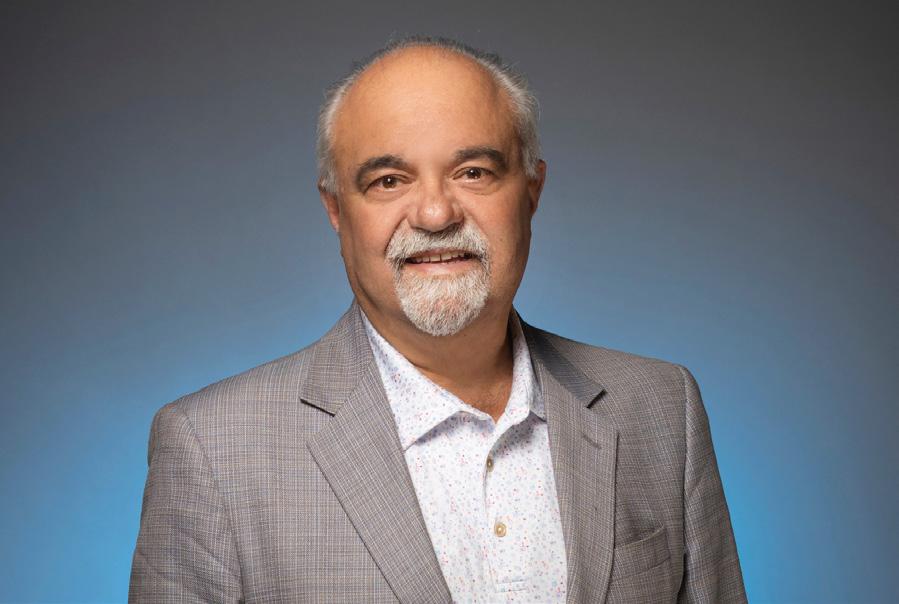

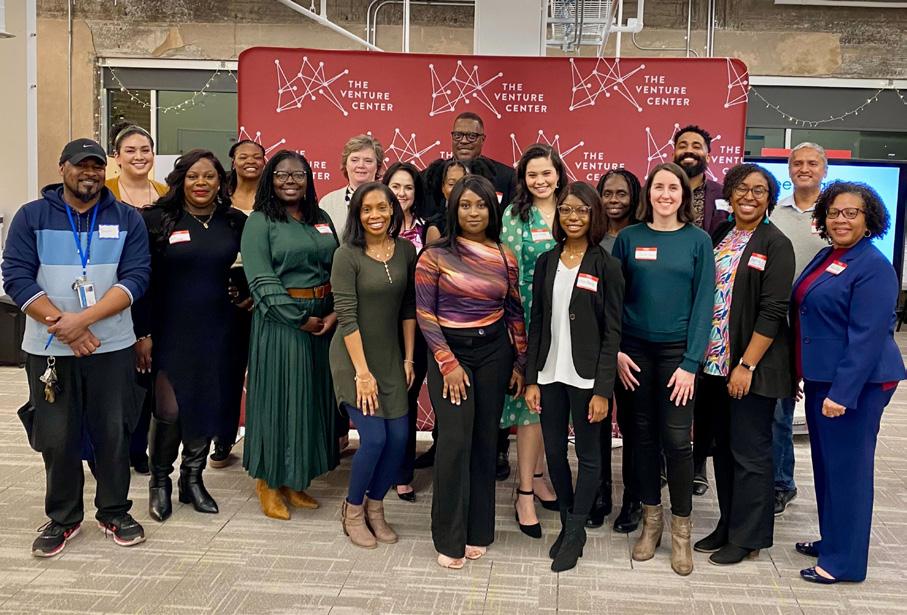
Collaborative for Technological and Innovative

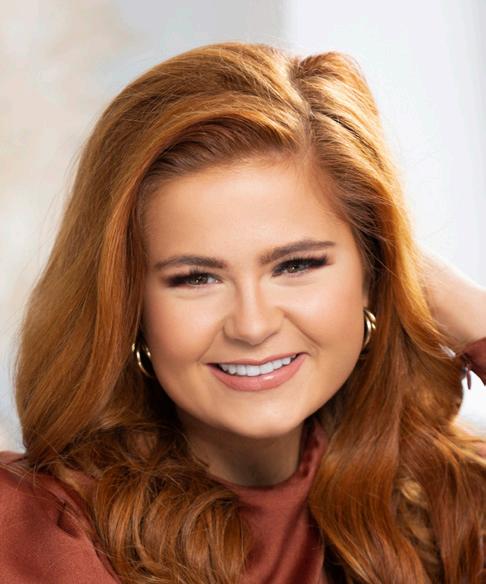
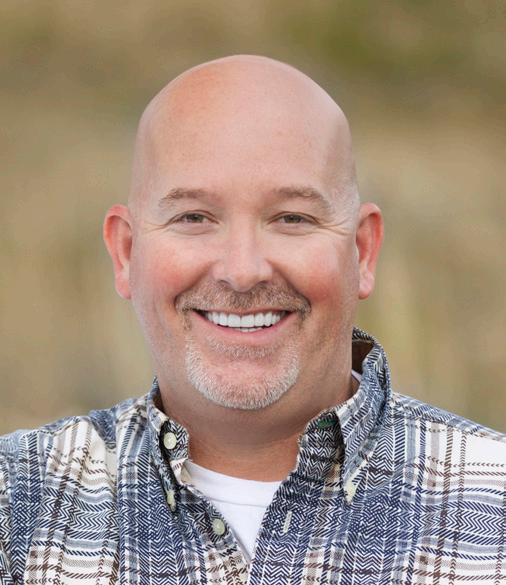



By Mark Carter
The February issue of Arkansas Money & Politics went to press with the state still aglow in the aftermath of the Hogs’ “easier-than-expected” win at Rupp. We hope Ashley Judd, in particular, enjoyed herself. Ironically, the game was dubbed our Super Bowl post-game by various members of Big Blue Nation, we suppose to soften the sting of those big blue tears. This, of course, came after fostering a pregame buildup to rival the Hogs and UNLV at Barnhill in 1991. But it was our “Super Bowl,” they said. (A friendly suggestion, though, from a fan base as passionate and sometimes as nutty as any — if you’re going to accuse opposing players of starting a row with fans, do not post video that clearly proves it was said fans breaking badly.)

Granted, as one of the programs on college basketball’s Mount Rushmore, UK does play with a target on its back, but this one had to sting. The dynamic between UK fans and Coach Cal must rank up there on any list of top “complicated relationships.” By the way, did you know that February big blue tears in Kentucky bring March cardinal-red pawpaw flowers to Arkansas? Keep an eye out next month.
Coming out of Lexington, meanwhile, the Hogs faced yet another top 25 SEC road trip, this time to the land of Woody Harrelson’s “half-brother.” Alright, alright, alright. Whether Cal and crew successfully harnessed
When we were kids (you know, 15 years ago), a school year seemed to last a decade. Now months pass by like 18-wheelers on Interstate 40 — which makes it hard to believe that the February issue of Arkansas Money & Politics is out.
Our cover this month features President Donald Trump’s choice to represent the U.S. in Israel, Mike Huckabee. The former Arkansas governor is not the first member of his family to grace AMP’s cover. His daughter, Gov. Sarah Huckabee Sanders, sat for the cover in 2019, not long after her return to Arkansas from Washington, D.C., where she served in Trump’s first administration.
This being Black History Month, AMP features several Black-owned businesses, and we also honor our
the momentum from one of his most satisfying wins as a coach and took down the walking porterhouse in Austin … well, let’s just suppose they did and a run for March Madness is on. As those pawpaw (early Southern for papaya) flowers bloom from Prescott to Piggott, of course.
All of that, finally, brings this column to its long-awaited point.
Razorback basketball may yet live up to some, most or maybe even all the preseason hype — though getting to seven wins in the SEC this year after a 1-6 start? Yikes. Heading into the UK game, Cal’s highly touted debut season on the Hill had been considered mostly bust. On the gridiron, the Hogs continue to look like that dreaded spinning wheel on our desktops.
As the calendar turned to February, anyway, it appeared Big Hog Nation would once again be looking to Dave Van Horn and staff for solace. The early exits of the last two seasons notwithstanding, the Diamond Hogs are once again a preseason top 10 team and favorite to reach Omaha.
Following AMP ’s two-part visit with DVH, veteran Hog beat-reporter Andrew Hutchinson looks at the 2025 prospects in this issue. Insiders say Van Horn is as excited about the potential of this bunch than he has been in a while. Baseball being baseball, however, Hog fans have learned not to take anything for granted. Could this be the year? Dare we even ask?
Here’s to two specific strains of Razorback — the dancing kind and the Omahogs.
By Heather Baker

Heather Baker
readers’ choices for “Fifty Over 50,” honoring those Arkansas business and political leaders who are still moving and shaking with the best of ‘em. Also inside, readers will find packages devoted to startups and professional associations.
Plus, you will not want to miss our sit-down with David and Alan Bubbas of David’s Burgers fame. Like their burgers? We’re betting you’ll love their steaks. Our executive Q&A features Part 1 of a two-parter with new Little Rock Trojans Athletic Director Frank Cuervo, who dishes on leading a mid-major and the inherent challenges thereof.
As always, thanks for reading. Please hit me up with any comments, questions or story ideas. The days may go by fast, but do not forget to soak in the moments that matter.
By Doug Crise
Say this about David Bazzel — he comes by it honestly.
Bazzel’s father, Harold, was a longtime elected official in Panama City, Florida, primarily serving as the Bay County clerk of court. His mother, Carolyn, was a mainstay as a Sunday school teacher. Life in the Bazzel household, one way or the other, revolved around talking to people.
“I probably still can’t talk as well as my dad and mom,” Bazzel said.
Plenty of people think Bazzel talks just fine. The longtime Little Rock radio host, emcee and media personality was honored earlier this month as the Arkansas Sportscaster of the Year by the National Sports Media Association, highlighting a career that began more than 30 years ago for the former Arkansas Razorbacks football player.
Bazzel’s path really began well before he set foot in Fayetteville. He was raised by extroverts, so watching his mother and father speak was a normal part of his childhood. By the time Bazzel hit Crawford Mosley High School in Panama City, he was just as comfortable speaking to gatherings of the Fellowship of Christian Athletes as he was making tackles on the football field.
“I was comfortable around people,” Bazzel said.
Comfortable enough to leave home. Bazzel was recruited by the likes of Georgia, Florida and Florida State, but even as a 16-year-old Floridian, the Arkansas media already had a hold on him. Razorback fans found his address and sent him clippings of Hogs coverage from both the Arkansas Democrat and the Arkansas Gazette, separate newspapers at the time. The demand for sports coverage in Arkansas seemed unquenchable, and for a teenager already
thinking about a life behind a microphone, the opportunities in the Natural State seemed limitless.
“There was so much coverage,” Bazzel said. “I saw the possibility when I was 16.”
The problem was there was not exactly a major for being a media personality.
“Back when I was going to college in the early ʼ80s, you didn’t have broadcasting degrees,” Bazzel said. “When I came to Fayetteville, I didn’t know what I wanted to do.”
He still was not sure five years after he first arrived. He took a job doing marketing for Gold’s Gym in Little Rock and waited for something to happen. It did, in the form of Arkansas Democrat sports editor Wally Hall, who asked Bazzel to appear on his local television show.
Hall would be the first of many who helped jump-start Bazzel’s career. Shortly after beginning work with Hall, the news director at KARK in Little Rock reached out to Bazzel about becoming a weekend sports anchor.
Bazzel was all in. He was also clueless.
“I had no experience,” Bazzel said. “Nothing. Zero. I didn’t go to school for it.”
By his own admission, he did not set the world on fire.
“I was horrible,” he said.
Bazzel was not a phenom. His talent came to him inch by inch, broadcast by broadcast, but he found his voice in television and started penning a fitness column for what had become the Arkansas Democrat-Gazette Raised to express himself, Bazzel was finding out how to do it. An invitation from Little Rock sports-talk mainstay Randy Rainwater led to his first radio work in the mid 1990s, and more doors opened after he was befriended by state TV personalities Steve Sullivan and the late Paul Eells.
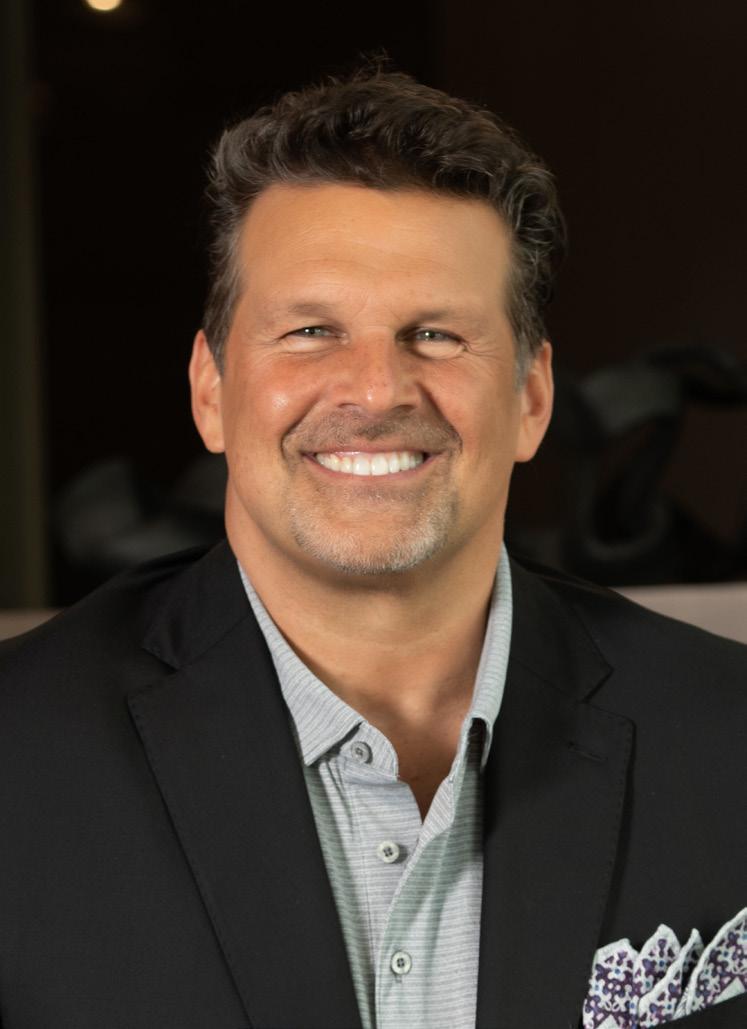
“Compare me to Steve Sullivan and Paul Eells, and I’m not on that level,” Bazzel said. It has been an upward trajectory from there. Today, Bazzel is a host on the Morning Mayhem program at 103.7 the Buzz and is constantly in demand as a public speaker and emcee. Outside of broadcasting, Bazzel is perhaps best known for founding and hosting the Frank Broyles Award, which is given annually to the top assistant coach in college football.
In all, Bazzel estimates he has done 25,000 hours of live radio, completed 3,000 speaking gigs and become a bona fide local celebrity. People who only know Bazzel as a public figure can miss what is underneath the front-and-center personality. Get Bazzel by himself, and find a self-depreciating sense of humor, a deep sense of faith and a wellspring of gratitude for those who helped him get to where he is.
“Wally Hall and Steve Sullivan, those two guys alone have been so impactful,” Bazzel said, “and then I went on the radio and worked with giants like Tommy Smith and Randy Rainwater.”
In many ways, Bazzel is still that college graduate in the mid 1980s who did not have a road map to the life he wanted. He is a household name thanks to the belief of others, and he is equal parts humble and grateful.
“I’ve been milking five years of football for 30 years,” Bazzel said. “This state has been good to me.”
By Todd Shields
Northeast Arkansas is on the threshold of unprecedented economic and industrial growth, and Arkansas State University in Jonesboro is proud to play a key role in driving this transformation. Through advanced research, innovative workforce development programs, and powerful partnerships with industries and communities, A-State helps shape a brighter future for the region and the entire state.
Collaboration is at the heart of that mission. A-State partners with leaders from Craighead County, nearby communities and industries across Arkansas to ensure the region grows stronger. By combining efforts, that collaboration helps workers develop both technical skills, such as operating machinery or using new technology, and soft skills, such as communication and teamwork. It also allows industries to train current employees to stay competitive. The partnerships improve industries, health care systems and the overall quality of life, making northeast Arkansas a better place to live and work while fueling economic growth for everyone in the region.
During A-State’s inaugural Catalyst: NEA Economic Development & Leadership Forum in early January, we emphasized the importance of partnerships in driving economic prosperity. From cutting-edge progress in steel and advanced manufacturing to health care innovation and leadership development, AState brings stakeholders together to tackle challenges and seize opportunities.
In partnership with ASU-Newport and Arkansas Northeastern College in Blytheville, A-State revolutionizes workforce training with initiatives fueled by a $10.5-million grant from Gov. Sarah Huckabee Sanders and the Arkansas Department of Commerce. The programs focus on stacked credentials in advanced automated manufacturing, food processing and steel production, aligning academic offerings with industry needs. The result is a pipeline of skilled workers ready to drive economic vitality across northeast Arkansas and throughout the state.
Modern steel production exemplifies the transformative impact of those collaborations. With Mississippi County established as the steel capital of the U.S., A-State works closely with industry leaders like Big River Steel, Nucor and Lexicon. The Center for Advanced Materials and Steel Manufacturing integrates artificial intelligence and data science into the steel industry, ensuring companies that are already leading the way in innovation and green production remain efficient and maintain global competitiveness for decades to come.
Health care is another critical area where collaboration yields transformative results. A-State, home to Arkansas’s largest undergraduate population of nursing and health professions students,
partners with leading providers such as St. Bernards Healthcare and NEA Baptist Health System to bridge academic training with clinical practice. The efforts address health care challenges while preparing students to meet the region’s growing needs.
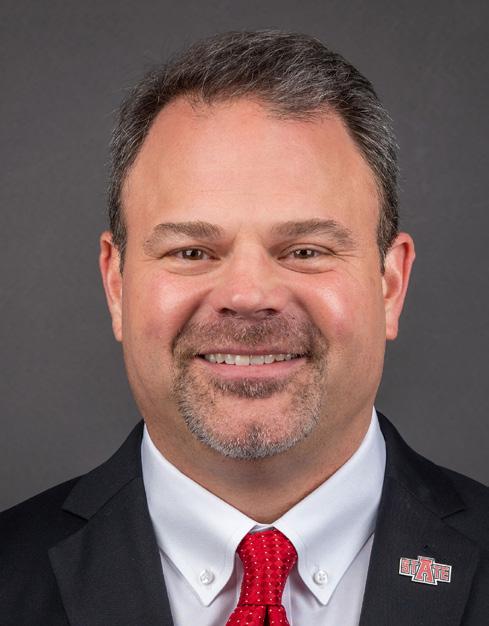
A-State’s partnership with the New York Institute of Technology College of Osteopathic Medicine enhances that impact by offering a seamless path from “freshman to physician” on our Jonesboro campus. These efforts address Arkansas’ physician shortage, particularly in rural areas, and improve health outcomes across the Delta. Looking ahead, the A-State College of Veterinary Medicine, set to open in 2026, will address critical gaps in animal health care, benefiting the agricultural economy and the state as a whole.
Beyond technical skills, A-State focuses on developing leadership, resilience and interpersonal abilities. Programs such as the Women’s Business Leadership Center, Empower the Pack and Brother 2 Brother build mentorship networks that equip students with the skills to excel in a rapidly evolving workplace. A unique partnership with Coursera enhances those efforts by providing tailored training programs related to data analytics, artificial intelligence and leadership while integrating credentials in well-being and emotional intelligence. This ensures that both new graduates and current employees are prepared to lead in dynamic environments.
By working hand in hand with county leaders and industry partners, A-State demonstrates the power of collaboration to drive regional growth. The partnerships strengthen not only the local workforce but also the broader economy, health care systems and quality of life in Arkansas. Together, we are creating a future where industries thrive, communities prosper and northeast Arkansas reaches its full potential.
A-State invites those ready to join the transformative effort to contact my office at catalyst@astate.edu and mark their calendars for the next Catalyst event at the Red Wolf Convention Center and Embassy Suites in Jonesboro Nov. 6. Stakeholders can help turn today’s ideas into tomorrow’s achievements. Together, we can unlock a future of shared success for Arkansas.
Todd Shields is the chancellor of Arkansas State University’s flagship campus in Jonesboro.


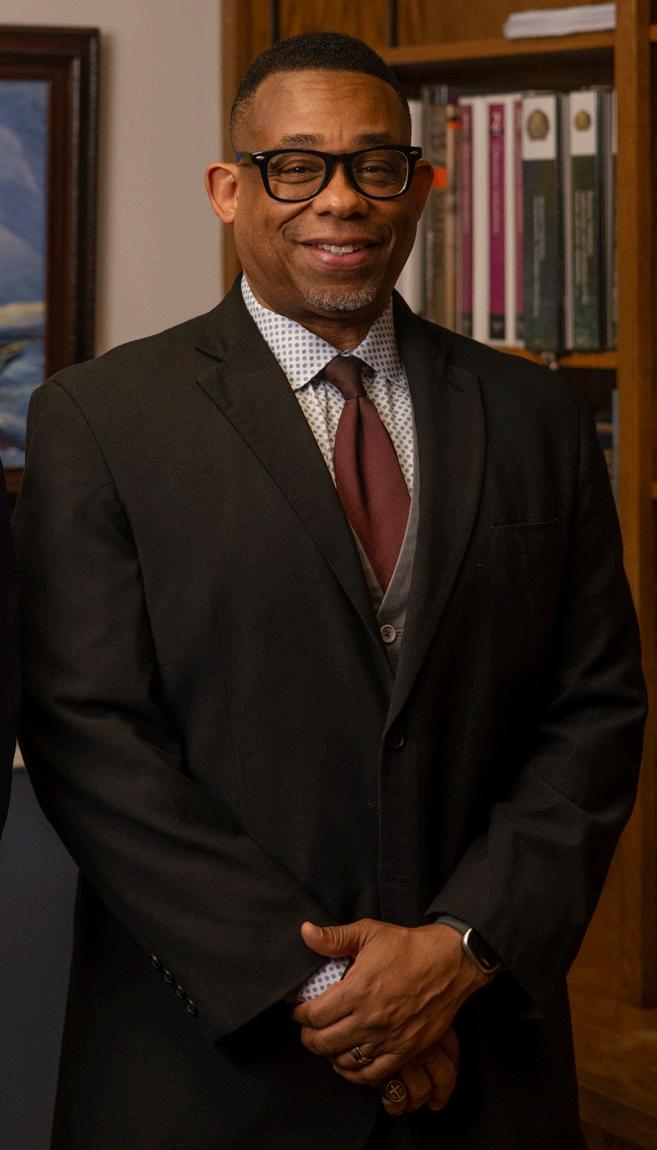





Flynn President



As such spaces go, Mike Huckabee’s home office is a humdinger.
The first room upon entry holds a trove of guitars, bass guitars and miscellaneous stringed instruments that fill half of the room’s available wall surface, many signed in tribute by famous musicians. The instruments hover over a jam space that includes a full drum kit and more than a couple of amps. Another wall is given to bookshelves jammed with various memorabilia, including a dozen photos of Huckabee playing or kibbitzing with bands of various genres.
Beyond that lies the office proper, a space that tells of his other passions — the military, public service, and, most of all, his faith and family. An oversized TV monitor on one side flashes the news of the day, of which he has been central or ancillary for decades. A window behind the desk gives a sprawling view of the grounds outside, welcoming even in winter. His two beloved dogs loll about his feet.
It begs the question, then, after coming through the wars of politics at the state level and on the national stage — with an adoring family nearby and a lucrative career as an author, pundit and opinion-shaper at hand — why he
By Dwain Hebda
accepted a job circulating in one of the most dangerous places on the planet for the next four years. Late last year, Huckabee was tapped by President Donald Trump as the next ambassador to Israel, to serve one of the world’s more complicated regions where conflict is common and peace a fleeting thing.
“I didn’t want a federal job,” he said. “I wasn’t interested in a title. I had a great title. I was governor of Arkansas and I loved it. I was enjoying the private sector. Life was good. Life is good.
“Interestingly, it’s the only thing [Trump] could’ve asked me to do that I would’ve said yes to, really. In his first term, I was asked to do two different cabinet positions and two ambassadorships, and I said no. This was the one thing that he could’ve asked me that I couldn’t say no to.”
Given Huckabee’s background as an ordained minister, it would be easy to chalk up his enthusiasm for Israel as purely evangelical, but such thinking sells both the man and his mission short. Israel itself has never been that one-dimensional, a postwar political state created on Jewish sacred land first described in the Bible and surrounded by regional neighbors ranging from merely tolerant to openly hostile. No mere
man of God would last very long in such an environment, and while Huckabee’s faith is unwavering, it is buttressed by an encyclopedic knowledge of the region, a plainspoken style of statesmanship and, most of all, a reverence for the land itself.
“My first trip to Israel was 1973, 17 years old, a month away from my 18th birthday,” he said. “It was just three months before the Yom Kippur War, but of course, no one knew that was right on the horizon. I fell in love with Israel on that very first trip. I went all over the Middle East. I went to Lebanon and Syria, Jordan, Greece. I can’t even remember all the places — eight or so countries in that trip — but there was something about Israel that was so magnetic to me.”
The allure of the place kept pulling Huckabee back for visits, in times both joyful and tragic, including in the wake of the Oct. 7, 2023, surprise attack by Hamas. The terror group led other fundamentalist Palestinian radicals in an assault, the first invasion of Israel since 1948. The attacks coincided with the Jewish religious holiday, Simchat Torah, dropped thousands of rockets, and resulted in nearly 1,200 Israeli dead, 250 hostages taken and many atrocities committed for good measure.
When Huckabee visited the area following the attacks, what he saw there, he said, was shocking.
“I went over there, just a few weeks after it happened. I was there talking to survivors, families of victims, government officials,” he said. “I was so blown away by the intensity of what [Hamas] did. When people say, ‘Well, they may not have really done that,’ they did; and the reason we know it is because they actually wore GoPro cameras on their helmets and they videotaped it.
“
you know, why don’t you put more pressure on the people who murdered 1,200 civilians? It was very frustrating to sometimes see the Biden administration come out and give lectures to Israel on how they ought to be treating the people in Gaza when the people in Gaza were being treated much more horribly by their own leadership, Hamas.”
As for the argument of protestors, who were never publicly chastised by Biden or vice-president-turned-presidentialcandidate Kamala Harris, even as rhetoric escalated and Jewish students were terrorized, Huckabee merely snorted.
“Most of these kids out screaming ‘from the river to the sea’ couldn’t tell you which river, which sea and what was in between it. They had no idea,” he said. “They’re the most educated idiots, I think, we’ve seen in the past 100 years. It’s really disturbing to me that parents are spending $70,000, $80,000 a year for the little darlings to go to an Ivy League school, and they end up becoming uneducated fools.
My first trip to Israel was 1973, 17 years old, a month away from my 18th birthday. I fell in love with Israel on that very first trip.
“The raping of women in front of their own families. Can you imagine anything more disgusting than that? Burning babies in front of their mothers, beheading babies in front of their parents — things that are the mark of savagery.”
The attack touched off an Israeli response designed to wipe Hamas off the face of the planet, a military effort alternatingly supported and scolded by the Biden administration. It also touched off a rash of protests against Israel in American cities, particularly on college campuses, opening new outlets for antisemitic attitudes while straining U.S.-Israeli relations.
“There were times when the Biden administration was very, very spot-on in their support for Israel, especially in the early days after Oct. 7, and I would commend him for that,” Huckabee said, “but their relationship and their policies overall were schizophrenic. On one day, we’re ironclad. There’s not a bit of daylight between us and Israel. We stand with our ally.
“Then they would come out with an announcement and say, ‘We’re going to withhold arms sales to Israel because we don’t like the way they’re prosecuting the war.’ I’m thinking,
“I don’t care what a person’s political persuasion may be. A nation like Israel has a right to say, ‘We are going to prevent that from ever happening again.’ If [Hamas] would do this, and they did it proudly, and they declared that they would do it again and again and again, then eradicating them is the only option.”
During the interview for this article and others, Huckabee did not dilute his strong language concerning Israel, its enemies or any other conservative topic, for that matter. He did it having yet to be confirmed, at this writing, so convicted is he of the imperative of standing up for the principles he sees as fundamentally American, be they played out at home or overseas, defending one of the U.S.’s few stanchion allies in a volatile region of the world.
“We had government officials who empowered Hamas, Hezbollah and the Houthis by letting the pressure off of the Iranians, which, to me, is the big policy disaster of the Biden administration,” he said. “When Trump was in office before, he had applied maximum pressure to Iran, and he put that pressure on them in such a way that they were just about bankrupt from not being able to sell their oil to any country that wanted to do business with us. It put them in a position where their government was on the verge of collapse. They couldn’t fund their nuclear deal. They couldn’t fund Hamas, Hezbollah, the Houthis or any other of their proxies.
“Day one, Biden comes in, relaxes the sanctions that immediately releases billions of dollars into the hands of the Iranians. What did they do with it? Did they build schools,
hospitals, roads? No, they funded terrorism across the world. In September [2024], I was back in Israel on the northern border at Lebanon and walked through communities that had been deserted because the rocket fire was so intense everyone had to move out. Who paid for those rockets? The Iranians; but again, we put more pressure on Israel than we have Iran. Why? Makes no sense. We should have made it very clear: Not only are we going to put the sanctions back on, but [Iran is] going to pay a heavy price for having funded these acts of terrorism.”
Huckabee’s assessment of the region and its recent problems echoes that of Ronald Reagan, who has his own dedicated spot on the office wall. Like Reagan, Huckabee’s career has been built on inviolate principles funneled through homespun rhetoric that engages people, even when talking line-in-the-sand issues. His attributes — a mix of Godgiven communicative ability, instinct and conservative beliefs shaped and hardened on the anvil of politics — are woven from fibers of character both inherently likable and showing an appetite for the righteous fight.
Huckabee has been a longtime supporter of Israel and has made multiple trips to the Holy Land. (YouTube)

He entered the political arena with a stumble, losing a bid for U.S. Senate in 1992 to incumbent Dale Bumpers. That same election cycle would send Gov. Bill Clinton to the White House, elevate Arkansas Lt. Gov. Jim Guy Tucker to the state’s top spot and create a special election in summer 1993 for the lieutenant governor’s job. Huckabee ran and won with 51 percent of the vote, then cruised to reelection in 1994. He was only the second Republican since Reconstruction to hold the office.
The next few years would be eventful ones, starting with the late U.S. Sen. David Pryor announcing his retirement in 1995. Huckabee announced he was running to fill the seat and then switched gears after Tucker was convicted of fraud and conspiracy in May 1996, prompting him to announce his impending resignation. Huckabee said he would drop out of the Senate race and step in to serve the remainder of the governor’s term. Tucker would make one last-ditch play to remain in office, but the looming threat of formal impeachment cooled the effort, and Huckabee was sworn in as governor that July.
He won reelection to full terms in 1998 and 2002, making his total tenure the third-longest in Arkansas history and, despite being succeeded in the governor’s office by Democrat
Mike Beebe, sowed the seeds of political upheaval in the process. After decades of Democrats’ stranglehold on power, Republicans threw the political apparatchik on its back within a few election cycles and today hold a super majority in both houses of the state legislature and a clean sweep of constitutional offices at the state and federal levels.
Huckabee launched a media career in 2008, first as a Fox political contributor and via The Huckabee Report political commentary program, replaced later by a weekend show, Huckabee, now carried by Trinity Broadcasting Network. He has also authored numerous books.
In 2022, he watched his daughter, Sarah Huckabee Sanders, be elected the state’s first female governor, the youngest governor in the country at that time, and became one half of a rare club of governors whose daughters have also held gubernatorial office.
He has two presidential campaigns to his credit, in 2008 and 2016, during the latter of which he endorsed eventual winner Donald Trump. Of the once and future president, Huckabee said he admired the polarizing New York businessman from the first.
“I’ve said all along, look, you may dislike Donald Trump’s personality. I personally appreciate it because it’s honest and transparent,” he said. “I’d rather have a guy tell me what he thinks than pretend that he or she is something and be not what they present. When I was a pastor, the thing that really frustrated me most is when people in my presence would sud-
denly say, ‘Oh I was just praying about that.’ I don’t want to hear all that nonsense. Be who you are. If you’re a foul-mouthed person, you know what? I can handle that. I’m not a prude. Be who you are, and say what you feel. I’m OK with that.
“The thing I’ve loved about Trump is authenticity. It’s refreshing. Most everybody who runs for office learns to be careful. Trump never learned to be careful. I’ve told people, ‘You say you hate Trump because you’ve never been around him.’ If you’re in the room with him, he’s hilariously funny. He has a great sense of humor. He’s also a phenomenal listener. He engages in the conversation, but he wants people in that room to converse with each other. He doesn’t dominate it.”
Were he to be confirmed, and Huckabee was careful to underscore that has not yet happened, he said he is eager to be a part of what he sees as a righting of the American reputation in the world.
“ing business in the U.K., so he’s well familiar with that. He’s not going have to get out a tourist map to find his way around. He’ll know the landscape quite well. He’ll make us proud — not just us, Arkansas, proud. He’ll make America proud.”
As for himself, Huckabee plans to keep things simple should he be confirmed — or as simple and reductive as one can be in a spot on the globe as complicated at the Middle East. He said there is more to the place than just war and conflict and that another reason for standing with Israel is the innovation and development that flourishes there, even though American headlines rarely acknowledge it.
An ambassador’s job is not to go and impose his or her policy. It’s to carry the policy of the president who made the appointment.
“An ambassador’s job is not to go and impose his or her policy. It’s to carry the policy of the president who made the appointment,” he said. “You are the president’s official representative to that country, to their government. Your job is to be the liaison between the United States and our leadership and the government of the host country. That would mean, obviously, building relationships with the prime minister, with whom I’ve had a relationship for over 30 years, so that’s comfortable.
“I know the speaker of the Knesset. I know the foreign minister. I know dozens of members of the Knesset personally. Many of the cabinet ministers in Israel I’ve known because I’ve been going over there for 52 years. It’s not an area that I’m going to have to go in and look around and say, ‘My gosh, where am I?’ I’ll know my way around both geographically but also in terms of the people. That is, obviously, a big plus, but it’s not my job to go and tell them what I think. It’s my job to carry the policy of the president, the secretary of state and the Congress and to relate that to the host government.”
Huckabee’s nomination is one of three major roles in the Trump administration in which nominees have Arkansas ties. Warren Stephens, second-generation leader of investment bank Stephens, has been nominated for the plum U.S. ambassador to the United Kingdom post, and Dr. Janette Nesheiwat, who completed her medical residency at the University of Arkansas for Medical Sciences in Little Rock, has been nominated for U.S. surgeon general. Huckabee said for the state to have played a role in producing three individuals deemed worthy for such important jobs speaks well of Arkansas.
“I’m so proud, especially of Warren Stevens. That’s a big deal,” he said. “That’s a huge thing, and he’s perfect for it. He’s been do-
“Over these 52 years, I’ve seen the desert bloom. I’ve seen the dry bones come to life, biblical prophecy before my eyes in ways that are so stark,” he said. “I’ve told people, I haven’t just read those scriptures; I’ve watched them. I’ve watched areas that used to be just dust and rock that are now lush, producing vegetation, fruits and vegetables being shipped all over the world. The Israelis have built an incredible nation there. People have no idea they’re one of the most prolific technology centers in the world. They have 0.18 percent of the world’s population and 30 to 40 percent of Nobel Prizes in fields related to science, medicine and technology.
“A lot of the medical procedures we take for granted here in the U.S. were actually developed in Israel. We wouldn’t have cell phones without Israel. They created the SIM card. We wouldn’t have the heart stent or the camera that you swallow and it lets the doctor look at your insides. Nobody has done more in hydrology, the use of water, how to get the most use of it, desalinization plants. When I first went there, it was a thirsty country, and they learned how to maximize every drop of water to the point places that were total desert are now some of the most productive farmland in the world.”
As for what lies on the other side of this adventure, Huckabee can only guess. Time waits for no one, and while he casts a youthful energy, he knows such adventures increasingly belong to those younger than he. Perhaps that was what shone most brightly in his tone as he discussed the opportunity that lies before him in the next four years, God and Senate willing — one last campaign in a part of the world far removed by distance but close to his heart and mind.
“It is so very powerful, the impact that Israel has had on me,” he said. “The only way I can describe it is it’s like being at home in a place I’d never been. I don’t understand how to explain that, but I just feel like I belong there. You know, this is something special.”
t has been said that mere longevity is its own reward and while that may be true, a healthy dose of success and wisdom gained through the years is nice, too. With advancements in health care and changing societal attitudes towards age and vitality, many people once thought to be rounding the corner toward retirement are now just hitting their strides in the worlds of business, public service and nonprofits. In recognition of this fact, Arkansas Money & Politics is proud to once again recognize these time-tested achievers with our annual Fifty Over 50 list. Nominated from the field, these outstanding men and women represent a vast range of industries and backgrounds, yet all share the same fundamental attitude in common: that age is only a number. AMP salutes all of this year’s outstanding 2025 Fifty over 50 honorees.

Tom Allen leads Cushman & Wakefield | Sage Partners as partner and president of the firm, which has offices in central and northwest Arkansas. He works with corporate, private and public clients in many phases of the commercial real estate industry and is the exclusive broker for the Hunt Ventures commercial real estate portfolio in northwest Arkansas. Allen is responsible for the development, leasing, sales, acquisition and management of all Hunt Ventures office and retail properties. Allen began his commercial real estate career in 1998 as a real estate manager at Walmart, where he led a team to identify new sites for Walmart Supercenters, Sam’s Clubs and Neighborhood Markets. In addition, he gained invaluable experience selling outlots, leasing, subleasing and selling vacant big-box stores for Walmart and Sam’s Club. He joined Hunt Ventures in 2006 and was instrumental in negotiating the merger of the asset services division of Hunt Ventures with Sage Partners and Capital Properties in 2016.

Dr. Bryan Austin is owner and partner at Austin Family Dentistry. He practices at the Maumelle location. He graduated from Magnolia High School. An interest in biology and chemistry led him to pursue health care, and he settled on dentistry after talking to his family physician and dentist. He received his undergraduate degree at the University of Central Arkansas in Conway and obtained his Doctor of Dental Surgery degree at Baylor College of Dentistry in Texas. He started Austin Family Dentistry more than 30 years ago and has since built a reputation for high-quality dentistry, patient satisfaction and a comprehensive range of treatments. He belongs to the American Dental Association, the Academy of General Dentistry, Central District Dental Society, Pulaski Dental Learning Society, the Dental Organization for Conscious Sedation and the International Academy of Facial Aesthetics.

Rod Bigelow is executive director and chief diversity and inclusion officer at Crystal Bridges Museum of American Art and the Momentary in Bentonville. He was recruited to Crystal Bridges as deputy director of operations and administration in 2010 and was named executive director in 2013. He previously worked at Tacoma Art Museum in Washington, the Art Institute of Seattle and the Toledo Museum of Art in Ohio prior to joining Crystal Bridges, which opened in 2011, and the Momentary, which opened in 2020. He entered the art museum field almost accidentally. A native of Washington state, he went to college intending to become a marine biologist before switching to business. After earning a master’s degree, he joined a telecommunications firm, but with a long commute and new baby at home, he joined an art museum as an accountant so he could spend more time with his family.
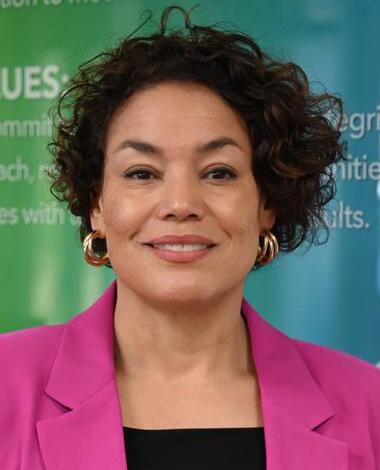
Jean Block, CEO of the Little Rock Water Reclamation Authority, stands out as a trailblazer in her field. Hired in August 2023, she is the sixth CEO in the utility’s history and the first woman in this position. With 11 years of experience at LRWRA, including four years on the Little Rock Water Reclamation Commission (formerly the Sanitary Sewer Committee), and more than seven years as the chief legal officer at the utility, Block has a proven track record of leadership. Prior to her tenure at LRWRA, she served as chief legal counsel for the Arkansas Scholarship Lottery and as an assistant attorney general in the Arkansas attorney general’s office. Block has a bachelor’s degree from the University of California, Berkeley, and a law degree from the University of Kansas School of Law.
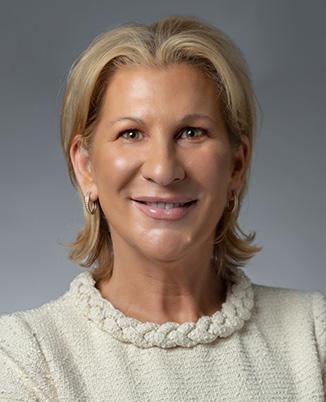
Mellie Boagni currently serves as the CEO, president and founder of the Arkansas Rural Health Partnership; as regional director of strategy, management and administration at the University of Arkansas for Medical Sciences; and as executive director of the Rural Health Association of Arkansas. She has more than 26 years of experience in rural health strategic planning, grant writing and program development. Boagni founded the Arkansas Rural Health Partnership organization in 2008. It began with five critical-access hospitals and has grown its membership to 19 rural hospitals, four FQHCs, more than 100 clinics and three medical schools serving rural Arkansas residents. Boagni has obtained more than $76 million in grant funds for Arkansas Rural Health Partnership to implement federal and state grants to provide health care provider training opportunities, health care workforce initiatives, telehealth expansion, SDOH initiatives, chronic disease programs, behavioral and mental health services, as well as improved access to care throughout rural Arkansas.
Rob Brothers is the co-founder and CEO of TekTrendz, a managed information technol ogy service provider in Bentonville estab lished in 2007 with business partner Sam Bridges. Together, they deliver innovative IT management solutions with a strong focus on enterprise-grade cybersecurity, proactive maintenance and 24/7 monitoring, helping small and medium-sized businesses stay secure and efficient. Brothers grew up in Rogers and was guided by values instilled by his parents to work hard and do what is right. He earned a degree in computer infor mation systems and quantitative analysis from the University of Arkan sas in Fayetteville before beginning a career in the transportation and logistics industry, where he supported complex information systems and gained hands-on IT management experience. A dedicated com munity member, he also serves on nonprofit boards and volunteers at his church.
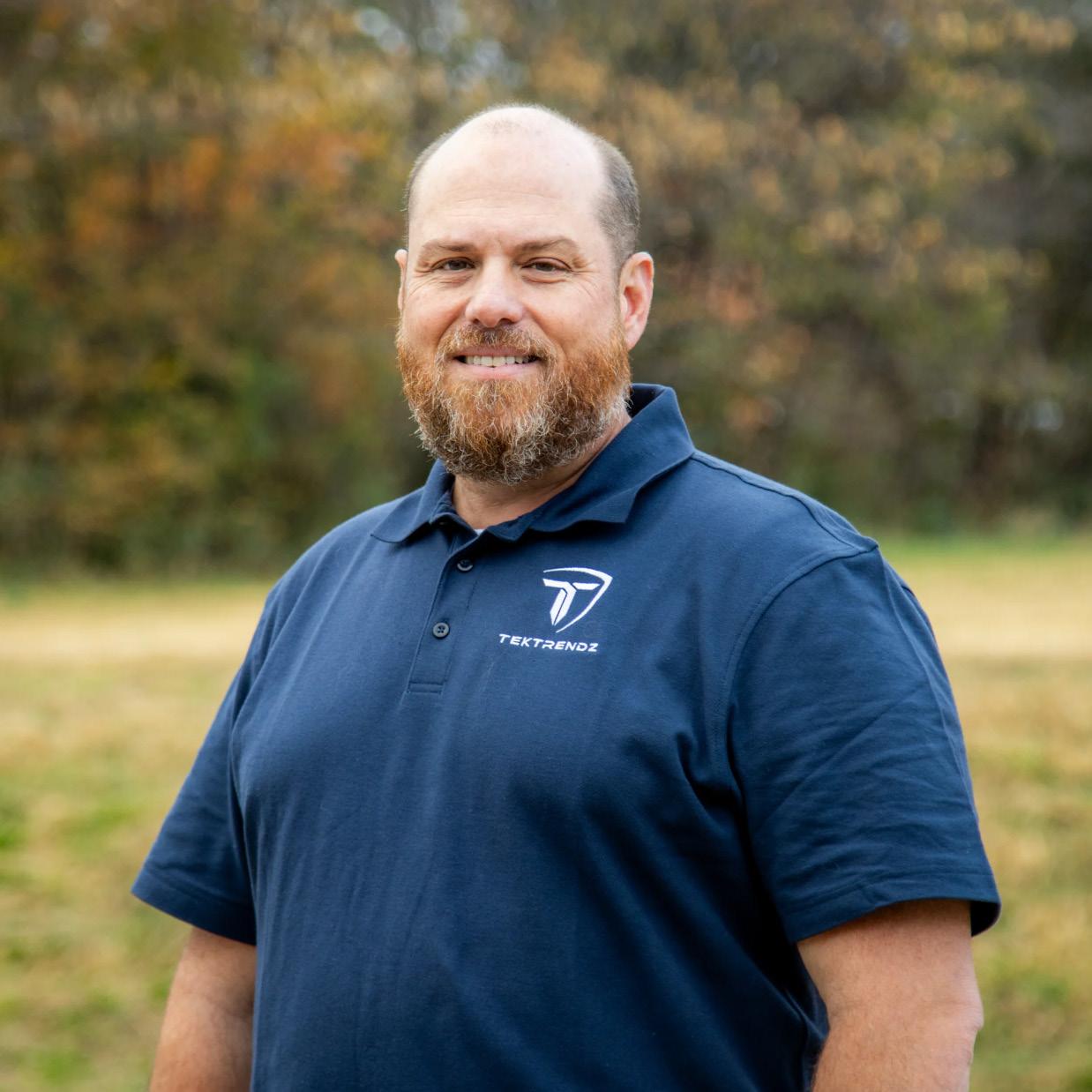
▶ Ashley County Medical Center
▶ Baptist Health – Drew County
▶ Baptist Health – Heber Springs
▶ Baptist Health – Stuttgart
▶ Bradley County Medical Center
▶ Chicot Memorial Medical Center
▶ Dallas County Medical Center
▶ Delta Memorial Hospital
▶ DeWitt Hospital and Nursing Home
▶ East Arkansas Family Health Center
▶ Forrest City Medical Center
▶ Jefferson Regional
▶ Magnolia Regional Medical Center
▶ Mainline Health Systems, Inc.
▶ McGehee Hospital
▶ Mid-Delta Health Systems, Inc.
▶ Olly Neal Community Health Center
▶ Ouachita County Medical Center
▶ Progressive Health of Helena
▶ Sevier County Medical Center
▶ South Arkansas Regional Hospital
▶ White River Health – Batesville
▶ Arkansas College of Osteopathic Medicine

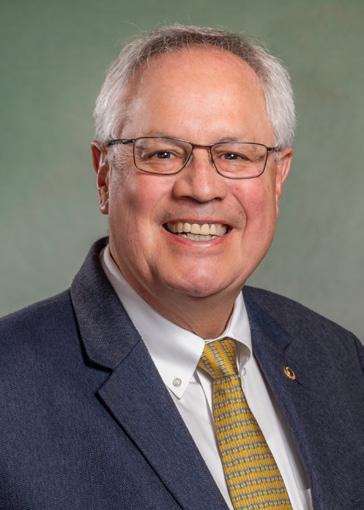
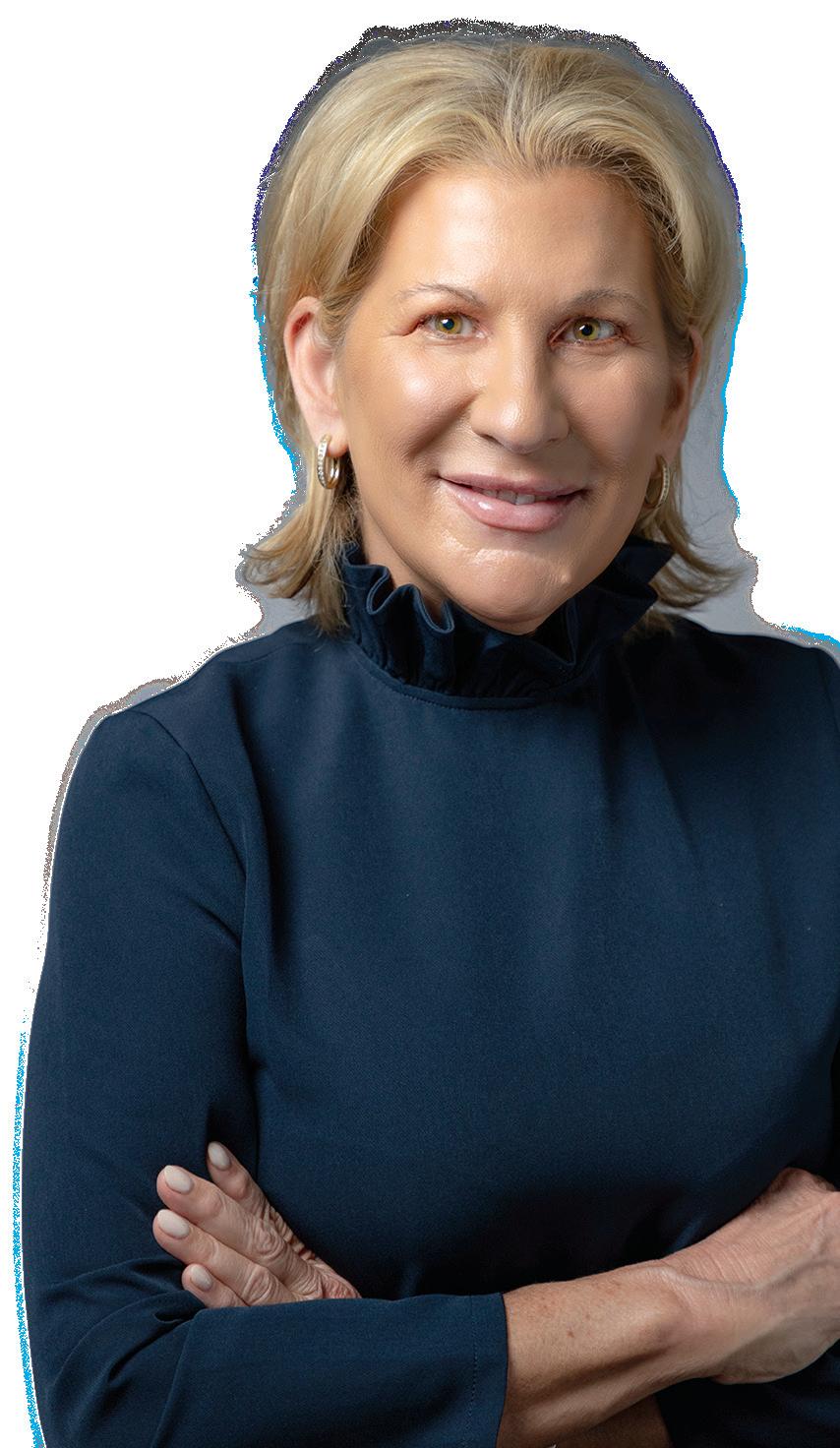

Growth is how Rod Bigelow would characterize his 14 years at Crystal Bridges Museum of American Art in Bentonville. As the executive director and chief diversity and inclusion officer, he has been afforded a front-row seat to the growth the campus has seen and the impact the museum has made on its community and patrons.
Bigelow set out in his career to be a biologist but ultimately switched paths to a business degree, which he received from Pacific Lutheran University in Washington. He later returned to earn his Master of Business Administration from the same institution.
His time at museums includes working in various capacities at the Art Institute of Seattle, the Tacoma Art Museum in Washington and the Toledo Museum of Art in Ohio, where he spearheaded a building project.
“The opportunity to help build a new building for that institution really got me excited about the work in building institutions and physical spaces and communities around the arts,” he said.
From Toledo, he was recruited to Crystal Bridges in 2010 and has worked there since.
Outside of Crystal Bridges, Bigelow is a member of various organizations and boards, including the Art Bridges Foundation Board, Triple Aught Foundation and America250.
By Alex Hardgrave
through its school tour program. Though the institution has grown quickly, the help of staff, volunteers, donors and partnerships has allowed it to grow sustainably.
“The combination of people and resources has really helped us grow,” he said.
The campus has continued to expand with the inclusion of the Momentary in Bentonville in 2020 and the addition of the Frank Lloyd Wright Bachman-Wilson House on campus. Later this year, the Heartland Whole Health Institute and Alice L. Walton School of Medicine will open their doors, sharing space on the 130 acresplus of land around the art museum.
“The medical school is another space to really engage with students and faculty with that integration of art,” Bigelow said. “It embraces the idea of that interface between health and wellness and art and the architecture [that] is also amazing, as well, so it continues that dialogue.”
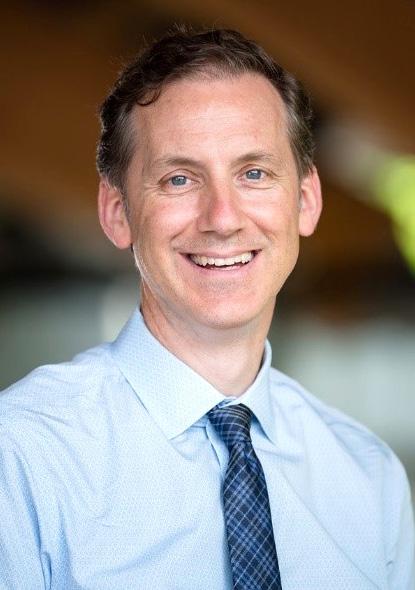
Bigelow said having come from a different state has allowed him to really take in the generosity of Arkansas and the feeling Crystal Bridges brings to the community. During his time there, he said he has been most proud of seeing the pride Arkansans take in the growth of Crystal Bridges and the state as a whole.
Since its opening, around 13 million guests have visited, and no one has paid to get in, thanks to an endowment from Walmart. That access, Bigelow said, sets the museum apart and has taught him his biggest lesson in his time there.
“The transformative power of art is incredible, but unless you are doing that with a community and community members see value in it and have easy access to it, you’re missing everything,” he said.
Along with that are the 60,000 students the museum welcomed last year
The faculty and staff at the medical school will collaborate with the museum so that art is integrated into the curriculum. The students will also participate in building museum programming and work as guides, Bigelow said.
He said he hopes the new additions will bring visitors to explore the trail system that connects the buildings, all while experiencing the integration of art and nature offered there.
The museum itself is also going through an expansion that will broaden its footprint by 50 percent. Bigelow said the new gallery space being added will focus on building indigenous artists’ presence in the collection and telling more American stories.
A learning and engagement space as large as five tennis courts will occupy another level.
In the engagement space, there will be workshops, a ceramics studio, a digital lab, additional classroom space and more. Another bridge being built will create more outdoor space to serve as a gathering area for the community and will even feature a splash pad.
“Museums usually don’t do those kinds of things, but we think of ourselves as being a community center as much as a museum, and so we hope that kids and families will come and play in that space much of the year,” he said.
As he continues his work, Bigelow said he hopes the impact of the museum grows even more. He wants people from all corners of the world to experience everything the campus offers.
“I think we will see people coming because this is a place where people want to come and learn about American art, American history and ourselves,” he said. “Most people come to the museum because they want to find spaces to connect with each other, and that’s what we want to do through and through.”

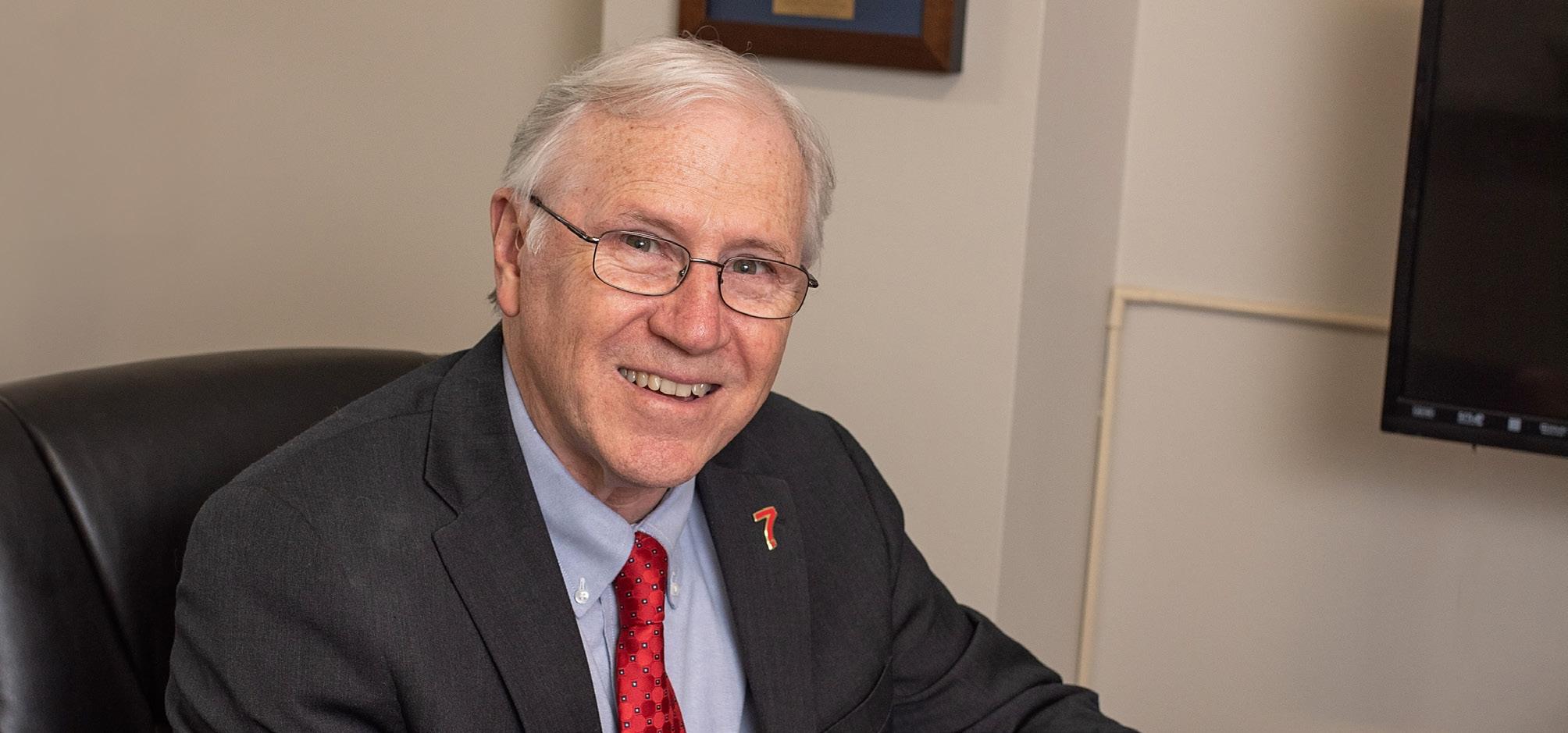

Jean Block is not going through the motions.
It was a clear, sunny morning at Little Rock’s Fourche Creek Water Reclamation Facility, and Block was in her element. She was seated in a bare-bones conference room and had not leaned into the back of her chair once. Block was talking about her first 18 months as CEO of the Little Rock Water Reclamation Authority, about goals already accomplished and what is on the docket for 2025. She spoke with passion, words tumbling out, her eyes bright with excitement.
“It’s a wonderful job,” Block said. “I get to tell the story of something that really sells itself.”
Block is still basking in the buzz of a just completed outside study that determined the LRWRA has had an economic impact of $2.55 billion in the central Arkansas region. Of that, $1.3 billion went to the local economy in the form of jobs, payroll, infrastructure and operations.
“When we started this, I really had no idea what would come back,” Block said. “It kind of stops you in your tracks.”
Block has not stopped for much over the past 18 months. The LRWRA consists of 225 employees who monitor more than 1,400 miles of sewer pipeline, and that is only part of the job. There are roughly 70,500 homes and businesses under the LRWRA’s purview, and every drop of water that leaves those homes and businesses becomes its responsibility.
“Once we treat that used water, we send it out into the Arkansas River,” Block said, “and it’s multiple times cleaner than the river water.”
While Block enjoys the scientific aspect of what she does, she takes particular relish in the community outreach portion of her position. Block oversees a number of initiatives, including a “Can the Grease” campaign that distributes free containers for used cooking oil to area residents. She is also promoting Project RENEW, an ongoing multiyear initiative to replace defaulted and aging pipelines in Little Rock’s sewer system.
Block’s agenda also includes an investment in youth. The LRWRA already reaches out to kids as part of their “Don’t Flush That” campaign to educate water users about how to avoid sewage backups, but she sees a bigger picture — a chance to go to area schools and colleges to find the next generation of LRWRA employees.
“When we’re in colleges and high schools, we’ll talk about if you’re interested in a career in engineering,” Block said. “Think about us. There’s engi -
neering. There’s accounting. There’s all sorts of careers.”
Looking back on the past year, Block said she is especially proud of seeing through the end of a 20-year process that began in the early 2000s, when the city came under fire for malfunctioning sewers.
“There were 339 locations across the city where sewer water was overflowing into the streets,” Block said.
By Doug Crise
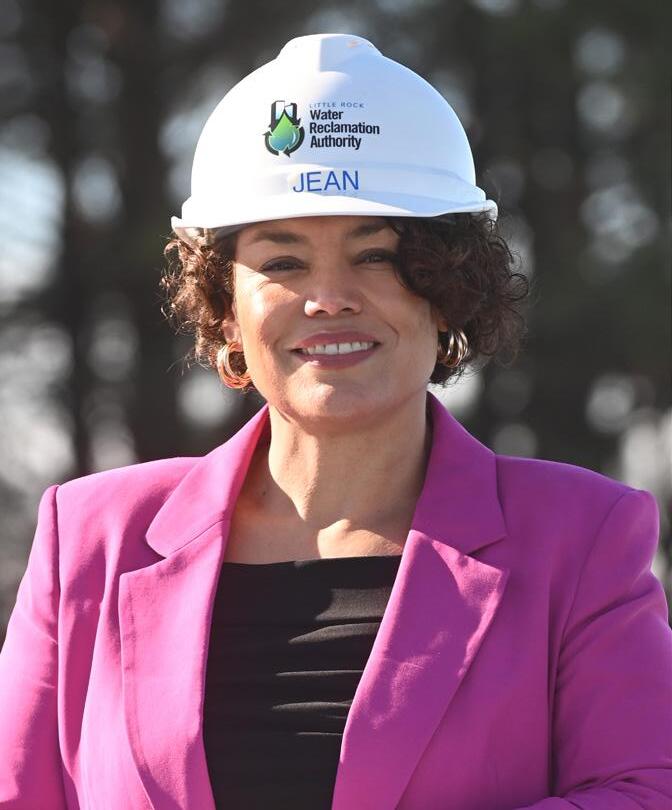
The crisis resulted in a lawsuit from the Sierra Club and a mandate to have the issue fixed by the end of 2023. The LRWRA built 75-million-gallon storage tanks to collect rainwater and repaired and replaced leaky pipes that were stressed during rainfalls. It was a long process, one that began before Block took over and one that was completed under her watch.
“It was a massive achievement for the utility and also for the city of Little Rock,” Block said. “We owed it to the residents of Little Rock to get that under control, but the work never stops.”
There is more on Block’s plate for 2025. She is taking a hard look at what she calls “vertical assets” — the LRWRA’s 34 pump stations and three water reclamation facilities.
“Our oldest one was built in the early ‘60s,” Block said. “Our second-oldest was built in the early ‘80s. Even the newest one is 15 years old, and you’re dealing with used water that can be highly corrosive. That really speeds up the aging process.”
She is aware that utility rates are a touchy subject. Neither residents nor business owners want to see their bills go up, especially without explanation. Block knows this and has already been making presentations to city leaders and citizens about the study. There is no guarantee that rates will go up, but if they do, Block said she does not want it to be a surprise.
“It does become paramount to me to really tell the story,” Block said. “I understand the financial pressures on every household. I’m sensitive to that. If a rate increase is needed, it’s really about how it will be used and the ‘why’ behind it.”
Block is not about to shy away from telling the story of the LRWRA as she looks ahead.
“I have a job that I love,” Block said. “I really do enjoy getting to tell the story of this real vital piece of the city of Little Rock. People don’t think about it, but growth and economic development doesn’t happen without us.”



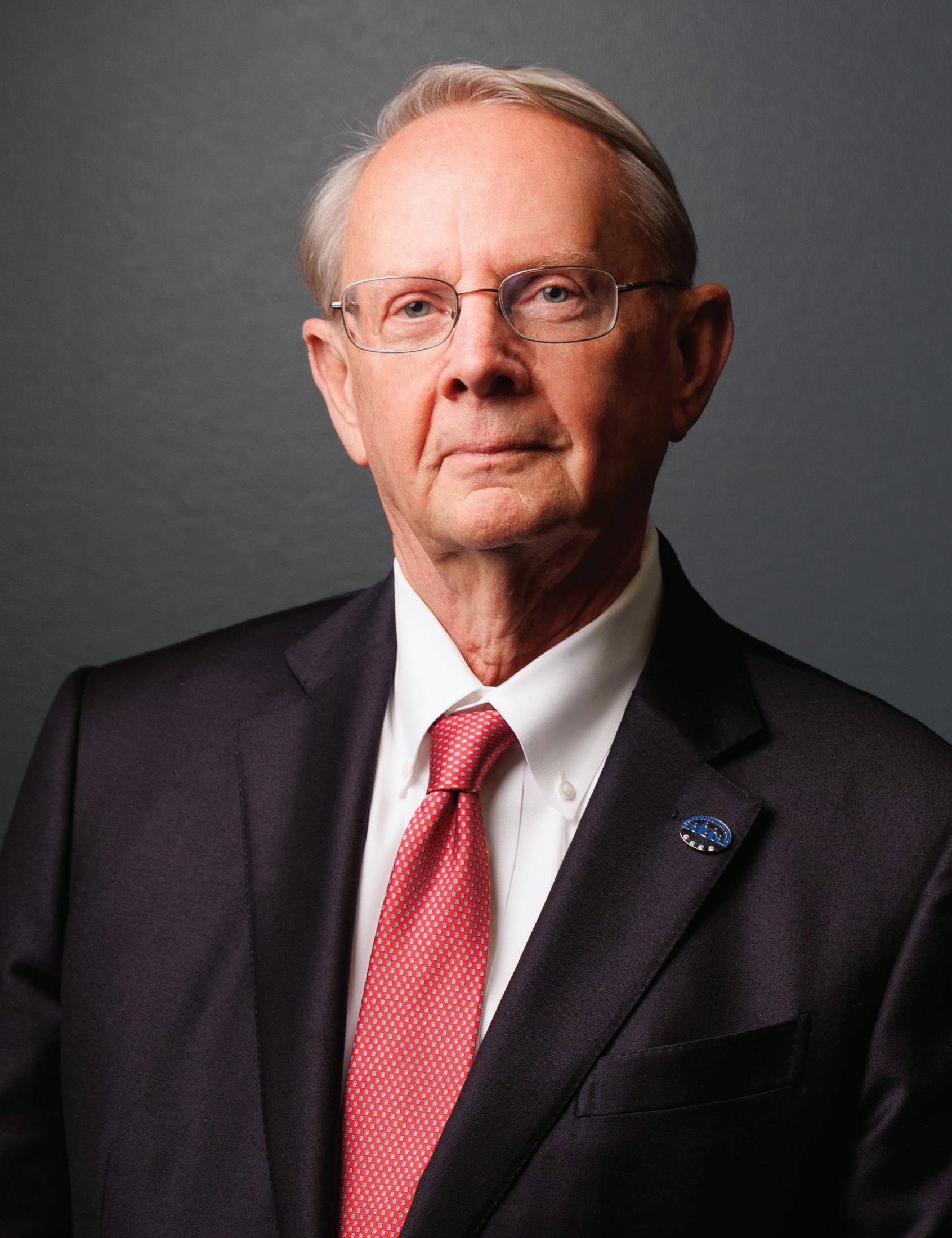

By Dwain Hebda
Asked what led him to a career in law, Charles Darwin “Skip” Davidson replied with a unique brand of pragmatism and quick wit.
“In rural Arkansas, where I grew up, you either owned land or knew how to repair a tractor. I didn’t qualify for either of those,” he said. “I also learned at an early age that I can’t dance and I can’t sing, but I can organize the party and I can clean up the mess.”
Davidson also learned the value of hard work and determination, which the native of Lake Village toted with him to the University of Arkansas in Fayetteville, where he also attended law school. While there, he joined the U.S. Army ROTC in 1968, balancing academics with a commitment to service and leadership.
Fresh out of law school, Davidson founded Davidson Law Firm in Little Rock, realizing his vision of working for himself and creating opportunities for future generations. He discovered the same work habits taught during his youth were of equal importance as an entrepreneur.
“From my small-town upbringing, I learned that you have to show up and work hard. You had to be consistent,” he said. “You have to adapt, improvise and overcome challenges.”
After more than a half-century in practice, there is lots that Davidson can point to that has changed in the legal field.
“The biggest change in the practice of law has been the internet,” he said. “The internet provides quick information and allows mass communication at the click of a button. Instant communication is documented in real time, and the internet speeds up communication, which speeds up transactions and speeds up litigation.
“I was slow to adapt, but when I broke my leg and was forced to work from home for six weeks, I learned to like email. Now I am on the computer most of the workday.”
Davidson’s reticence to join the dot-com revolution may be a byproduct of getting older, but there are a lot of advantages to having been around as long as he has, too, having learned from the process of trying hundreds of cases.
“Age and experience provide a wealth of wisdom,” he said. “Age and experience allow you to see into the future from your knowledge of the past. It allows you to anticipate how to prepare and avoid prob-
lems in the future and to take advantage of opportunities that you know are going to develop. Such are the invaluable connections I have made over the years.”
Davidson’s Little Rock firm handles a variety of legal work, including corporate law, construction law, estate planning, divorce and family law, business transactions, real estate, and other areas.

When he is not in the courtroom or the office, he embraces life as a farmer and cattle rancher, finding balance in the fields of central Arkansas.
“Ranching and working cows and horse competitions gives me a break from the office because you have to focus on the horse and cattle,” he said. “I am a better lawyer on Monday when I return from a weekend working cattle or competing at a horse show.”
When it comes to what has remained consistent over five decades of being a business owner and practicing law, Davidson said it all boils down to the fundamentals.
“The principles of law practice that have been constant over the years have been working hard, working smart and figuring out a strategy to be successful in every transaction and every lawsuit,” he said. “This has been accomplished by applying a mix of common sense, being fair but firm, and managing the client’s expectations.
Davidson also cited the value of continuous learning as one of his secrets to longevity.
“Studying the law every day allows me to know the latest legal developments. That has kept me a legal Sherpa, so to speak, guiding clients to the mountain top,” he said.
Whether strategizing a case or tending his herd, Davidson remains committed to building a legacy defined by hard work and integrity with one eye on the future.
“My professional accomplishments would be decades of successful law practice and helping clients with proven results in transactions and litigation,” he said. “I have represented clients and their families over many years through opportunities and challenges in business and in life.
“Without question, my greatest achievement would be my family, extended family, strong friendships, and the financial ability to enjoy a cattle ranch and still leave something for others.”

Congratulations to our Founder and Principal Consultant DOUG ELMS for being named in AMP’s 50 over 50.
Doug founded SafeHaven Security Group in 2016 and it has grown to become the go-to partner for clients across North America to make their people feel safer and better protected than ever. SafeHaven is sought-after as a trusted partner for security and threat management due to their decades of experience in military, law enforcement, and corporate security.
SafeHaven Security Group is trusted by some of the world’s most at-risk clients to protect their people and their brands.



Celebrating Excellence: KALENE GRIF F ITH Named to AMPS Fifty Over 50!
For 20 years, Kalene Griffith has led Visit Bentonville with boundless enthusiasm and vision, sharing the magic of our community with the world. As President and CEO, her dedication to showcasing Bentonville’s unique charm has helped transform our city into a must-visit destination.
Congratulations, Kalene, on this well-deserved recognition! Your passion for Bentonville continues to inspire us all.
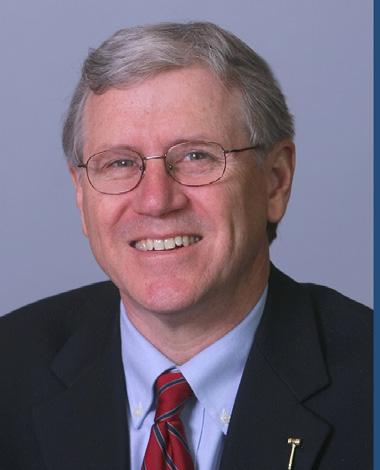
Representing injured individuals with expertise and compassion for nearly a quarter century, Paul Byrd, managing member at Paul Byrd Law Firm in Little Rock, is a respected member of the Arkansas legal community. Byrd earned his Juris Doctor from the University of Arkansas in Fayetteville in 1985 and spent the next three years as a law clerk for the late Judge Tom F. Digby, who Byrd considered a professional mentor. In 2013, he founded Paul Byrd Law Firm, which represents injured victims and consumers. Among his legal specialties are auto collisions, faulty tires, trucking crashes, boating accidents, catastrophic injury, nursing home abuse, product liability, and equipment and construction accidents.
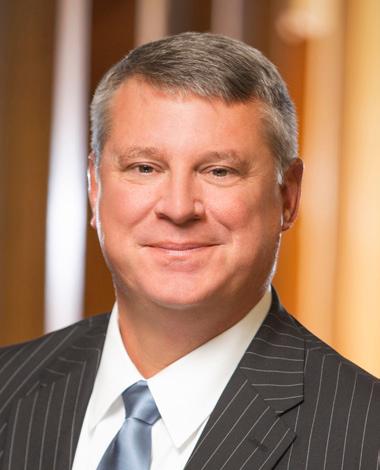
Brad Chambless is the CEO of Farmers & Merchants Bank and the Bank of Fayetteville. Before starting his banking career in 2006 as a commercial loan officer, he practiced law in Arkansas for over a decade, representing banks and agricultural clients. He was promoted to chief lending officer in 2014 and became CEO in 2021. Chambless holds a bachelor’s degree from the University of Arkansas at Monticello and a law degree from the University of Arkansas School of Law. As the Arkansas Bankers Association’s 2024-2025 chairman, he is dedicated to serving member banks statewide. Guided by values of service and lifelong learning instilled by his parents, Chambless is passionate about quality work and helping his community thrive. He is excited about Farmers and Merchants’ continued growth and celebrating the bank’s 80th anniversary throughout 2025.

decades of hard work allowed Davidson Law Firm and its clients to grow and prosper. With more than 50 years of legal experience, Davidson has successfully tried hundreds of cases and built a reputation as a trusted advocate in real estate, general business law and civil litigation. His commitment to helping clients navigate complex challenges and secure their legacies has made him a cornerstone of the Arkansas legal community. He approaches each case with the same passion and precision he applies to his own ventures. Beyond the law practice, Skip enjoys his role as a cattle rancher and real estate investor.

Dustin A. Duke is a founding partner at ARlaw Partners, which has offices in Little Rock and Fayetteville. His practice areas include probate, estate planning, real estate and elder law. Duke is a graduate of the University of Arkansas School of Law in Fayetteville. He obtained a bachelor’s degree in political science with a minor in broadcasting from Central Michigan University. Duke is licensed to practice in Arkansas state courts, including Arkansas trial courts, the Arkansas Court of Appeals and the Arkansas Supreme Court. He is also licensed in the Federal District Court for the Eastern and Western districts of Arkansas. He represents clients in courtrooms across Arkansas. Duke is a past recipient of the Arkansas Bar Association’s Equal Justice Distinguished Service Award and the Arkansas Access to Justice Commission’s Champion of Justice Award.
Doug Elms is founder and principal consultant at SafeHaven Security Group in Bentonville.

Dale Cole is chairman, president and CEO of Batesville’s First Community Bancshares and chairman and CEO of First Community Bank. First Community Bank has 34 locations across Arkansas and southern Missouri. Cole was one of the bank’s original board members in 1997. He began his career in Dallas in 1974 and went on to found the bank in 1997, going door to door collecting almost $3.5 million in capital from shareholders. The bank’s assets today reach nearly $3 billion, and it employs more than 600 people.
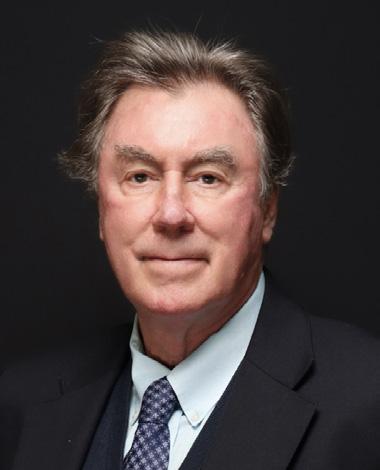
Charles Darwin “Skip” Davidson, a proud native of Lake Village, is a testament to the power of hard work, determination and integrity. Davidson was inspired by his parents’ values and work ethics, and after earning his bachelor’s degree and law degree in 1973 from the University of Arkansas in Fayetteville, he charted his own course by founding the Davidson Law Firm in Little Rock, driven by a vision to create a legacy of opportunity and excellence. Proven results for clients over
A former police officer in Little Rock, Elms is sought after as a security consultant, executive protection agent, leader of global corporate security, and behavioral threat assessment and management expert. Elms previously worked at Walmart, where he was personally responsible for the protection of CEOs, executives, board members and other at-risk executives. He designed estate security for at-risk persons and assessed business and security risks to the global enterprise. Elms founded the Risk Intelligence Sharing Consortium and the Violence Prevention Conference of Mid-America, and in 2024, Gov. Sarah Huckabee Sanders appointed him as a commissioner to the Arkansas Judicial Discipline and Disability Commission. Elms’ clients include state, national and global brands such as lululemon, Patagonia, Stephens Investments, Arvest Bank Group, O’Reilly Auto Parts, Domtar, the University of Arkansas in Fayetteville, the American Diabetes Association, the Nashville Ballet, Crystal Bridges Museum of American Art in Bentonville, the Arkansas Museum of Fine Arts in Little Rock, HBO and more.

Drue Ford is a financial executive with over 35 years of experience in the agricultural finance sector. He graduated from Arkansas State University in Jonesboro with a Bachelor of Science in Finance, laying a solid foundation for his future career in financial management and credit oversight. Ford serves as the executive vice president and chief credit officer at AgHeritage Farm Credit Services, a role he has held since 2006. In this



Camp Aldersgate creates life-changing experiences for individuals with special needs.
Congratulations to our Director of Development Bobbi McDaniel
for being selected as a Fifty over Fifty! Camp Aldersgate and friends have been a fan since Bobbi joined our team in May 2023. Bobbi leads our major gifts, large fundraisers, donor relations and oversees all development initiatives. Bobbi’s many gifts include the ability to develop meaningful relationships around the state, maximizing resources and utilizing her business acumen to advance the mission and growth of Camp Aldersgate. Her innate passion to help others coupled with her positivity is contagious and inspiring.
campaldersgate.net | 501-225-1444 2000 Aldersgate Road, Little Rock

capacity, he oversees the association’s credit portfolio. Ford’s career has been dedicated to working with farmer-owned cooperatives where he has developed an in-depth understanding of the unique challenges and opportunities faced by the agricultural community. He has spent 35 years of his career with farmer-owned cooperatives where 25 years have been at AgHeritage Farm Credit Services.

Price C. Gardner has served as managing partner of Little Rock’s Friday, Eldredge & Clark since 2019. He joined the firm, which has an office in Rogers, in 1989. Gardner focuses on corporate and tax matters, mergers and acquisitions, real estate transactions and financing, and other related matters. He was first appointed by then-Gov. Asa Hutchinson to the Arkansas State University System Board of Trustees in 2017 and reappointed in 2022. He has been listed in The Best Lawyers in America and Chambers and Partners in several different practice areas for many years. He is a member of the Arkansas Bar Association, the Arkansas Bar Foundation, the American Bar Association, the Arkansas Society of Public Accountants and the American Institute of Certified Public Accountants. He is currently a member of Fifty for the Future and a former board member of the Arkansas Repertory Theatre in Little Rock.

Dr. Melissa Graham is owner and a physician at Advanced Allergy & Asthma, Dr. Melissa Graham and Associates, in Little Rock. An allergist and immunologist, she has been in practice in central Arkansas since graduating from the University of Arkansas for Medical Sciences in Little Rock in 1994, completing her first residency at Arkansas Children’s Hospital in Little Rock in 1997 and her fellowship at UAMS in 2000. She received her undergraduate degree from the University of Central Arkansas in Conway. Her practice was voted to AY About You’s “Best Of” list in 2023.
As president and CEO of Visit Bentonville since 2005, Kalene Griffith has overseen the organization through Bentonville’s explosive population growth and economic, social and cultural advancement. Through collabora tive effort, Bentonville has become a global hotspot for individuals to experience worldclass cycling, food and the arts. With a strong commitment to collaboration, she works closely with other organiza tions and individuals to share her enthusiasm and help promote Ben tonville, showcasing its unique beauty and its many attractions in order to help build a community that is a wonderful place to both visit and live. Griffith is a member of several boards and committees dedicated to promoting tourism and community engagement. She is currently chair of the Northwest Arkansas Tourism Association, former chair of the Arkansas State Parks and Tourism Commission and a board member at the Arkansas Hospitality Association Travel Council. She is also highly involved with the Arkansas Association of Convention Visitors Bureau and the Bentonville Chamber of Commerce.

Janet Harris is the executive director and CEO of the Winthrop Rockefeller Institute on Petit Jean Mountain in Morrilton, a nonprofit convenor that continues the late Arkansas Gov. Winthrop Rockefeller’s collaborative approach to creating transformational change. Harris was chosen to lead the institute in 2022 and has been with the organization since 2016, when she was tapped to help build the institute’s programs and bring clarity to the organization’s mission and method. Her achievements include aligning institute operations, building staff capacity in professional meeting design, facilitating impactful dialogue and deliberation, and creating educational programs that draw on Rockefeller’s legacy. Harris earned her bachelor’s degree while playing varsity basketball for the University of Central Arkansas in Conway. While working full time, she completed her Master of Public Administration at the University of Arkansas at Little Rock. She went on to work at the city of Little Rock and serve in senior leadership roles in three state executive offices, including eight years as Arkansas deputy secretary of state.

Terry Hartwick has served two terms as mayor of North Little Rock, his hometown. Hartwick first served from 1985 to 1989, then spent 15 years as president and CEO of the North Little Rock Chamber of Commerce and served as director of the North Little Rock Parks and Recreation department. He has just completed his second term, 2021 to 2024, during which he helped shepherd incredible development in the city, including the opening of the North Little Rock Justice Center and the creation of the planned 31,000-square-foot North Little Rock Event Center set to enhance tourism in the city. Hartwick ran unopposed in 2024 and, in 2025, began his third term. His lifelong dedication to public service is well documented — even before he entered the public arena, he proudly served in the United States Air Force and is a member of Veterans of Foreign Wars. He began his career in sales at Havertys
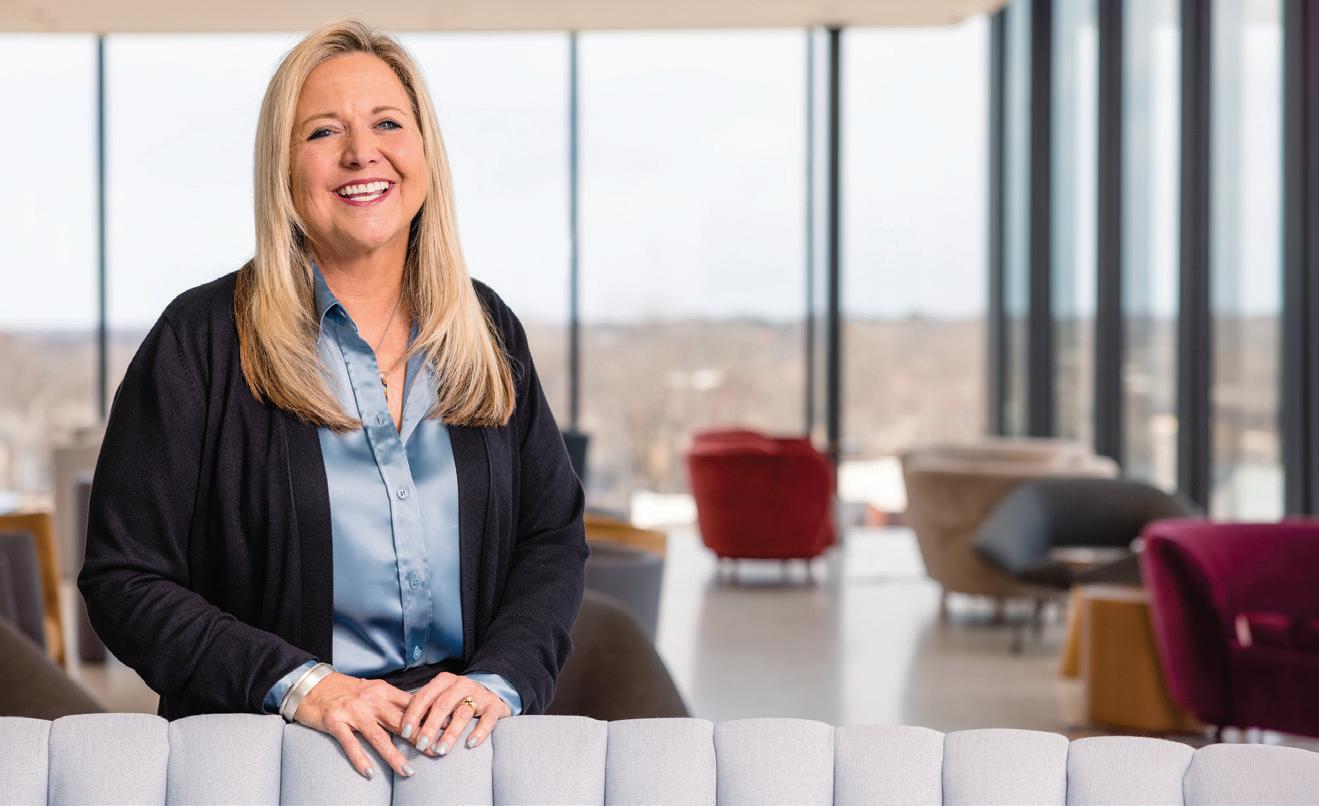
Named to AMPS Fifty Over 50!
For 20 years, Kalene Griffith has led Visit Bentonville with boundless enthusiasm and vision, sharing the magic of our community with the world. As President and CEO, her dedication to showcasing Bentonville’s unique charm has helped transform our city into a must-visit destination.
Congratulations, Kalene, on this well-deserved recognition! Your passion for Bentonville continues to inspire us all.

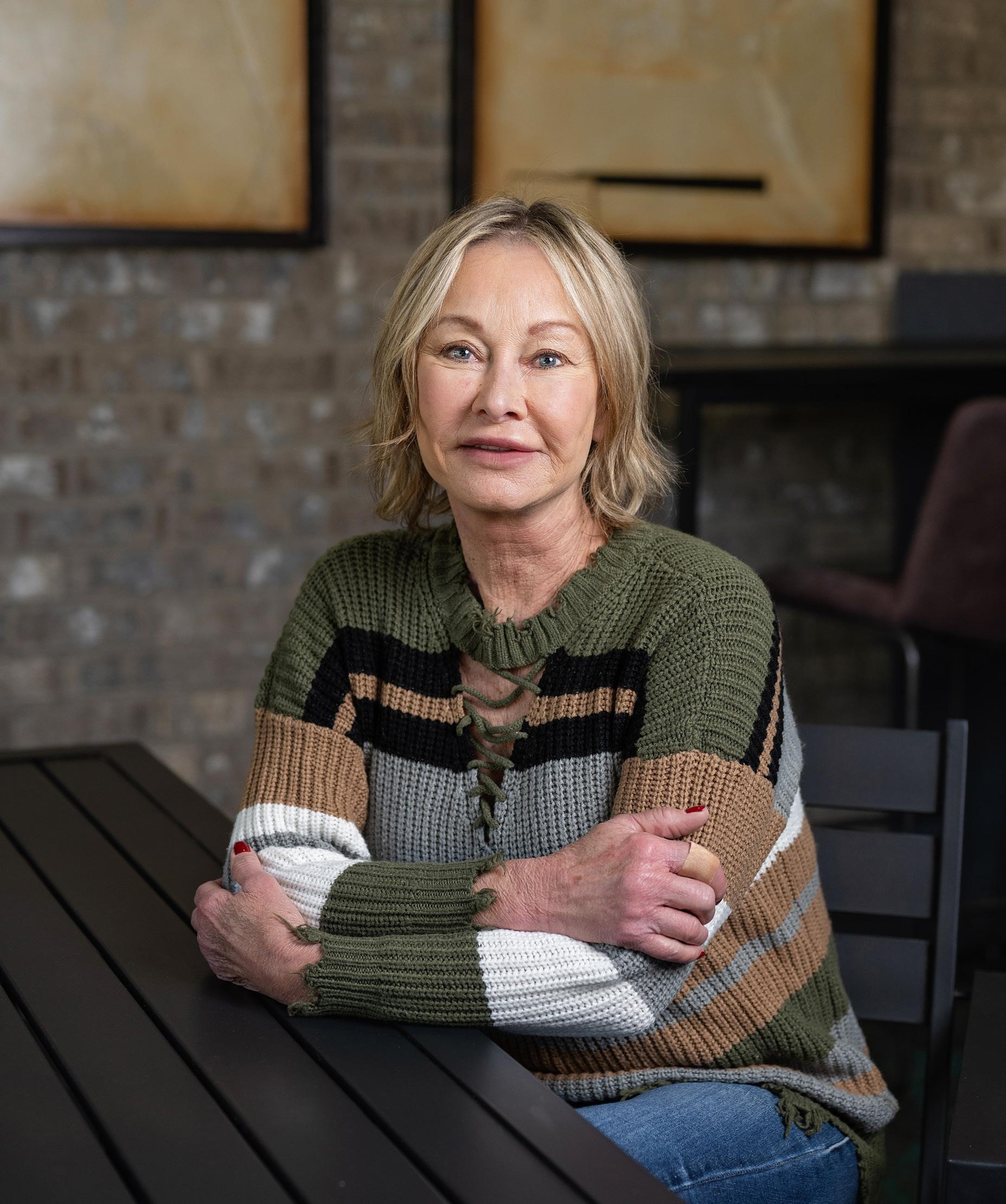
Grady Harvell is chief operating officer and president at W&W|AFCO Steel in Little Rock. He was born in Lunenburg in Izard County into a family with eight children and went to high school in Melbourne. After studying civil engineering at Arkansas Tech University in Russellville, he earned a Bachelor of Science in civil engineering from the University of Arkansas in Fayetteville. He joined AFCO Steel as an engineer trainee in 1972. In 1974, he became a project engineer, a role for which he designed and supervised steel construction projects. In 1980, he was promoted to general sales manager, a move that put him in charge of estimating, managing design engineers, contracting and subcontracting for customers of AFCO’s structural and bridge sales. He was named president in 2002.


Opening the doors in 1963, and Hoggs Meat Market proudly dedicated three generations to offering the best possible meats to North Little Rock. Hogg’s Meat Market is Central Arkansas’ largest and oldest butcher shop, operating for 60 YEARS, earning a reputation of friendly service, great prices, and the best quality meat around. Hoggs offers a full service bar and restaurant, catering, and game processing. Come on in, we will see you soon!
Fresh cut, hand-stuffed, and ground daily products. Whether you’re wanting to impress with a high end ribeye, stock up with a meat package, grill out with our home-made sausages, or even grab a pre-made side; we have it all!



By Doug Crise
For a moment, Terry Hartwick is somewhere else.
The always-effervescent North Little Rock mayor has been talking to a visitor about his latest labor of love. Preliminary dirt work is set to begin on the North Little Rock Conference Center in a couple of weeks, and Hartwick can look out his office window at its future location at 120 Main Street.
The prospect of a brand-new, 31,000-square-foot conference center is making Hartwick positively giddy — except for one thing.
“Millions and millions and millions of dollars,” Hartwick said, trailing off and letting the words hang in the air.
That is how much Hartwick estimated the city has lost over the past 30 years by not having a conference center.
“When I was running the chamber of commerce, somebody would call up and say, ‘Is there any place to eat that would seat 375 to 400 people?’” Hartwick said. “You know what I had to tell those people? Gotta go over to Little Rock.”
Hartwick remembered those conversations throughout his run at the chamber to his time directing the city’s parks department and then during his work as mayor. This, he said, has been on his to-do list for a long time.
“It’s something that everybody wants,” Hartwick said, “without a doubt.”
When all is said and done — likely early 2026 — the center will hold 1,500 people for events and 1,000 for dinners. By then, Hartwick will be on to something else.
That is how it has been for Hartwick. His staffers give him good-natured grief about how he has spent most of his life on the treadmill that is public service — always something next, always something that needs fixing.
Still, to watch him at work, jumping from topic to topic, his eyes bright with excitement, looking younger than his 76 years, it is clear he is right where he wants to be.
“I like making things,” Hartwick said.
Hartwick has been making quite a bit. Along with the arrival of Amazon and Dollar General distribution centers, two new hotels are slated to go up in downtown North Little Rock. In all, Hartwick estimated that $80 million in improve-
ments have gone into downtown alone.
The mayor thinks the conference center will have a ripple effect on the surrounding area.
“It’s inviting,” Hartwick said. “The conference center is going to turn on more people. I think you’ll see more participation in our trolley system. You’ll see more participation on our riverfront. It all ties in.”

Having new attractions pop up is one way to make for happy citizens, and make no mistake, Hartwick seems to love knowing his constituents have growing options for both work and fun inside the city limits.
The mayor, though, also has a businessman’s keen appreciation for the bottom line, and he knows that every citizen enjoying a restaurant or a hotel in North Little Rock represents money that is staying home rather than going across a bridge or on an interstate.
“This is money that we keep in our city thanks to our restaurants and our hotels,” he said. “The political aspect is selling it to the public.”
Selling his dreams for North Little Rock has never been a problem for Hartwick. Under his watch, 1,900 new jobs have been added to the local economy, a new city services building has been built, and a host of new businesses, including the Amazon fulfillment center, have arrived in North Little Rock. The police department, meanwhile, has increased its fleet of cars under Hartwick, and the mayor has helped spearhead recruiting efforts that have bolstered the department’s numbers and resources.
Do not ask him when he plans to wind down. Hartwick has a city to run, and his golden years can wait.
“I love doing what I do,” Hartwick said. “A lot of people say they can’t wait to do something or go to someplace else. My thought has always been let’s make things better where I am before going someplace else. I love it here.”
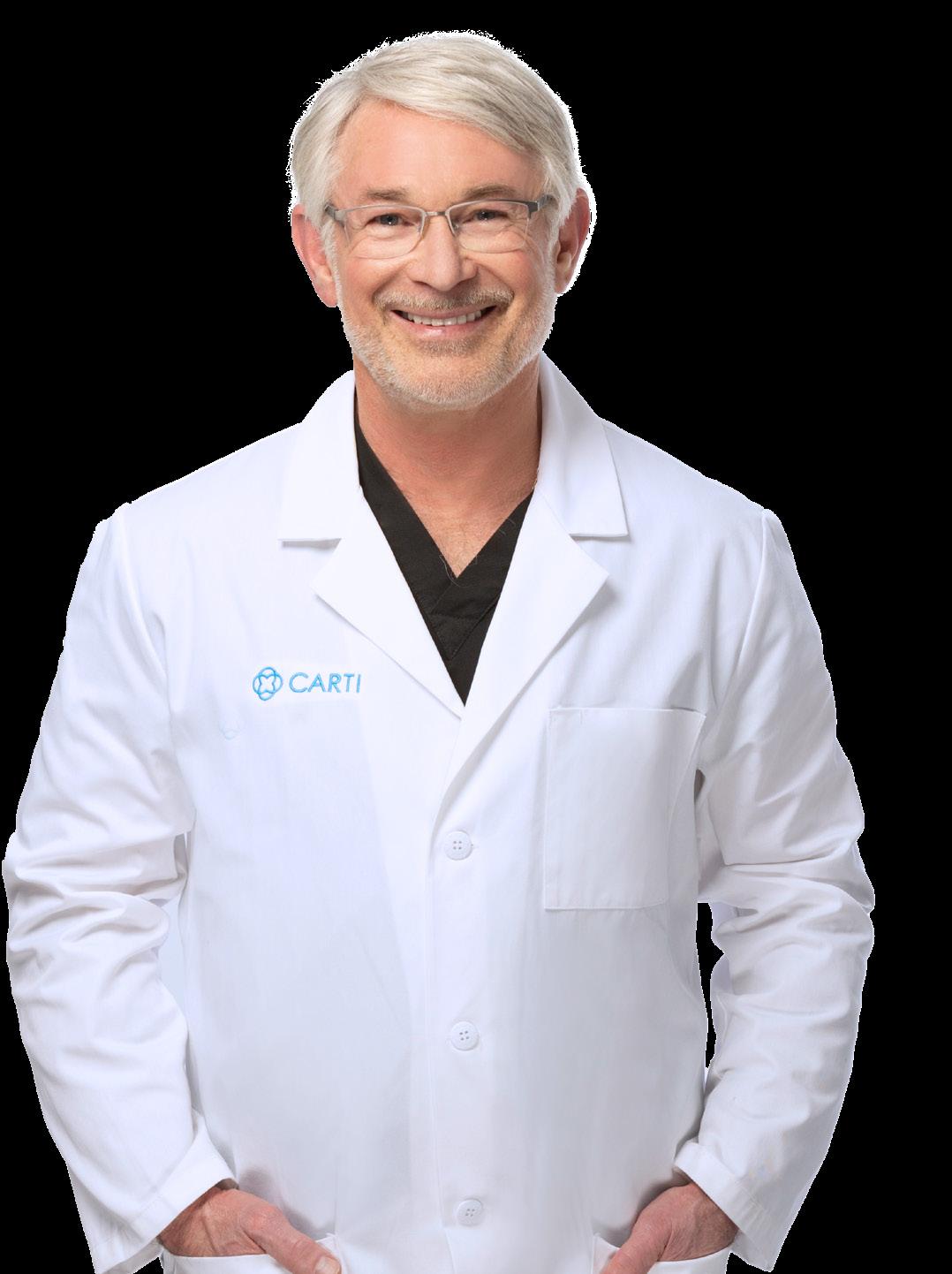



Stan Hastings Sr. is the third-generation CEO of Moon Distributors, Arkansas’s premier wholesale beverage distributor for wine, spirits, malt and nonalcoholic beverages for 90 years. Moon distributes beverages to more than 3,000 on- and off-premise accounts statewide in all 75 counties. Hastings is the first person to serve on both the Wine & Spirits Wholesalers of American and the National Beer Wholesalers Association boards, two positions that he was elected to by his peers. In 2021 the Wine & Spirits Wholesalers of America honored Hastings with the Lifetime Achievement Award. In a continuing effort to have influence on the state of Arkansas he serves as past chair of the Arkansas Museum of Fine Arts in Little Rock and was chairman when the museum had its grand reopening in 2023. He also serves as vice chair of the Little Rock Port Authority, working on economic development issues for the state.

As a financial professional and an active member of his community, John Hoefl is dedicated to helping individuals and businesses build their financial futures. To stay on top of his field as a chartered retirement planning counselor and develop his professional skills, he regularly attends industry training and certification programs and is a featured speaker in Hot Springs and southwest Arkansas. His academic achievements include a Bachelor of Science from Texas A&M, along with a Master of Business Administration from the University of Arkansas at Little Rock. Hoefl’s education, experience and professional affiliations have fostered his practical approach to offering financial services and advice to his clients. Maintaining a strong sense of community and a solid professional foundation are very important to Hoefl, he is involved in Hot Springs Civitans, Hot Springs Rotary, the Garland County Historical Society, the Church of St. John the Baptist in Hot Springs, Arkansas Cooperative Extension Service, Leadership Arkansas, the Arkansas School of Mathematics, Sciences, and the Arts Board Ambassadors, and the Hot Springs Creek Outdoor Classroom.
Hogg’s Meat Market and Catering
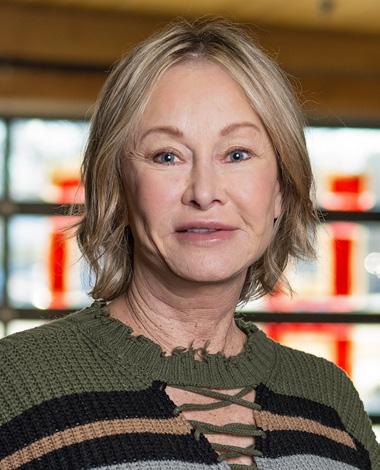
Peggy Hogg is owner of Hogg’s Meat Market and Catering in North Little Rock. The iconic business has been in the family since it opened in 1963. Three generations of the Hogg family have dedicated themselves to offering the best meats available. Hogg’s is central Arkansas’ largest and oldest butcher shop, having earned a reputation of friendly service, great prices and the best-quality meat. Hogg’s also offers a fullservice bar and restaurant, as well as catering and deer processing. Hogg’s moved to a 10,000-square-foot new facility at 3901 John F. Kennedy Blvd. in North Little Rock in 2022.
The

Myron Jackson, CEO of the Design Group, co-founded the Little Rock firm with Telly Noel Sr. in 2007 to fill a void: the lack of effective, authentic communications aimed at diverse audiences. Almost 20 years later, the Design Group remains the leader of the pack. The firm quickly made a name for itself thanks to its innovative technique. Just two years in, the Little Rock Regional Chamber named the Design Group the Little Rock Regional Minority Business of the Year. Outside of his work at the Design Group, Jackson and his wife, Stephanie, launched NOIRE magazine last November. The quarterly publication features visual and longform content, both in print and online, and “stories of triumph, heartache, celebration, grief, hope and aspiration.”
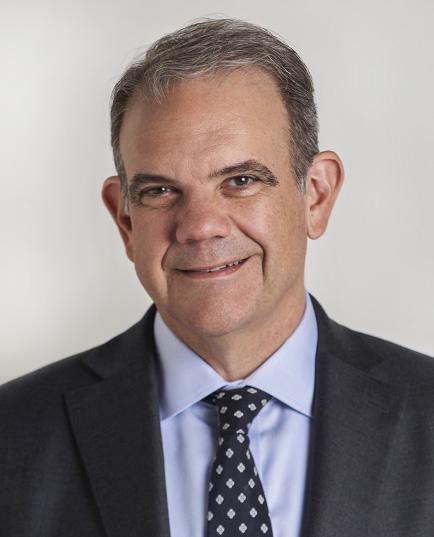
Chris Johnson is a certified public accountant and has served as senior vice president and principal financial officer for Dillard’s since 2015. He served as vice president of real estate at Dillard’s from 2012 to 2015, and from 2006 to 2012, he served as vice president of accounting. Johnson has also served as chief financial officer at CDI Contractors, a whollyowned subsidiary of Dillard’s, since 2008. Prior to joining Dillard’s, Chris was a senior manager at Ernst & Young’s northwest Arkansas office. He currently serves on the alumni board at the University of Arkansas in Fayetteville, the advisory board for the accounting department at the University of Arkansas Sam M. Walton College of Business and chairman of the audit committee at Encore Bank. He also serves on the board of directors at Easterseals Arkansas and the board of directors at Baptist Health Foundation. Johnson received his Bachelor of Science in Business Administration in accounting at the University of Arkansas in Fayetteville in 1994.

Janet Jones is owner and president of the Janet Jones Co., a successful real estate company in Little Rock. Jones started her company in 1980. Her philosophy of the “Golden Rule” with the highest possible emphasis on customer service and making people happy is what continues to guide the company. She is a community leader and served as the first female chairman of the Greater Little Rock Chamber of Commerce Board and a chairman of the Federal Reserve Board of the Little Rock branch. She has served on various community boards throughout the years, including CARTI, the University of Arkansas at Little Rock, YMCA, the board of advisors at the University of Arkansas for Medical Sciences in Little Rock, Big Brothers and Big Sisters of Central Arkansas, Fifty for the Future, and Youth Home. She was named Sustainer of the Year by the Junior League of Little Rock, ranked in the Top 100 Women in Arkansas and received the Rotary Club of Little Rock Business and Professional Leader of the Year Award.


Ted Mullenix | Co-Founder & CEO





As third-generation owner and president of Bray Sheet Metal in Little Rock, Mary Kelley continues a family tradition of excellent craftsmanship, outstanding customer service and endless innovation stretching back a century in business. Kelley leads a dedicated and experienced group of craftspeople who deliver a variety of services, including residential and commercial roofing, from built up, modified and standing seam to sheet metal, slate, tile and all asphalt shingles for both new construction and reroofing projects. The firm offers custom fabrication with the capability to roll, shear and break metals, including black iron, stainless steel, aluminum, galvanized and copper and specializes in welding aluminum, stainless steel and carbon steel. The industrial services division fashions air systems and custom duct work, custom safety guards, and stairways with special expertise in the design, fabrication and installation of pulp/paper mill air systems. Under Kelley’s leadership, Bray Sheet Metal was the first in the area to gain LEED certification from the U.S. Green Building Council.
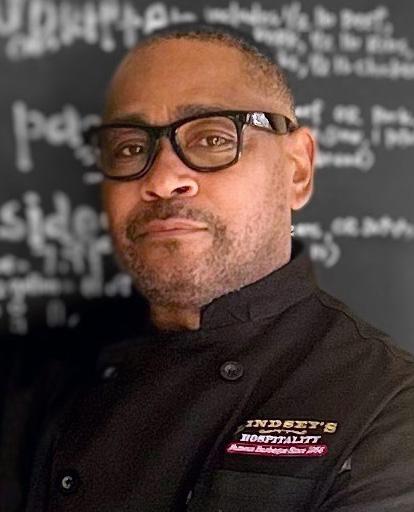
Donnie Lindsey Jr. is the owner of Lindsey’s BBQ & Hospitality House, a historic gem in North Little Rock’s Argenta neighborhood. Founded in 1956 by his parents, Bishop Donnie and Irma Lindsey, Lindsey’s has been a cornerstone of community, culture and Black history for over six decades. Since taking the reins in 2005 with his wife, Eleanor, Lindsey has honored the family legacy while ushering in new innovations. Under their leadership, Lindsey’s has grown to include a banquet facility, catering services and nationwide shipping of their iconic barbecue sauce. The restaurant has been recognized by the National Trust for Historic Preservation and featured in numerous media outlets. Eleanor’s unwavering support and leadership, alongside Lindsey’s dedication to community service and mentorship, have solidified their legacy as community champions. Together, they inspire through their work, philanthropic efforts and steadfast commitment to preserving history while serving future generations.
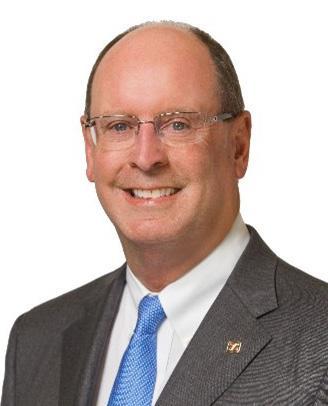

Bobbi McDaniel is director of development at Camp Aldersgate in Little Rock, where she leads all fundraising initiatives. Currently, McDaniel serves on the board of the Association of Fundraising Professionals, Arkansas Chapter. She is originally from Georgia and graduated from University of North Georgia with a bachelor’s degree in management and a minor in mathematics. Her passion for nonprofit work is deeply rooted in her volunteer community involvement. She is a past board member of the Arkansas Foodbank, Women & Children First, the Arkansas Repertory Theatre, all in Little Rock, and Arkansas Children’s Hospital Auxiliary, where she served as its president. Among other awards and recognitions, McDaniel was honored in 2010 with the Domestic Peace Award from the Arkansas Coalition Against Domestic Violence.

Dr. Keith Mooney is a urologist at CARTI Cancer Center in Little Rock. He received his medical degree from the University of Arkansas for Medical Sciences in Little Rock, where he completed residencies in urology and surgery. Mooney interned at St. Vincent Infirmary Medical Center in Little Rock. He is board certified by the American Board of Urology. He is a member of the American Board of Urology, American Urological Association, American College of Surgeons (Fellow), American Association of Clinical Urologists, American Urological Association (South Central Section), Arkansas State Medical Society and the Arkansas Urological Society.
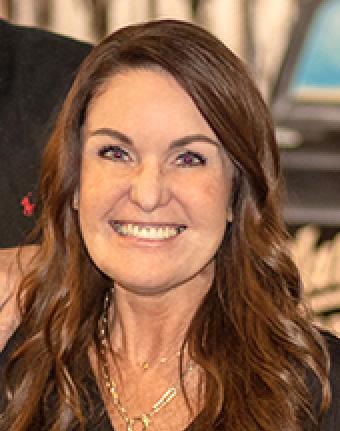
George Makris joined Simmons as CEO in 2013, piloting the bank through a period of unprecedented growth as it expanded from $3.5 billion in assets to more than $27 billion by 2022. From 2023-2024, Makris served as executive chairman for the company, leading Simmons’ boards of directors and overseeing several strategic initiatives and signature sponsorships. He stepped back into the CEO role in January 2025. Prior to joining Simmons, Makris worked at M. K. Distributors Inc., serving as president from 1985 to 2012. George currently serves as a member of the board of trustees for Jefferson Regional Medical Center, chairman of the Arkansas Champions Trust and as a member of the University of Arkansas at Little Rock Board of Visitors. An alumnus of Rhodes College in Memphis, Makris has a master’s degree from the University of Arkansas in Fayetteville.
Tori Tisdale Morehart started DownHome Catering in 2003 in a small brick building on Lawson Road in Little Rock. She began catering to doctors’ offices, pharmaceutical representatives and small area businesses. She inherited a love of cooking for others from her mother, who never let anyone leave her home without at least offering a meal. Now, Morehart’s catering customers, many of whom go back years, have become like family to her. The business, now based in Benton, has continued to grow and serves the Benton, Bryant, Little Rock, North Little Rock, Conway, Batesville, Pine Bluff, Searcy and Hot Springs areas, still delivering the DownHome Catering ethos of “faith, food and family.”

Ted Mullenix is CEO and political strategist at Mullenix & Associates in Little Rock. Under his seasoned leadership, M&A is consistently recognized as one of Arkansas’ most effective government relations and consulting firms. It proudly represents Fortune 500 companies, professional associations, corporations, educational institutions and organizations of all sizes. Before co-founding M&A, Mullenix served 16 years in the

PRESIDENT
Jamie Pafford-Gresham President & CEO



Arkansas House of Representatives, where he developed a deep understanding of the budget, legislative and regulatory processes. Today, he leverages this knowledge with an unmatched work ethic to secure client wins, including historic economic development and job creation projects such as Big River Steel, GTL Americas, Highland Pellets, Hybar and Zekelman, and growing Arkansas’ tourism industry through the representation of Arlington Resort Hotel & Spa in Hot Springs, Oaklawn in Hot Springs, the National Cold War Center in Blythville, and many others.

Heather Nelson is an entrepreneur, educator and mentor with a passion for leadership, connection and innovation. She is currently a visiting professor at CIMBA in Italy. Nelson was named the first-ever executive in residence at Arkansas State University in Jonesboro’s Neil Griffin College of Business in August. In that role, she mentors students, lectures, collaborates with faculty and leads initiatives such as the 2025 Catalyst: NEA Economic Development & Leadership Forum. The event drew nearly 600 to Jonesboro in January. Nelson is co-founder and partner at Seal Solar, a leading renewable energy company in Arkansas, and founder and principal at Global Headwaters. She has a Master of Business Administration from the University of Arkansas at Little Rock and a marketing management degree from the University of Arkansas in Fayetteville.
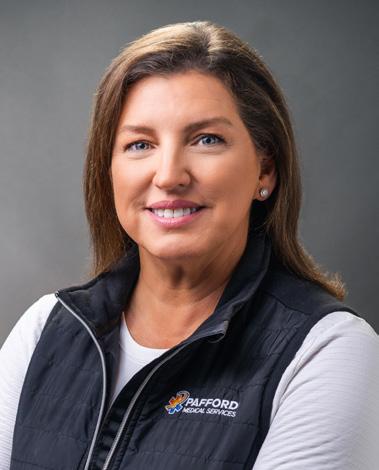
Jamie Pafford-Gresham is a proven leader in the emergency medical services industry, serving as CEO of Pafford Medical Services, which was founded in Magnolia in 1967 and is one of the largest privately owned ambulance providers in the U.S. With more than five decades of family legacy behind her, PaffordGresham oversees operations across four states, supporting more than 100 communities with exceptional emergency care. Her advocacy for rural emergency medical services has driven critical legislative efforts, including securing reimbursement programs and balanced billing legislation. She serves as president of the American Ambulance Association and on various state boards. Beyond EMS, she champions education and community service through her work with the Miss Arkansas Foundation and also serves on the board of trustees for the University of Arkansas Hope-Texarkana.
Dawn Prasifka
Girl Scouts — Diamonds of Arkansas, Oklahoma and Texas (retired)

had more than 25 years of experience with nonprofit organizations, including senior leadership roles in larger organizations, as well as startup entities.

Growing up, Dorcas Prince figured she would likely follow the steps of her parents into one of the family’s businesses. As a child in Brinkley, she worked at her father’s pharmacy and even went to pharmacy school, but instead of dispensing prescriptions, she eventually took over the business her mother started in 1977 in a room above the pharmacy. Prince and her husband, Stan, are the previous owners of the iconic Low’s Bridal & Formal in Brinkley. They employed more than 30 people and sold bridal or attendant gowns for as many as 5,000 weddings annually. The store has one of the largest selections of bridal gowns in the South and regularly draws brides-to-be from across Arkansas and surrounding states. That quantity of inventory caused the business to expand from its early location above the pharmacy. It is now housed in a restored 25,000-square-foot hotel building constructed in 1913 and listed on the National Register of Historic Places.
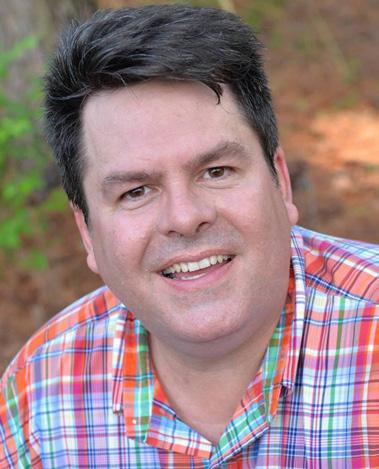
Providing astute legal services in the areas of personal injury, social security disability and workers compensation for more than 26 years, Hans Pullen is shelter from the storm when his clients need it most. Raised in Pasadena, Texas, Pullen earned his law degree from the University of Arkansas at Little Rock William H. Bowen School of Law after earning his bachelor’s degree from the University of Arkansas in Fayetteville. The Hot Springs-based attorney is a member of the Arkansas Bar Association, as well as the Association of Trial Lawyers of America. He serves as managing partner for Lane, Muse, Arman & Pullen, a Hot Springs firm founded in 1936 that is recognized by the LexisNexis-Martindale Bar Register of Preeminent Lawyers.
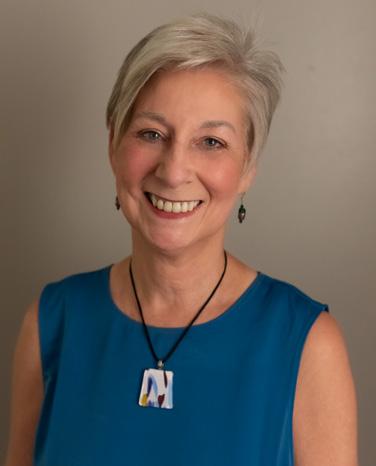
Dawn Prasifka is the recently retired president and CEO of Girl Scouts — Diamonds of Arkansas, Oklahoma and Texas. She has aided in developing girls of courage, confidence and character who make the world a better place since joining the organization in 2013. Over the course of more than a decade, Prasifka has touched the lives of tens of thousands of girls, volunteers, caregivers and staff members. She has connected members to other businesses and organizations around the state to help girls discover who they want to be and the opportunities in Arkansas. Prasifka
Following a 25-year first career in book publishing and a 15-year second career in entrepreneurial development, Liz Russell has launched an encore career as a subject-matter expert in both fields. As principal of Liz Russell Solutions in Little Rock, she consults with entrepreneurial support organizations in the field of government contracting and as an advisor to small business accelerators such as the U.S. Small Business Administration’s THRIVE emerging leaders program. She volunteers her time as a mentor in the Venture Center’s VCWoman Achieve program and consults as an editor, writing coach, and publication project manager. With an undergraduate degree in English from Rhodes College in Memphis and a Master of Business Administration from the University of Arkansas at Little Rock, Russell deploys business acumen with a narrative-driven approach. Her third act supports her goal of giving back to the small-business community after benefiting from the support of industry mentors, advisors, and state and federal agencies during her years of small-business ownership.


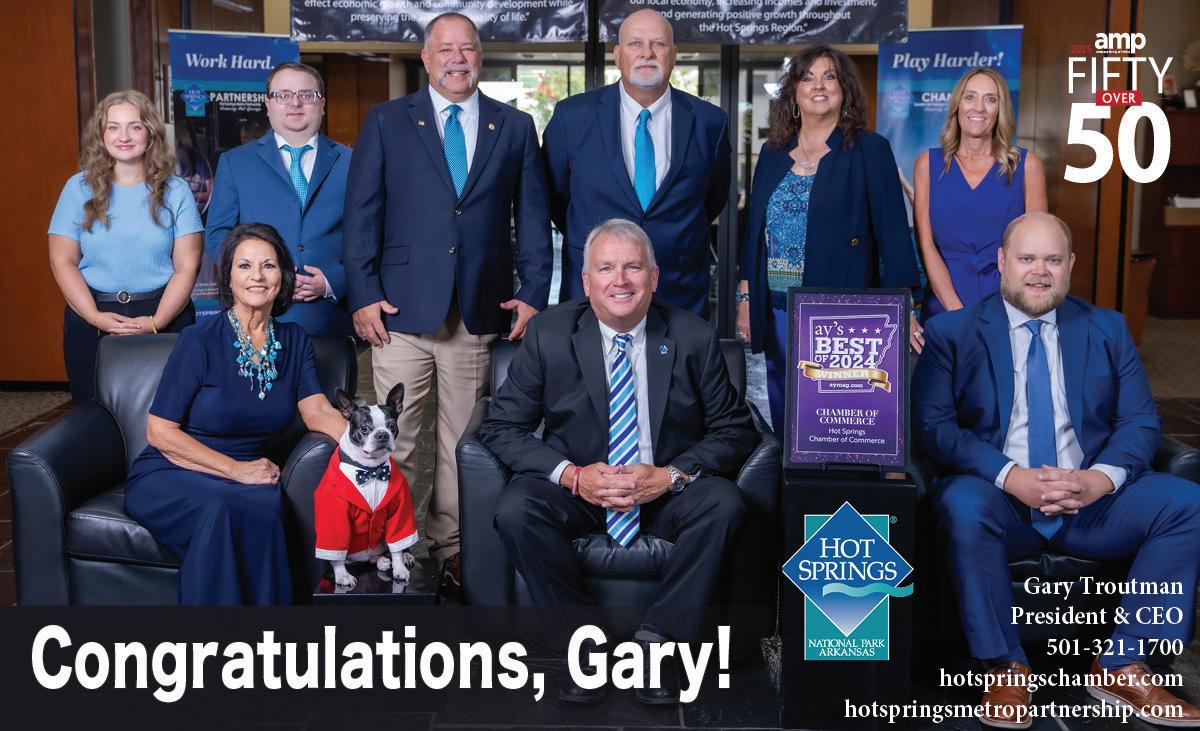





Congratulations Wesley on your leadership within our firm and across the state, designing some of the most significant projects throughout the region, including the Miller Creative Quad at Hendrix College, a new theater for Opera in the Ozarks in Eureka Springs, and the Alice L. Walton School of Medicine in Bentonville.

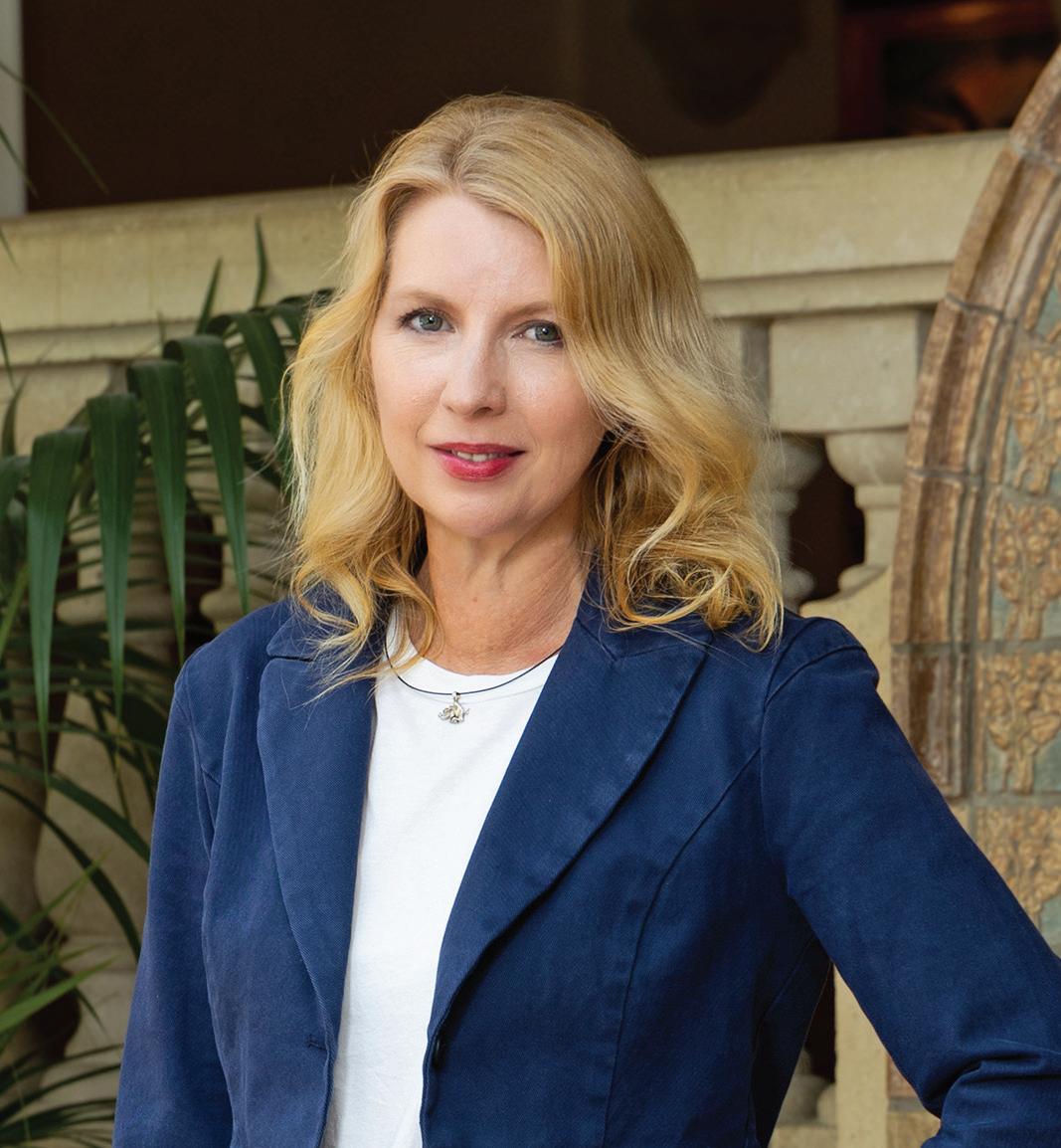

Dr. Scott Schlesinger co-founded Legacy Spine & Neurological Specialists in Little Rock in 1992 with Dr. Ray Jouett and Dr. Ronald Williams, two pioneers of neurological surgery in Arkansas. He is the recipient of a wide variety of professional awards and recognitions in his years of academia and neurological surgery. Schlesinger obtained his medical degree from the University of Arkansas for Medical Sciences in Little Rock. He then completed his general surgery internship and neurosurgery speciality residency training at the University of Texas Health Sciences Center in Dallas along with a fellowship in minimally invasive spine surgery at Centre Hospitalier Universitaire Vaudois in Lausanne in Switzerland. He is certified with the American Board of Neurological Surgery and is nationally renowned as the co-developer of the S-LIF fusion, a completely outpatient fusion surgery through a single half-dollar-sized portal.

Paul Stagg is chairman and owner of Little Rock-based Splash Car Wash & 10-Minute Oil Change. He has worked in the car wash industry for more than 30 years. Prior to Splash, he was instrumental in the expansion of Boomerang Carwash, for which he built and managed 25 car washes in Arkansas and surrounding states. In 2009, he sold his interest in those companies to focus on Splash, where he has worked alongside his family and the rest of the Splash team to grow the company to what it is today. Splash operates 26 locations across Arkansas and has a 27th opening soon in Centerton.
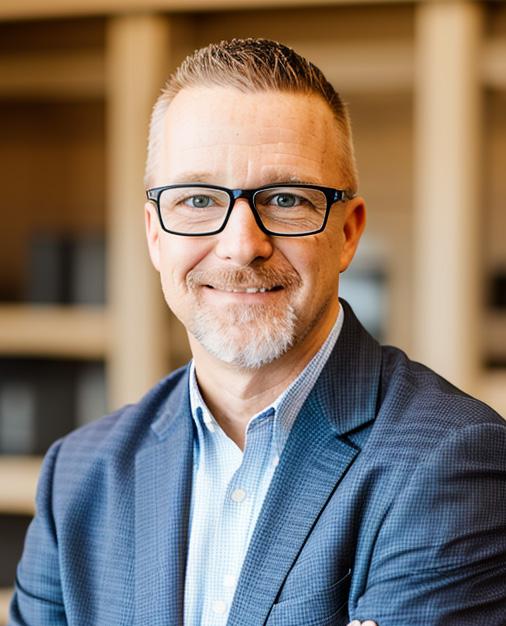
Jeff Standridge helps organizations and their leaders generate sustained results in the areas of innovation, strategy, profit growth, organizational transformation and leadership. He works extensively with health care organizations, technology companies, and techenabled companies across all industries. Formerly a vice president at Acxiom in Conway, Standridge has led established and startup business units in North and South America, Europe, Asia and the Middle East. Standridge serves as managing director at the Conductor in Conway, as well as at Innovation Junkie in Conway. He is a co-founder and managing partner at Cadron Capital Partners and teaches in the college of business at the University of Central Arkansas in Conway. Standridge is also retired from the U.S. Army, Arkansas Army National Guard. He has been an invited speaker, trainer and consultant for numerous companies, institutions and organizations across five continents. He is also a best-selling author of three books. Standridge has a Doctor of Education with special work in leadership and organizational behavior and a master’s degree from the University of Arkansas at Little Rock and a bachelor’s degree in health sciences from UCA.
Matthew Steliga, M.D.
University of Arkansas for Medical Sciences

Dr. Matthew Steliga is a chief of the division of thoracic surgery and the Kent C. Westbrook, M.D., Distinguished Chair in Surgical Oncology at the University of Arkansas for Medical Sciences in Little Rock. As a thoracic surgical oncologist, he is an internationally recognized expert in the treatment of lung and esophageal cancers and other cancers of the chest. He represents UAMS globally, speaking throughout North America, Asia, Australia and Europe on lung cancer, smoking cessation and surgical education. Steliga received his medical degree from the Medical College of Wisconsin, followed by a surgical internship and residency at the University of Tennessee Health Sciences Center, a cardiothoracic surgery fellowship at the Texas Heart Institute and a thoracic surgical oncology fellowship at MD Anderson Cancer Center in Texas. Steliga is board certified by the American Board of Surgery and the American Board of Thoracic Surgery and is a member of the Society of Surgical Oncology, as well as several other professional societies. He has represented Arkansas on the National Lung Cancer Roundtable consortium for the American Cancer Society. He was appointed by the Arkansas House of Representatives to serve on the advisory board for the Arkansas Department of Health’s Tobacco Prevention and Cessation program.
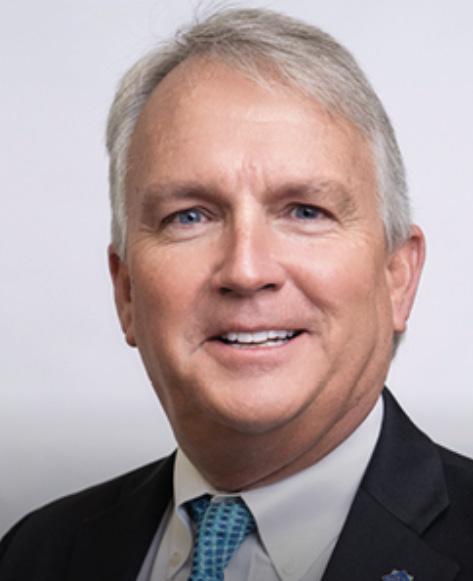
Gary Troutman is president and CEO of the Greater Hot Springs Chamber of Commerce and the Hot Springs Metro Partnership, where he works to showcase the Spa City to potential new businesses, industries and residents. Troutman joined the chamber’s board of directors in 2010, at which,time he was general manager of the Sentinel-Record in Hot Springs. He joined the chamber’s executive committee around 2013. In 2015, he became vice president of the Hot Springs market at First Security Bank. He was set to become chairman of the chamber board in 2018 but instead became president and CEO as one of 24 finalists selected in a nationwide search. He is a past president of the Hot Springs National Park Rotary Club, 2024 president of Arkansas Economic Developers & Chamber Executives, a board member of the Oaklawn Foundation, Arkansas state director of the Southern Economic Development Council, and a board member of the local 10-county workforce development board. He also serves on the U.S. Chamber Board of Regents. The Hot Springs Chamber is one of only 140 5-Star Chambers in the country and one of four in Arkansas. The Metro Partnership is one of only two accredited economic development organizations in the state.

Bill Walker currently serves as treasurer on the board of Arkansas Baptist College. He has served as director of the Arkansas Department of Career Education, Arkansas Parole Board Commissioner, an Arkansas State Senator and a member of the House of Representatives, as well as a Pulaski County Quorum Court justice. Walker was also the national chief operating officer at the Southern Christian Leadership Confer-





ence and a disadvantaged business enterprise partner at airport food and beverage operator HMSHost. Walker earned a Bachelor of Science from the University of Arkansas at Pine Bluff and studied at Philander Smith University in Little Rock.

Sam Walls III joined Arkansas Capital Corp. in 2003 and was named CEO in 2022. Arkansas Capital is a 68-year-old private economic development company that has helped deploy more than $2 billion in capital through small-business lending and project finance and has also been a leader in entrepreneurial education. Walls is a 1996 graduate of the University of Arkansas at Little Rock William H. Bowen School of Law, a 1992 graduate of Southern Methodist University in Dallas and a 1988 graduate of Catholic High School for Boys in Little Rock. Nationally, Walls was recently named a member of the Consumer Financial Protection Bureau Advisory Board, and he has served several years on the National New Market Tax Credit Advocacy Board.
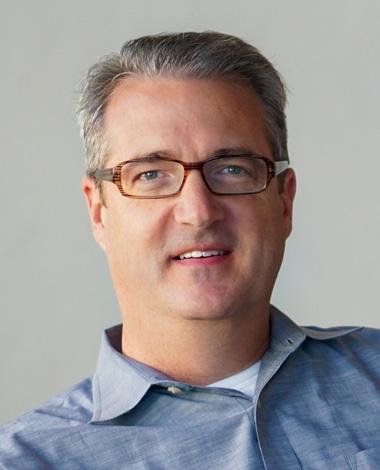
A native Arkansan, Wesley Walls, principal at Polk Stanley Wilcox, has been captivated since childhood by both the natural and built environment. Under his direction, the firm has been recognized for its architecture through numerous state, regional and national design awards. His innovative approach to design is both collaborative and exploratory, highlighted by a relentless commitment to both placemaking and relationship building. With more than 30 years of experience, his award-winning portfolio of work includes the Camp Commons at Camp Aldersgate, the UAMS College of Public Health (national ASHE VISTA Award), the Psychiatric Research Institute at UAMS, the Student Services Center at UA Little Rock, the Housing Administration building at the University of Arkansas and Hendrix College’s Miller Creative Quad. Significant works of design currently under construction include a new science building at Little Rock’s historic Central High School, a new theater for Opera in the Ozarks in Eureka Springs and the Alice L. Walton School of Medicine in Bentonville.
Murphy USA
Unlimited’s national board, Wetlands America Trust’s board and the Razorback Foundation’s board, as well as now serving on the Natural State Advisory Council.
Arkansas Graphics
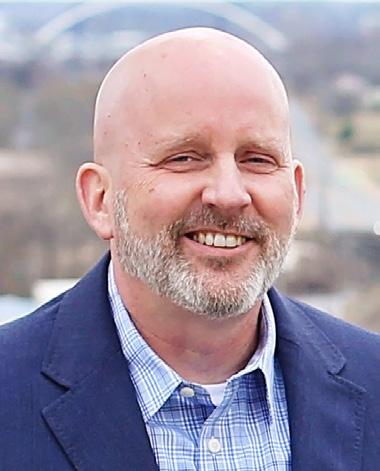
Arkansas Graphics was founded in 1974 by Dale Wilcox, father of current president and CEO Kevin Wilcox. Wilcox started off as a janitor at the company in high school and worked in different departments throughout college before starting full time in 1990. Wilcox took full ownership of Arkansas Graphics in 2013. He graduated from Catholic High School for Boys in Little Rock and Baylor University in Texas, and received his Master of Business Administration from the University of Arkansas at Little Rock. He has a wife of 24 years, Jennifer, and two sons, Wade, 22, and Whit, 20. Wilcox considers his family his heartbeat. Wilcox and his team have been able to overcome the challenges that commercial printing faced during the coronavirus pandemic, and Arkansas Graphics plans to continue to serve Arkansans for decades to come.

For Travis Worley, the restaurant business has always hit close to home. Growing up, he first took an interest in the industry at age 16. He also grew up eating Marco’s Pizza, and later, he worked for the corporate headquarters of the Toledo-based chain, which dispatched him to Arkansas eight years ago to get a struggling franchise running smoothly. Today, he and his business partner, Dan Cook, are the lords of the brand in Arkansas. Owners of 11 locations, they are also area developers, meaning they can issue their own franchises, through which they are connected to six more units.
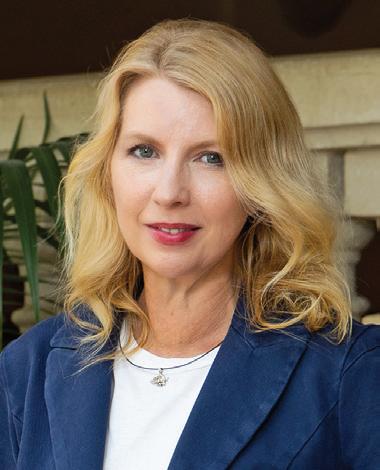
Mindy West is executive vice president and chief operating officer of Murphy USA in El Dorado. She joined the company in 2013 when it spun-off from Murphy Oil Corp., where she worked for 17 years. Prior to her current position as EVP and COO, she served as EVP Fuels, chief financial officer and treasurer at Murphy USA. She was the director of investor relations from 2001 to 2006 and then served as a vice president and treasurer from 2007 to 2013 at Murphy Oil. With a growing network of more than 1,700 retail stores in 27 states, the team at Murphy USA serves more than 1.6 million customers each day and ranks No. 214 on the Fortune 500 listing. West continues to expand her leadership roles while actively supporting greater Arkansas communities and interests by serving as a director at Simmons First National Corp.’s board, Ducks

Randy Zook is the president and chief executive officer of the Arkansas State Chamber of Commerce and the Associated Industries of Arkansas. Prior to taking the helm of the State Chamber/AIA, Zook was the deputy director of administration and finance for the Arkansas Economic Development Commission. For 34 years, he worked for Atlantic Envelope Company of Atlanta, Georgia, a $250 million manufacturer of custom-printed envelopes and business products, and served as president and CEO of the company from 1989 to 2004. He currently serves on the boards of Arkansas Public School Resource Center, the executive board for the Quapaw Area Council for Boy Scouts of America, Economics Arkansas and McGehee Farm & Real Estate Co. He and his wife, Diane, have three grown children and five above-average grandchildren.




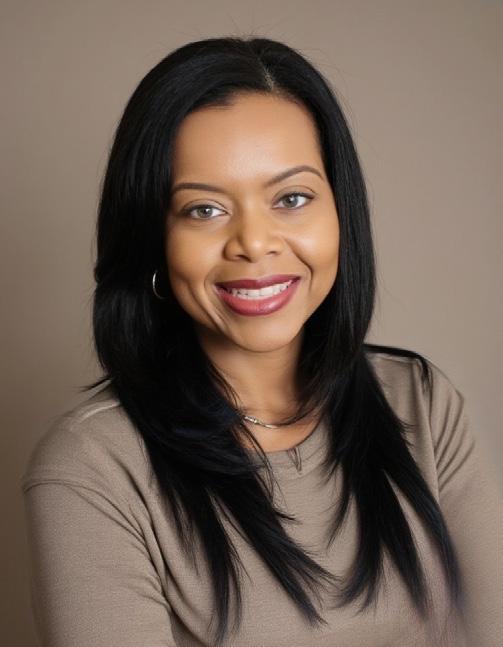
Black entrepreneurs represent a vital and thriving part of the state’s business community, providing jobs, contributing to the tax rolls and expanding opportunities for thousands of employees in Arkansas.

In recognition of Black History Month, Arkansas Money & Politics is proud to once again showcase several Black-owned Arkansas businesses, those that have carved out a unique niche in the marketplace.
Our communities are stronger and more vibrant when they include a wide range of backgrounds, ethnicities, perspectives and dreams, and AMP is pleased to salute a few of these outstanding business owners here. May their stories of perseverance and success inspire the next generation of founders from every walk of life in the Natural State.

According to the Minority Business Development Agency, a network of business centers and technical assistance programs through the United States Department of Commerce, Black- and minority-owned businesses are a driving force of economic development in Arkansas. In 2018, there were more than 256,000 businesses in the state, more than 43,000 of which were owned by minorities and about 23,640 of which were owned by African Americans, a fact sheet by MBDA states.
Anthony Brooks, founder and president of Platinum Drywall in Little Rock, is only one of the minority owners making up more than 17 percent of all minority-owned organizations in the state, and his path to success is paved with business acumen wrought over a three-decade career.
“I’m the second generation of Brooks who pursued construction as a career,” he said. “Now my sons are learning the business with plans to take it on.”
Brooks’ entrepreneurial spirit epitomizes that legacy. A veteran and an accomplished business leader, his journey is a testament to resilience, vision and community commitment. Born and raised in Jacksonville, he laid the foundation for his career while pursuing his studies at the University of Arkansas at Little Rock and then-Philander Smith College, now Philander Smith University, in Little Rock.
“I worked full time as a construction safety director and attended Philander at night,” Brooks said. “I then began working for Horton Drywall as an estimator before I left to establish Platinum Drywall.”
Upon earning his bachelor’s degree in operations management and supervision from Philander Smith in 1994, he gained invaluable industry experience at Rodney Horton Drywall Specialties in Austin,, where he worked alongside his father. When his father died in 1992, Brooks continued at Horton, recognizing the importance of succession planning and the need to secure his future. He also realized that entrepreneurship was the key to achieving financial independence and controlling his destiny, so, in 2001, he founded Platinum Drywall.
Starting with a team of three — including Horton coworkers Robert Matthews and Ben Walker — Platinum Drywall has grown into a leading commercial drywall contractor and employs 30 professionals. The company specializes in a wide range of services, including drywall, metal framing, fire and sound caulking, and acoustical ceilings.
Platinum Drywall handles projects ranging from a few thousand dollars up to multimillion-dollar projects and serves a market area that covers Arkansas and neighboring states. Over the more than 20-year span of the company’s operation, Brooks has navigated significant industry shifts, including advancements in technology, evolving workplace cultures and challenges posed by generational differences.
Managing a business long term is never without its challenges, and Brooks said he has faced his fair share. However, his commitment to providing a supportive and growth-oriented work
By Kelli Reep
environment has been pivotal in building a reliable team. Brooks acknowledged that working with younger generations requires adaptability but noted their talent and potential when nurtured effectively.
“I joined the United States Army Reserve when I graduated high school so it could help me pay for college,” Brooks said. “Philander allowed me the flexibility to work during the day and go to school at night. I was focused on providing for my family while planning to own my own business then.

Recruiting and retaining talent has been a persistent hurdle, especially as modern workers often seek frequent career changes.
“What I see a lot of young people do who are now coming into the workforce is place their priorities on something other than work. They are just as capable as my generation and the ones before me. Recruiting and retaining talent has been a persistent hurdle, especially as modern workers often seek frequent career changes.”
One of the company’s earliest milestones was securing a major contract for the Dickey-Stephens Park baseball stadium. The opportunity, championed by mentor Bob East, founder of East Harding Construction, solidified Platinum Drywall’s reputation for quality and reliability. Brooks called East’s guidance “priceless,” emphasizing the importance of mentorship in his journey.
Other high-profile projects have followed, including the U.S. Marshals Museum in Fort Smith and the new Dr. Marian G. Lacey K-8 Academy in Little Rock. The company’s work has also garnered multiple industry accolades, including two prestigious Eagle Awards from the Associated Builders and Contractors. Equally noteworthy is Brooks’ commitment to his community, and he said the veteran-owned business has always valued integrity, hard work and giving back.
For Brooks, success extends beyond financial achievements. His wife, Sheila Brooks, is a nursing professor at the University of Arkansas at Little Rock, and their two sons, Asa and Alex, are integral to his life and business. Asa, a graduate of UA Little Rock with a degree in finance, and Alex, a construction management student, are preparing to take the reins of Platinum Drywall, ensuring its legacy for future generations.


By AMP STAFF

very company strives to be the gold standard of its industry — to be the example of service, customer satisfaction and quality that peers and newcomers alike seek to emulate.
Anthony Brooks, a veteran and the second of three generations to work in the construction trades, was determined to show that more was possible. When he ventured out to start his own business in 2001, he skipped gold completely to aim even higher. If he demands much of himself and his team, it is only because he knows how important it is to get things done, and to get them done right. That drive has served him well for more than two decades now.
Platinum Drywall is approaching a quarter-century of serving commercial builders and has become one of the most in-demand drywall subcontractors in its multistate service area. The company prides itself on tackling jobs of any shape or size, from $3,000 builds to ambitious multimillion-dollar
projects. Brooks’ business also specializes in much more than just its namesake. Platinum Drywall provides one-stop solutions for framing, truss systems and acoustical applications, among other services.
Brooks has built Platinum Drywall’s reputation on excellent workmanship and on-time results. His company has played a role in the creation of several high-profile and widely recognizable projects, such as Dickey-Stephens Park in North Little Rock, the U.S. Marshals Museum in Fort Smith, the Robinson Center in Little Rock and the new visitors center at Pinnacle Mountain State Park in Roland. Platinum Drywall serves clients across multiple industries, from churches and hospitals to schools and retail spaces.
In a world where clients have a wide array of subcontractor options, Platinum Drywall has earned the continued trust of major players in the Arkansas construction space. Having worked his way up — and then faced the nearly endless responsibilities of small business ownership — Brooks knows his industry inside and out. He understands the value of hard work and the importance of an eye for detail. He also

knows that no job is a one-time deal. That is why the Platinum Drywall team always goes above and beyond, no matter the cost: each project well done is a chance to build customer relationships for the long term. When Arkansas builders look for the best in the business, they do not go for gold; they call Platinum Drywall.
5423 W. 65th Street, Little Rock 501-224-9255 platinumdrywall.com

Matcha Norwood is one of those people who one simply needs to wind up with a quick question and let her go. It is little wonder her business, Cheesecake on Point! in Little Rock, is such a success. The concept of failure just never had a chance with her.
Although born in the South American country of Suriname, Norwood was raised in the Netherlands.
“A lot of people think, ‘But wait a minute, it doesn’t make sense — South America and the Netherlands,’ but it does because my country was colonized by the Dutch,” she said.
I was like, ‘Cheesecakes? I’ve never made a cheesecake.’
With automatic Dutch citizenship, her mother chose to move to the Netherlands. Much later, Norwood came to Arkansas on vacation and actually was not too sure about the place, but she met the man who would become her husband and stayed. They have been married 12 years.
With the move to the Natural State came the need to find a job — or invent one. She chose the latter.
“I started my business in 2016, and actually I made cinnamon rolls at that time. I did it from home. I had never baked in my life,” she said. “Maybe it’s a little cliché, but you come from another country and you’re trying things, and it’s like, ‘I need to come up with something totally different to make it work.’ People were saying just put your hands in some dough, and that helps relieve stress.”
With a friend as a guinea pig, the would-be baker only needed a couple of practice runs before she came up with a recipe that worked. Things moved along quickly with help from some social media exposure. Some of that visibility brought a query from restaurant chain Shark’s Fish & Chicken.
“I just went there one day and gave them a sample of my cinnamon rolls to see if they were interested. They were, and then I think it was only two months after that they asked me if I could make cakes and cheesecakes,” Norwood said.
It turns out the restaurant’s most popular items were cheesecakes, and they were on the lookout for new sources.
“I was like, ‘Cheesecakes? I’ve never made a cheesecake,’” Norwood said.
The folks at the restaurant were game and willing to give a potentially dynamic cheesecake supplier a fair tasting. There was some work to do on the look of the first efforts, but taste was never a problem. The restaurant became an outlet, and so Cheesecake on Point! became a going concern.
Shark’s has multiple locations, so to keep her primary customer happy, Norwood had to move her operation out of her home into a commercial space. She found the right opportunity at Arkitchen, a 5,000-square-foot Little Rock commercial kitchen dedicated to small business entrepreneurs. She was the first tenant in the busi-
By Steve Wilcox
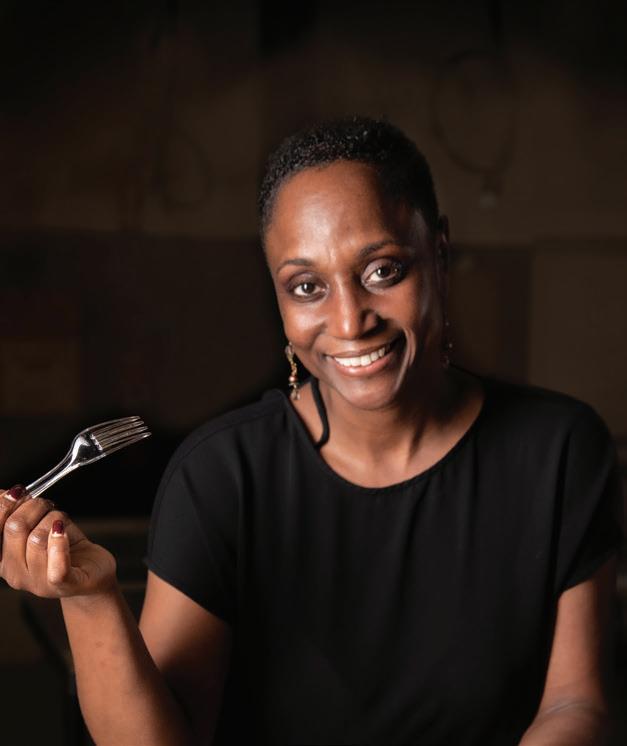
ness incubator in 2018 and benefited from visibility Arkitchen provided to interest additional tenants.
During that time, Norwood became acquainted with Scott McGehee, chef and serial restaurant-concept entrepreneur who launched Yellow Rocket Concepts and its group of theme restaurants. Suddenly, Norwood had an additional restaurant customer with Local Lime in Rogers in her fold.
“I spoke with Scott, and we immediately hit it off. I made some samples. He fell in love,” she said. “Five years later, and I’m still making the cheesecakes for Local Lime. That’s kind of when everything really started because he talked to other restaurants about me.”
From a standing start in her home kitchen through a restaurant business incubator to the inclusion of a food truck, the culinary journey progressed. Her first day in the food truck, the crowd for which was bolstered by Facebook posts, she sold 800 slices in eight hours at the Downtown Food Truck Festival in Little Rock. Norwood also learned that Americans love just about any food if it is served on a stick, she said.
Knowing she had unlocked the key to great cheesecake, Norwood looked for additional opportunities to build her business. She happened to find one across the street from where she set up shop with her food truck on West Markham Street. With a little prayer and some help from her mother, she was able to secure the lease, which happened to be held by the same folks who run the kitchen incubator, and purchase additional equipment.
If that seems like a sunny tale about making one’s own luck, it truly is. Norwood’s landlord at her now-busy storefront knew she was a hard worker because the incubator kitchen was open 24/7, and the cheesecake entrepreneur was in the kitchen most of those hours. He knew then what people in the local area and beyond have come to know: business woman (she now has a team) and cheesecake maker Matcha Norwood really is “on point,” which is the genesis of the company name.
hile it was still within operating hours, the doors of Hearne Fine Art were closed one particular Wednesday afternoon. Co-owner Garbo Hearne needed a little break to refresh the Little Rock gallery, including painting on the walls and refinishing the floor.
It had been five years since she last spruced up the place, and it was time to do it again.
“Every time you hang an exhibition, that’s another hole in the wall and another spackle,” she said. “I just try to keep it fresh.”
Founded in 1988 by Hearne and her husband, Archie, the gallery has been on a mission to “recognize and promote the power of African American art in the quest to generate and sustain generational wealth.” Now in its fourth location in the historic Dunbar neighborhood, one of the oldest Black communities in the state, the gal-
It was another effort to build something for our children to be a part of and learn about their culture.

lery has thrived over the decades, scoring exhibitions with nearly 75 artists, including sculptor (and astronaut) Ed Dwight, watercolorist Dean Mitchell, and textile artist Bisa Butler.
Hearne also strives to showcase past artists who risk being lost to time and recently featured an exhibition called Pioneers of the Paint, which included four masters from the 19th century.
“It was really exciting to bring that work,” Hearne said. “We wanted to bring the oldest work by Black artists and show the value of it, and it does last because this is work from the 1800s, and we still continue to work with that collection.”
Featuring something for every taste and budget, the gallery features about 100 pieces of work at any given time, price tags ranging from $50 to $500,000.
“We try to make it so it’s for everybody,” she said, “and that’s the beauty of my job, that I can change it. We are always looking forward to the next exhibition, so if you come here and you don’t see an artist or an art form you like, you just don’t like art.”
Part of the gallery’s mission is using art to educate, grow relationships and build a stronger future, she said.
“Art is one of those things: The value remains no matter what’s going on in the world,” she said. “When you buy a piece of art, when you hand it down to your son or nephew or give it to an institution, you are building generational wealth.”
In addition to co-owning the art gallery with his wife, Archie Hearne is also a practicing family medicine physician in Little Rock. Growing up in California, he started collecting art in college
By Matt Smithmier
before moving to Arkansas in 1983, a move that his wife described as “a big culture shock” for him.
Garbo Hearne grew up in Arkansas and was a practicing nurse when she met Archie, but after marrying and having children, the couple decided to open the first iteration of Hearne Fine Art: a print gallery focused on local artists and Black culture.
“This was a way for me to be the mother I wanted to be,” she said. “It was another effort to build something for our children to be a part of and learn about their culture. There were no galleries or bookstores with the focus on Black culture at the time.”
The couple soon began selling books and eventually custom framing services before also adding fine art. They have since separated the bookstore and framing business into a separate entity — Pyramid Art, Books & Custom Framing — located next door to the gallery.
Since they first opened their doors and through all the subsequent evolutions, Hearne said the community response has always been supportive, even if ongoing education is still required.
“I think we’ve always had a great response because we’re still surviving,” she said, “but there were questions from the media: ‘Why Black art? What’s the difference, and why does it matter?’ Similar to what’s going on now, it really does matter that you know where you’re from. We’re all a melting pot, but I do think it’s important if you’re interested and have the wherewithal to make that focus happen — and do it correctly.”
Closing in on four decades of serving the local art community, Hearne said she is grateful to serve many repeat customers and for the chance to help so many people build their own art collections. She is also proud of her work with the Six Bridges Book Festival, and in addition to a regular art exhibition, each year, the gallery brings in an illustrator to visit schools, primarily in disadvantaged communities, to show one of the possible career paths of an artist. Last year, Hearne brought in award-winning illustrator and author Vanessa Brantley-Newton.
Another one of her top accomplishments, she said, is bringing high-caliber artists to Arkansas and shining a light on local artists and authors, all to provide a platform for them to tell their stories.
Just as Hearne is focused on educating and empowering future generations through the power of art, she also looks ahead to her own future and how to ensure Hearne Fine Art remains a fixture in the Little Rock community. That means doing a better job of embracing technology, including social media, she said, and even possibly passing down the business to one of her four children.
While she has no plans to grow or expand the gallery, she nevertheless remains enthusiastic about her work and Hearne’s place in the community.
“I’m at a crossroads right now, but at least I know I’m there, and I know what I’m doing five years from now, and I know what I’m doing next month,” she said. “I feel like the sky’s the limit. I’m not confined by anyone.”
Sometimes when you think you have nothing at all, you realize you have all you need. That was the case for Maranda Davis, who moved to Little Rock with her two boys, a car and not much else. Davis knew she had to find a way to provide for her family, and she decided it would be doing something she loved.
“I started out selling knives, and it was not something I was passionate about or could see myself doing long term,” she said, “so I turned to what really interested me, which is the mindbody connection, and I trained to be a massage therapist.”
Her first venture as an entrepreneur was in 2005, when she decided to begin her own massage therapy business. Davis said she had offers to work for others — doctors, trainers and other therapists — but she knew she could do it solo.
“I loved massage therapy because of the focus on the human body,” she said. “You're focused on the full anatomy, and there's beauty in that, a relaxation in that. You are also feeding someone’s soul; you're helping them get better, feel better, and it affects not just the body but their mind, spirit, emotions — everything.”
By Kelli Reep
about it. It's fine.’ Holding people to a standard when nobody else will is hard.
“When you are an entrepreneur, there's not a lot of sleep, there's not a lot of free time, and it's literally 24/7, but the hardest part is you have to think outside of the box. You can't just let everybody love you. You have to give them what they deserve, even if it means everybody doesn't love you in the room, and I think for me, that's the hard part because you really do want people to be happy, but at the same time, you want people to succeed. People can't succeed if you just tell them ‘yes’ all the time.”

I remember thinking, ‘Whenever I figure this out, I will be unstoppable.’
Davis is the epitome of the serial entrepreneur, each venture reflecting a different one of her many passions. She trained as a fitness and bodybuilding professional, competing in 2013 in the Bikini C open division of the International Fitness and Bodybuilding Federation, the governing body of the sport of bodybuilding and fitness. Turning to a plant-based lifestyle as part of her regimen as an elite athlete inspired her to pen her own cookbook.
Finally, her myriad interests culminated in Davis establishing Esthetic Excellence Academy in downtown North Little Rock. A licensed master aesthetician, Davis spent more than 15 years in the salon and spa industry, and she built Esthetic Excellence Academy to lead students to licensure in aesthetics, cosmetology and manicuring.
The facility encompasses more than 6,000 square feet of learning and workspace that includes a makeup area, waxing area, more than 20 training stations, a shampoo and dry station, manicure and pedicure stations, 20 facial tables, five treatment rooms, two classrooms, a full kitchen, a laundry room, and a large break area. The impressive school did not happen overnight nor without some hard lessons about helping others understand the work that it takes to be successful, which she dishes out as tough love to her students.
“Whenever you're leading people, you're not the most popular person in the world,” she said. “Whenever you hold people to a standard, not everybody in the room is going to love you. Everybody wants to hear, ‘Oh, it's not a big deal. It's OK. Don't worry
Looking back at her career, Davis, now a mother of three, said she sees how her life’s choices have led her to where she is today. Her advice for anyone considering stepping out into business for themselves is to keep going.
“Honestly, if I'm just being completely transparent, I have wanted to walk away from business a gazillion times,” she said. “Life tomorrow is going to be so much different than today. If you could have asked me 20 years ago what I thought tomorrow would look like, I think you would have felt the hopelessness and defeat and fear I had from not knowing if I could make it until tomorrow, but that tomorrow was radically different. Have hope in tomorrow because today is not going to dictate where you are 20 years from now.”
Davis said she hopes to encourage her students and others to foster an entrepreneurial spirit — particularly women — by honoring their calling and doing the difficult things to lead full, productive lives for themselves and their families. She said she is a testament to the power of the right mindset, hard work and an unyielding drive to succeed.
“I remember having a great job and doing well, and when that ended, I had no idea what was next,” Davis said. “I remember thinking, ‘Whenever I figure this out, I will be unstoppable.’ Well, I figured it out; I figured out what I want to do is what makes me happy at the same time, and I became successful at it. For me, even though I'm working hard, I truly do the things that I love to do. I love fitness. I love health. I love dietetics. I love helping people with their diet. This all came together for me after starting from nothing and deciding I would make it.
“As a leader, you change lives by caring about someone else’s future. I'm a little bit more unorthodox than everybody else because I treat my students like family. I'm hard on them, but I want to see them succeed because I think we live in a world to where we tell everybody what they want to hear. Then they get out into the world and fail and blame others for it. With my students, I'm just super up front. I have high expectations, and I want to see them succeed.”
While Kristie Smith may have chosen the real estate path for its flexibility and to be more available for her young children, the self-proclaimed “house nerd” is nevertheless confident that home is where she belongs.
“I teach it. I practice it. The [COVID-19] quarantine let me know how much I really appreciate my own house,” she said. “I love all things home decor. I’m a plant lady. I love styling, decorating and HGTV. I mean, I’m pretty nerdy about it in all facets.”
As founder and principal broker at KSmith Properties Realty, Smith actually began her career in advertising and marketing. After earning a bachelor’s degree from the University of Arkansas at Little Rock and a master’s from Walden University, she worked for a marketing firm that served the Little Rock Convention & Visitors Bureau. Smith handled the diversity marketing for the organization, working to attract conferences to the city. The role required a lot of travel, however, and Smith’s two sons were still young. When her own mother — who was a practicing real estate agent at the time — suggested the career switch and the flexibility it would provide, Smith decided to make the leap.
“We were on the tail end of the first housing crisis, and I started out working in foreclosures, and that was pretty lucrative because you could really throw a rock and hit a foreclosure,” she said. “Well, that dried up once the economy started to bounce back, and then I got into new construction and started working with different builders.”
Yet the decision to branch out on her own, she said, really came down to how much she enjoyed that time at home — long before the pandemic forced so many to make the shift.
“It must have been about 2015 when I really started working from home,” she said. “We were going into the office less and less, and your office was pretty much a car if you were a practicing agent, so that really kind of sparked the ‘branching out on your own.’ I mean, I was always by myself anyway.”
In 2019, she did just that, opening KSmith Properties in Little Rock and adding additional agents to the team — the first of whom is still with her. In such a competitive field, Smith said her differentiator is all about focusing on her own improvement.
“I think how I’ve set myself apart has been not to compete with other agents but to compete with the agent I was yesterday,” she said. “I am my only competition because you will wear yourself out worrying about the next guy and trying to keep up with the next guy.”
That shift in mindset has allowed her to stay more focused
on the client, which she said is the key ingredient in her success (and has also led to several repeat customers).
“The clients I have, we go from having a professional relationship to a friendship,” she said, “so I think that has had a big part in how I’ve been able to sustain my longevity.”
Now that her sons are teenagers, Smith has also begun nurturing the next generation of real estate agents. Not only has she served as an adjunct professor at the University of Phoenix, Strayer University and Remington College; she currently is a member of the University of Arkansas at Little Rock Alumni Board of Directors. Homebuyers and aspiring agents can also take classes through the KSmith Real Estate Institute.
By Matt Smithmier

I think how I’ve set myself apart has been not to compete with other agents but to compete with the agent I was yesterday.
She said she thoroughly appreciates every aspect of the home buying and selling process, working with everyone from investors during the “cuckoo crazy madness of the pandemic” to young families looking to expand. Flips, rentals, new construction — she said every engagement and step in the process is enjoyable, especially inspections, an area in which she called herself a “stickler.”
“I’ve really worked in several areas. I can’t say that I have a favorite,” she said. “I love all of it. It’s the nerd in me.”
Now, a decade after making that career change for a little more flexibility, she said she enjoys the newfound satisfaction in her life.
“I work with people; I connect with people. I still get goosebumps when I take somebody into the house they love, and they don’t have to say a word when I know it’s their home. It’s like the hairs on the back of my neck stand up,” she said. “It’s a calling, definitely. I always say many are called, but few are chosen — so apparently, I was chosen.”
Dr. Quinyatta Mumford said she understands creating open dialogue among teens and young adults about sex education will not come easy.
Such, however, remains her goal. Through Village Public Health, the Little Rock agency she founded in 2018 as Mumford and Associates and rebranded last year, Mumford seeks to help reverse the rising rate of sexually transmitted infections among Arkansans ages 13 to 24.

Although STIs are on the decline overall nationally, a November report from the U.S. Centers for Disease Control and Prevention found that Arkansas is home to some of the highest STI rates, especially among the 13-to-24 age group.
Public health has been a career-long journey for Mumford, and she knows her stuff. She received her Doctor of Public Health from the University of Arkansas for Medical Sciences in Little Rock and a Master of Public Health from Walden University. Mumford is the former director of the Arkansas Department of Health Rural Health & Primary Care program, and she also served ADH in several roles as an epidemiologist. In addition, she is MPH program director and assistant professor at the New York Institute of Technology College of Osteopathic Medicine in Jonesboro, as well as an adjunct professor of epidemiology at Southern Arkansas University in Magnolia.
Mumford is taking her expertise on the road in Arkansas as part of Village Public Health Vibe Check Tour, through which health educators visit schools, churches and other organizations to speak with students and young adults in partnership with ADH. She said the program is designed to empower Arkansas youth and families to take charge of their sexual health and noted a positive response to its launch. The tour’s first stop was Focus Academy in Pine Bluff.
Mumford said she understands the cultural reluctance to talk openly about STIs. After all, she grew up in rural Alabama and sees many similarities between her native and adoptive states.
“Part of the problem is the lack of sex education in schools, and so no open dialogue,” she said. “Our goals are to normalize the conversation and remove the stigma. If we can just create an open dialogue, we can get people to think about it in
By Mark Carter
Young people are missing that sense of community that we used to enjoy, so we focus in on a village mentality.
a different way. We want to hear them say, ‘I never thought about it that way.’”
Mumford has trained hundreds of people to receive Youth Mental Health First Aid certification from the National Council for Mental Wellbeing. The health educators speak with and listen to students and young adults at tour stops. Mumford, the only certified trainer in the state, calls them the first line of defense.
“Young people are missing that sense of community that we used to enjoy,” she said, “so we focus in on a village mentality.”
That village mentality was the motivation behind her firm’s rebrand as Village Public Health.
“We shifted the name to make it more relatable,” she said. “We offer a nonclinical, holistic wellness place to go to discuss public health issues.”
Mumford & Associates was founded to provide in-office health education in collaboration with local physicians, but Mumford said she began noticing how more teens and young adults were dealing with mental health issues, especially after the COVID-19 pandemic lockdown. She said she knew something was missing.
“We had a mental health crisis going on,” she said. “I realized there was a different population I needed to focus on because they were struggling.”
The rebrand also brought a new approach, she added — community-based participatory research using a peer-to-peer model to help resonate with youth.
Mumford said she is looking to take the tour to those counties in Arkansas with the highest rates of STIs.
“We go to schools, churches, after-school programs,” she said. “You bring the audience; we’ll bring the open dialogue and health professionals.”
By Dwain Hebda
Veronica Love has spent most of her life caring for others, be it as a caregiver to her family or as the founder and CEO of Home Health Care Agency of Arkansas and founder and president of Southern Carrier Services, both based in Little Rock.
“Our family has a long history of being caretakers,” Love said. “I took care of my grandmother, I took care of my father, my aunt, and I took care of my grandmother’s siblings. We had to learn that being a caretaker was a part of being a united family.”
The successful entrepreneur continues to be defined in business and in life by her servant mentality, be it with clients or with employees.
“I try to pour into people like people have poured into me,” she said. “I’ve been poured into by so many people, so I try to put that into my staff so the people that use our services can see that.”
Over just six years, Love, who was named an Arkansas Money & Politics Power Woman, an AY About You Intriguing Woman and an AMP Top 100 Professional in 2024, has built her business enterprise to employ more than 120 people on that philosophy. Home Health Agency of Arkansas was named one of AMP’s 2024 Companies of Distinction.
“The health care industry is a passion that I have because I’ve seen so much sickness in my family,” she said. “When sickness hits your home, it’s a different feeling. When I had to be that caretaker in my family and had to depend on people to help us figure things out, I realized the need. I understand how elderly people need assistance. You have to have patience with them. It was something that I’ve done all my life, and so it just came naturally to me.”
Part of Love’s gift as a businesswoman has been to recognize the needs within the community and leverage those opportunities into successful ventures. She founded Home Health Care Agency of Arkansas in 2018 and, while
serving her clients, noticed nonemergency medical transportation was a problem for many of the families the company served. That led to the formation of Southern Carrier Services.
Her authentic approach to her clients’ needs routinely forms bonds that are less like that of a vendor and more like a caring neighbor.
“It touches me,” she said. “When our clients expire, I often get a call like I did today, and they say, ‘Thank you for your service. Thank you for taking care of my family,’ That’s what it’s all about.”
Love’s success has caught the attention of others looking to launch businesses of their own. She said she received so many calls from people seeking her guidance that it led to her latest idea.

At the end of the day, though, it’s not about what I did for me; it’s about what I did for others.
“I get a lot of phone calls about, ‘Hey, how can you help me take the path of entrepreneurship?’” she said. “That’s the thing that I’m working on implementing, allservices.org, the mentor part of my business that I’ve just kind of started. It will teach other people how to open a home health care agency and how to get structured early on.
“For people who want to go down this path or just want to have some type of direction on how to open a business, this will save people from headaches down the road. I am just starting with that, and it’s quite rewarding. I look for that to help develop other leaders and other people to be great entrepreneurs.”
Even as she works on the new mentoring concept, Love invests daily in developing the people on her team to better inspire their professional development while modeling the behavior herself.
“The toughest thing about being the boss is making tough decisions when it’s uncomfortable at times,” she said. “Sometimes you have to make a tough decision when it doesn’t feel so good because it’s the best decision. Strengthening myself with that makes me a better leader and a better business owner.
“At the end of the day, though, it’s not about what I did for me; it’s about what I did for others. The thing that makes my businesses work over any other business is that it’s easy for my heart to care. Caring for people is easy for me.”
Arkansas Talent Group celebrates first anniversary, reflects on the journey so far
By AMP STAFF
For any project, goal or dream, starting is the hardest part — though it is still far from easy after that. Data from the Bureau of Labor Statistics reveals that more than 65 percent of new businesses fail after a decade. Nearly 1 in 4 will not even be that lucky and will fold within a year. For business owners in Arkansas, where access to capital remains an issue, the path to success can seem even steeper.
The 365-day mark is clearly an achievement worth celebrating. More than that, it is a chance for introspection, one in which founders can reassess their goals, recalibrate their strategies and reaffirm their commitment to sustained success into year two and beyond. For Stephanie Shine and Chris Chunn at Arkansas Talent Group, that special occasion has finally arrived.
In February 2024, Shine and Chunn opened their new recruiting firm with a focus on accounting, finance, human resources placements and executive searches. Setting Arkansas Talent Group apart, they decided, would be their deep local networks, community expertise and whiteglove service, a combination that would ensure ideal matches for Natural State jobseekers and companies alike.
Arkansas Talent Group has been recognized as the best recruiting firm in the state by multiple publications, including Arkansas Money & Politics.
Before all of that, however, the pair had to wait out a strict noncompete agreement from their former employer. While it did leave time for behind-the-scenes preparation of the new brand, being out of work for 12 months only made it more crucial to hit the ground running on day one. There was also the transition from a large corporate setting to the demands of a small business. Thankfully, the dynamic duo found a way to accentuate each other’s strengths: Shine handles business operations, marketing and daily tasks, while Chunn focuses on finance and accounting and serves as the visionary for the organization. Shine and Chunn have also been able to bring on new team members, adding Senior Talent Recruiter Jennifer Thompson and Talent Recruiter Bailey Clark. With Thompson, an indus-

try veteran of corporate recruitment, and Clark, an experienced accountant with expertise across many roles, Arkansas Talent Group has achieved a breadth and depth of knowledge that attracts clients all over the state.
“A majority of our new business and clients are due to word of mouth, referrals and marketing, which was a surprise,” Shine said. “We got all of our past clients back, but we’re also excited to have expanded our footprint with many new clients seeking out our services.”
Over just a year, the firm has had a level of success that it intends to build on in the years ahead. They have completed 100 placements in the first year with an impressive 97 percent success rate. Arkansas Talent Group has been recognized as the best recruiting firm in the state by multiple publications including Arkansas Money & Politics. The executive search service has also taken off, as Shine and Chunn discovered a hunger for Arkansas-based talent in the C-suite. What is more, the firm has demonstrated its commitment to the community outside of the office, as well, with more than $15,000 donated to nonprofits in 2024.
Shine and Chunn are eager to share what they have learned with other recruiters and budding entrepreneurs. The power of
local connections and reputation, the importance of planning and the necessity of making difficult decisions are just a few of those lessons — more of which can be found in their Arkansas Talent Podcast, in addition to insightful discussions of topics and trends with industry leaders. The pair emphasized the fact that good relationships lead to good business; that offering a first-class experience is paramount and that listening — to one’s team, clients, partners and community — makes all the difference.
One of the biggest takeaways from their startup experience?
“The business community of central Arkansas is amazing,” Shine said. “We have been so inspired by how many CEOs, owners and leaders have supported us, cheered us on and offered support and mentorship. We never had that opportunity while working for a large corporate entity. They truly want Arkansas entrepreneurs to succeed.”
The firm plans to stay ambitious in 2025. The ATG team will grow its talented roster with more recruiters and support staff, expand services to respond to client needs and continue widening its footprint across the state. What will not change are the “EPPIC” core values upon which Shine and Chunn have built their brand: excellence, passion, partnership, integrity and communication.
“We couldn’t be here today without the support of our friends, business partners, clients and candidates,” Shine said. “For those that gave us advice, well wishes and who support us on LinkedIn, thank you. It has meant the world to us. We look forward to continuing our mission of connecting top talent with exceptional companies in the state of Arkansas.”




By Mak Millard
The feeling among those in the Arkansas startup space can be described as equal parts optimistic and determined. While the state is still far from where it could be in terms of capital, other avenues of support are hard at work to grow, attract and keep entrepreneurial talent in the Natural State. Looking to 2025, the heads of some of these resources can find much to be positive about.
“I expect to see an uptick in startup activity within the state now that we are past all the inflation talk and the election,” said Brent Birch, executive director of the Little Rock Technology Park. “Things have been relatively quiet on that front, and we are seeing that with our tenancy. The Arkansas ecosystem needs fresh ideas, capable startup leadership and investments to feed that fire.”
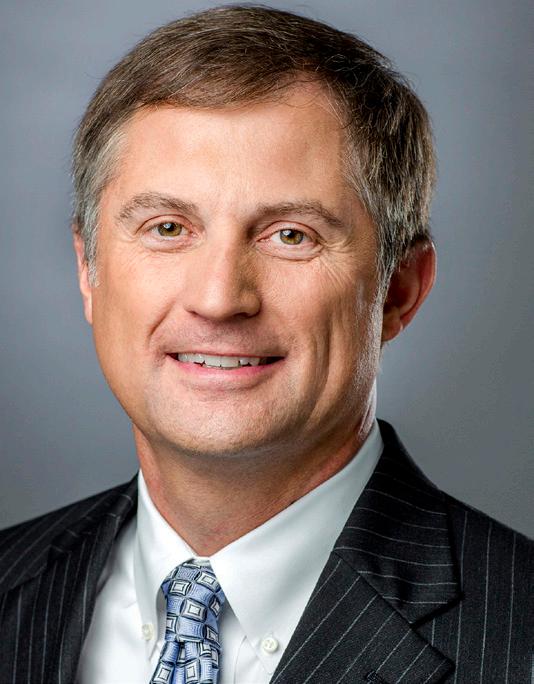
The outlook is encouraging in northwest Arkansas, as well, according to Rodrigo Salas, executive director of Entrepreneurship for All Northwest Arkansas, and Phil Shellhammer, executive director of the office of entrepreneurship and innovation at the University of Arkansas in Fayetteville.
“I’d say it is an exciting time for entrepreneurs and startups in Arkansas,” Salas said. “The state keeps attracting top talent, as well as investment.”
“I mean, you could put a really nice spin on what you’re seeing,” Shellhammer said. “The startup ecosystem in Arkansas is continuing to grow, I think, quickly because of the amount of support that’s being built around our ecosystem.”
Reactions from outside observers are mixed. A study by National Business Capital ranked Arkansas as one of the worst states to start a business, citing “low rates of per capita business formation … and [Small Business Administration] funding.” On the other hand, Forbes recently placed Arkansas at No. 3 — “a fertile ground for new businesses” — for its “exceptionally low [limited liability company] business formation fee” and a low cost of living.
“Anecdotally, the quality of life, standard of living continues to be a huge attraction,” said Arthur Orduña, executive director of the Venture Center in Little Rock and managing partner at the newly launched Venture Center Arkansas Fund, a $10 million fund that invests solely in Arkansas businesses. “Some fintech companies that we’ve worked with have deliberately made their headquarters in Arkansas specifically because of those, as well as the outsized support at the chamber level.”
Forbes’ methodology also factored in the support businesses find from a variety of different sources, not just SBA funds, and described the state as having a “commitment to entrepreneurial growth” in general. An ever-growing number of incubators, accelerators and other programs further attests to the state’s determination to encourage startups.
I expect to see an uptick in startup activity within the state now that we are past all the inflation talk and the election.
— Brent Birch executive director Little Rock Technology Park
As cyber criminals continue to deploy ever more sophisticated means of compromising victims’ technology, merely doing one’s job can present an opening for bad actors to prey on unsuspecting targets.
Smart Eye Technology was formed to create security solutions that not only deflect such criminal attempts but do it in a way that is easy enough for the most technologically uninitiated to operate. Founder Dexter Caffey got the idea for his company’s products while on an international flight.

“I went on a trip to Israel in 2018, and I actually was sitting next to a cybersecurity expert,” he said. “I noticed that I could see everything on his laptop screen, and a thought hit my mind: Why should I be able to see anything on this guy’s laptop screen? If a cyber hacker came in remotely, they could have the same access.”
The company’s products leverage the most advanced biometric technology to constantly scan the user’s face while the user operates the computer. As long as an approved user is facing the screen, the device functions normally. Turn one’s head, and the screen goes dark to prevent snoopers from viewing.
“When you turn your computer on, no matter what you’re looking at, as long as your face is authenticated continuously, that data stays open to your face,” Caffey said. “No hacker could come in remotely to access that information. If a hacker came in remotely and tried to access your screen and access your desktop, it would see a big, old grayed-out box.”
Launched in 2018, Bentonville-based Smart Eye Technology has gained interest in the banking industry and is also targeting health care and defense as prime candidates for its products. Caffey’s concept was also shepherded by Startup Junkie’s 12-week Fuel Accelerator.
— Dwain Hebda

I’d say it is an exciting time for entrepreneurs and startups in Arkansas. The state keeps attracting top talent, as well as investment.
— Rodrigo Salas executive director of Entrepreneurship for All Northwest Arkansas
“There are more and more ESOs, or entrepreneurship support organizations, coming in,” Shellhammer said. “There’s more capital being brought in here because a lot of the ESO groups around here are really focused on trying to bring capital to the region. There’s more support structure, whether that be accelerators, prototyping support, consulting support, mentorship, advisors. We’re continuing to grow that whole ecosystem.”
Orduña also called the state’s earnedincome tax credit “tremendous” for providing an immediate positive return to both local and out-of-state investors. There are no illusions about the continued need for more capital investment across the board, but even that seems to be improving. In addition to a few as-yet unannounced initiatives in the works, Shellhammer pointed out the work of StartupNWA and the Northwest Arkansas Council through its VC Immersion series focused on attracting venture capital.
“[VC Immersion days] bring multiple VCs from around the country and say, ‘Hey, there’s something that’s happening here in northwest Arkansas. You’ve got to come,’ and get them here for a day,” Shellhammer said. “Then they have a ton of meetings and, hopefully, bring in some of that capital into our startups that are here locally. That’s a great initiative.”
In its quest to make entrepreneurship more accessible, EforAll NWA serves mostly what Salas called “mom-and-pop businesses.” Some of the most critical barriers the founders face, aside from capital, range from limited access to technology, networking and mentorship to language and cultural barriers. Progress has been made on those fronts, as well.
“Both the state, as well as local foundations, have been working and investing in resources to lower barriers for entrepreneurs,” Salas said. “They have dedicated funds to increase access to capital to entrepreneurs in our state, as well as invested in attracting business training and mentoring programs, such
as Entrepreneurship for All, to give entrepreneurs the tools and resources they need to have a greater chance of success with their ventures.”
Shellhammer and the OEI are addressing other challenges that occur at different stages of a business’ growth.
The Entrepreneurial Law Project, in conjunction with the university’s law school, provides pro bono legal support for startups around the state. Working with the Arkansas Manufacturing Solutions team at the Arkansas Economic Development Commission, Shellhammer has also been able to give entrepreneurs access to more local or regional small-batch manufacturing options.
“Then you get into industry needs,” Shellhammer said. “As we can find these experts in our community, and there’s a ton of them, we try and connect them as best we can with our startups because we know they’ve gone through the experience before, and they can give them a ton of advice at that early stage, making sure they take the right steps.”
As a gathering space for tech-based startups to collaborate and grow, the Little Rock Technology Park has undertaken a multiphase expansion project to provide even more workspace for companies and entrepreneurs. All that is left before opening Phase 2, Birch said, is finalizing a few details to get the approval for occupancy.
“We are doing this development at 421 Main St. in subphases,” he said. “The first subphase is renovating the Capitol Avenue entrance, lobby and the third floor. Labscoop signed on as the first tenant in the new space and will take up roughly 40 percent of the renovated third floor. The plan is to complete additional floors as funding and new tenants become available.”
Making it easier to turn ideas into fully-fledged businesses has allowed more diverse ranks of founders to make their mark on the Arkansas startup landscape. As the entrepreneurs develop and grow, they become a key source
of expertise and mentorship for the next generation of founders.
“Seventy percent of the entrepreneurs that we’ve served are females, and 76 percent are people of color,” Salas said. “To give you perspective, at the national level, 40 percent of small businesses are femaleowned, so we are seeing a dramatically higher percentage of women starting businesses in NWA, which is amazing.”
The Venture Center is entering the second cohort of its veteran-owned small business accelerator in partnership with the Arkansas SBA. This year, Orduña said, the Venture Center saw double or triple the amount of applications. Elsewhere, the Venture Center is partnering with BioVentures at the University of Arkansas for Medical Sciences in Little Rock for its second cohort of founders focused on the digital health and wellness space. This will also mark the fourth year of the Women Achieve mentorship program.
“The turnout this year was even

Anecdotally, the quality of life [and] standard of living continues to be a huge attraction.
— Arthur Orduña, executive director of the
larger,” Orduña said. “We’re doing a lot of those activities as well in northwest Arkansas, but we’re also seeing entries from the south and from the northeast.”
Just as diverse as the entrepreneurs themselves is the range of industries in which Arkansas’ problem solvers are
Imagine in the wake of a natural disaster, instead of tent cities deployed by the Federal Emergency Management Agency, an army of robotic boxes were placed in a large open area. The boxes hum to life when activated and, before one’s eyes, unfold into structures the size of tiny homes, providing storm victims temporary shelter while they clean up and tend to the other business of putting their lives back together. When the people move on to other lodging, the houses fold back up, ready to be deployed elsewhere.
Venture Center and managing partner of the Venture Center Arkansas Fund finding success. In addition to more established arenas such as tech, finance, supply chain and outdoor recreation, emerging opportunities in other industries and areas of the state, including artificial intelligence, show promise for the years ahead.
going, eventually, there will be a company that will integrate the home the same way we have a smartphone. You'll have all the utility of the home fully integrated.”
Referred to as a self-assembling municipality, each house is a completely self-contained unit that generates solar-powered electricity and collects, filters and stores a water supply.

That is a summary of the vision behind Fayetteville-based Renewed Robotics, founded by U.S. Marine Corps veteran and entrepreneur Daizhan Ennals.
“The way I saw this product coming together was how phones and computers and MP3 players came together [as smartphones],” he said. “People purchase a home, but a utility company has to bring in electricity. Someone else has to bring in water. I was like, OK, well, it seems like with the way things are
“A lot of our customers have a site that they want to go camping, or they own a large amount of property, and they want to put multiple cabins up,” he said. “They can utilize any level surface on the property. You press a button, and the SAM will unfold by itself.”
The SAMs are in beta testing, and production is expected in 2026, Ennals said, adding that the company has received a great deal of interest from hospitals and the states of Arkansas and Oregon for emergency use.
— Dwain Hebda

Founders are wanting to move here and be a part of this community because it’s an amazing place to live but also because the community around them supports them in a way that other communities didn’t show they would support them.
— Phil Shellhammer executive director of the Office of Entrepreneurship an Innovation at the University of Arkansas in Fayetteville
“In the high-growth arena, I see a lot of momentum in the outdoor and recreation and supply chain spaces,” Salas said. “The state is also investing in attracting AI and AI-enabled startups, which is great. As far as mom-and-pop startups go, the Walton Family Foundation has been heavily investing in bringing the resources that underserved entrepreneurs need in order to have a greater chance of success with their business.”
“I would say there’s a ton of room to grow [in outdoor recreation], and we see it every day,” Shellhammer said. “We started [the Greenhouse Outdoor Recreation Program] 3 1/2 years ago as an incubator. Honestly, when I first started, I was worried there wouldn’t be that many ideas, that we’d kind of run out of people. Now we’re at well over 400 — I think we’re over 500 — ideas that come across our desk at this point, and it doesn’t seem to be slowing down.”
Underpinning those and manifold programs statewide is a sense of community engagement and collaboration that can be hard to find in more traditional startup hubs. Organizations aimed at helping entrepreneurs not only support the founders but work with each other to bolster their collective impact — or as Shellhammer put it, “What’s awesome about our community is everyone will take a coffee.”
“I think you find more and more people want to be in that type of environment,” he said. “Founders are wanting to move here and be a part of this community because it’s an amazing place to live but also because the community around them supports them in a way that other communities didn’t show they would support them.”
The northeast portion of the state, Orduña said, is poised for even more growth centered around the steel industry. An Iowa native, he also sees the potential around agriculture and biotechnology based on successful examples in the midwest. Much buzz to the
south, meanwhile, has been focused on lithium, and for good reason. Last year’s inaugural Lithium Innovation Summit, put on by the Venture Center in partnership with the Arkansas Department of Commerce, Standard Lithium and others, brought in more than 800 attendees across industry, government, finance and academia.
“When I think about southwest Arkansas, one thing that is not going away is the fact that there is an extremely large reservoir of lithium-rich brine anywhere from 8,000 to 15,000 feet below the ground,” Orduña said. “That is the very start upstream of what can and should be a really strong supply chain initiative over the coming years. I do expect to see more money, more business, more variations in interest flowing into those particular areas. Proof is in the pudding, obviously, but I think this would be a good year to start seeing some of those early signs.”
For those involved with Arkansas startups at any stage, the focus in the year ahead is to continue finding ways to uplift the state’s budding founders, further solidifying an ecosystem where entrepreneurship can flourish.
“It’s a virtuous cycle, right? The more that we can find and support and have successes, the more in-state and, especially, out-of-state capital will start looking more heavily at the state,” Orduña said. “I’m not saying that there’s a huge influx yet of that capital, but probably the best takeaway there is we are now very firmly on the radar. It’s up to us to start bringing in and showcasing those opportunities for those kinds of investments.”
“Arkansas is a small state by population but has a long track record of producing some of the world’s biggest brands,” Birch said. “That entrepreneurial spirit lives on, and for companies here to be successful, they will need help from all four corners to make it happen.”





Rajat Paharia is one of a growing number of Silicon Valley entrepreneurs who are finding a home — and funding — in Arkansas.
Paharia, who moved from Fremont, California, to Bella Vista last year to grow his generative artificial intelligence startup, Ask Steve, said he has been surprised by the startup ecosystem he discovered — not just in innovation-heavy northwest Arkansas but across the whole state.
and all the efforts from the University of Arkansas [in Fayetteville] with its New Venture Development program, GORP — the Greenhouse Outdoor Recreation Program — and many more that I’m certain I’m missing.”
The Arkansas startup ecosystem, of course, may not compare to the big boys
By Mark Carter
“I’ve been really impressed with all the startup support resources in Arkansas,” he said. “From organizations like Startup Junkie, the Conductor and ARise that are encouraging and supporting entrepreneurs of all types throughout Arkansas to the accelerators like Fuel, 10X, MBX and the recently launched Highstep and Arkansas Global Cycling accelerators


like those in Silicon Valley, New York or Boston, but Paharia said he found in northwest Arkansas a plot to grow a thriving scene.
“In terms of angel and venture funding, relative to Silicon Valley, things seem nascent but with good momentum,” he said. “There are several investment firms and organizations like Cadron Capital, Dickson & Main, 412 Angels and the Ark Angel Alliance. In addition, Serafina Lalany at StartupNWA has done an amazing job at building relationships with investors around the world and bringing them to northwest Arkansas. At a recent event, they had 35-plus VC firms in town who had more than 260 meetings with startups.”
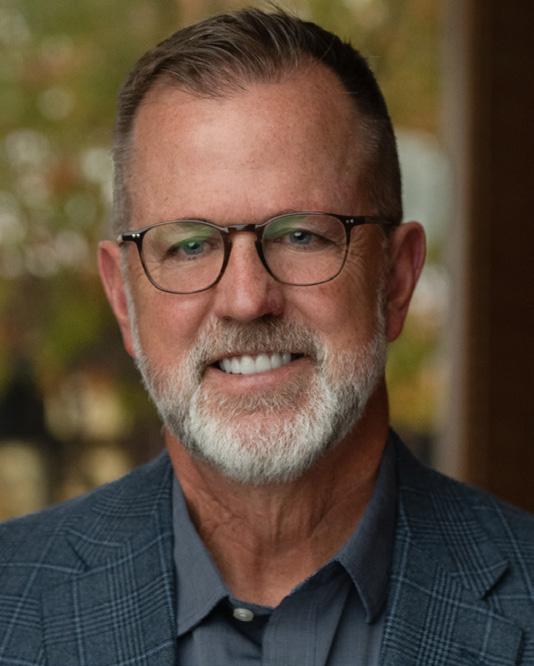
believes the northwest Arkansas and Little Rock markets hold their own with comparable and even larger markets in the region.
Arkansas may lack the volume of other startup hubs, both in terms of successful exits and the amount of investment capital generated, but one successful entrepreneur/investor/advocate
Becky Pittman and Emily Wineland began their careers in the nonprofit sector, where they shared the same professional challenge — raising money for their respective causes. The duo joined forces in 2022 and began building GoodChange to provide an easier way for political campaigns to raise money. The app debuted in 2023. They followed that up with SmartChange in 2024, an app targeting nonprofits in arenas other than politics.
“We are from the trenches of fundraising. That’s where we lived. We know all of the things that caused us heartburn, and we wanted to find ways to do it better. Just having that perspective is really valuable,” Pittman said. “On top of that, we really wanted to build something that was more than a processing tool. We wanted to build something that helped with engagement.”
The products allow fundraisers to create customized campaigns that streamline the donor experience, offering one-time, monthly and spare-change options, as well as a dashboard that helps donors manage their giving.
“You sign up on GoodChange or SmartChange, you register a debit card or any major credit card, and every time you spend mon-
Jeff Amerine, founder and managing director at Startup Junkie Consulting in Fayetteville, has witnessed firsthand the growth of the state’s overall ecosystem from its early stages. He works with investment groups in Arkansas, including Cadron Capital Partners, Gravity Ventures and the Ark Angel Alliance.
ey on that device, it is a virtual roundup to the even dollar,” Wineland said. “That way, we are not messing with your taxes. Your receipts and your credit card statements completely match. It is a virtual roundup, so it’s pennies every time.


“If I go to Boulevard Bread Co. and get a latte for $4.50, 50 cents is calculated, and it adds until the end of the week or $10, whichever happens later. When it hits that threshold, the pennies are added up, and a one-time charge goes to the cause you’re supporting, labeled immediately on your credit card as such.”
Despite neither Pittman nor Wineland having a background in technology, the company’s products have found an immediate foothold with the apps’ target clientele. The duo also earned Little Rockbased entrepreneurs entry into the Higher Ground Labs accelerator with GoodChange, which won an industry award for most innovative polytech startup.
— Dwain Hebda
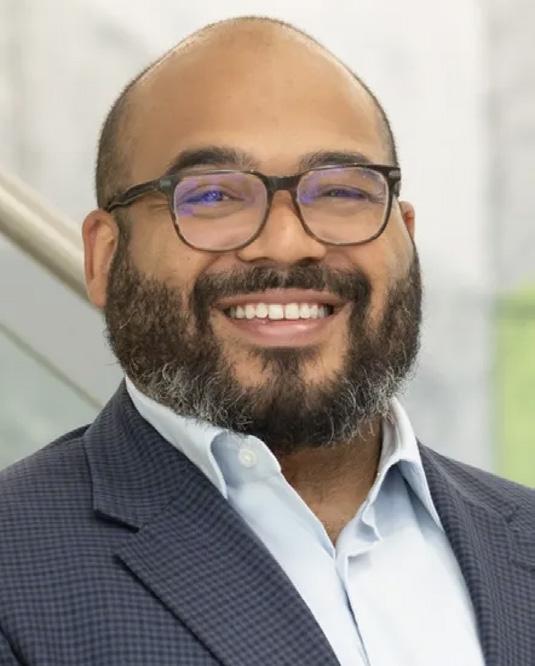
Chad Brown
“Northwest Arkansas competes favorably with anyone when it comes to resources available and support,” he said. “A ridiculously high percentage of entrepreneurs who come to participate in accelerators want to stay here in some way. For an MSA of our size, it’s hard for me to believe northwest Arkansas is not top 10 in the country [for startup ecosystems].
“Little Rock-Conway has real potential, especially as it relates to fintech, where it is world class.”
Investors of all stripes in Arkansas — angels, venture capitalists, microlenders — are no different than those anywhere else: They are looking for the smallest risks with the largest potential for returns on their investments.
Little Rock investor Chad Brown, vice president for private investment at the Circumference Group and managing partner of the Venture Center Arkansas Fund, said the job of startup founders is to convince investors that their ventures deliver limited risk and big ROI.
“There are a number of ways to derisk your startup in their eyes, including but not limited to having traction and customer validation, having a previous track record of success, having some unique or valuable intellectual property such as patents or expertise, and having other reputable investors,” he said. “For their ROI, you have to
clearly articulate the size of the opportunity that you’re going after and how much of that value you think you can capture. Then you have to weave a story about how a confluence of factors like market trends, regulatory changes, new technologies, etc., make the outcome that you’re describing inevitable and how you are uniquely positioned to capture it.”
For startup founders, raising money before launch can be the preferable approach.
“Once you’ve built your product and launched it, you have certainly eliminated some of the risk, but investors can also see how the market reacts and will anchor to that reality, and it’s very unlikely that you hit the ball out of the park on the
first try,” Brown said. “Whereas when you have nothing but a vision, they can only anchor to the immense potential that you outlined in the story that you told.”
The startups he encounters have a clear sense of their market, who their customers are and what immediate set of problems their venture solves, he added.
“They also have a plan to reach early adopters so they can learn and iterate from these initial customers to reach the next set of customers,” he said. “They have founders who are determined to see their company succeed.”
The most important thing for founders to bring to the table when making a pitch? Effective communication.
“Even the most complex solution should be able to be described to nontechnical investors,” Brown said. “Most individuals and organizations will not
“Little Rock-Conway has real potential, especially as it relates to fintech, where it is world class.”
— Jeff Amerine founder and managing director for Startup Junkie Consulting

Experts say the job of startup founders is to convince investors that their ventures deliver limited risk and big ROI.
necessarily be experts in your field, but they will need to be able to understand the business value proposition to make an investment.”
412 Angels is the angel investing wing of Endeavor Heartland in Bentonville. Director Quinn Robertson’s mission is to increase angel investments in the 412 corridor between NWA and Tulsa. He said he sees a few key traits shared by successful ventures: They are customer/problem oriented rather than solution oriented; their default is speed/action/learning rather than planning; and they have a team with unique insights and talents aligned to solving a specific problem.
The most important thing a founder can bring to the investors’ table, he said, is validation.
“It’s as simple as that. Early on, investors will want to see what effort the founder has put in to validate the urgency, magnitude and clarity of the problem statement, usually showing up as customer interviews and later on repeat customer use and happiness,” he said. “If revenue is starting to grow larger, what validation points suggest a repeatable and scalable way of getting new customers to continue growing? Everything points back to validation; it may just look different at various stages.”
When Amerine first got involved in the state’s startup ecosystem, it was at an embryonic stage, he said, but seeds were planted with organizations such as the private angel group Fund for Arkansas’ Future and Innovate Arkansas, a publicprivate partnership that supported earlystage tech startups. Following the success of homegrown startups such as Rockfish, RevUnit, Apptegy and even Slim Chickens, momentum was seized and “the coalition of the willing has grown,” he said.
“We’ve got the capital coming in, and as far as talent, we are seeing more entrepreneurs launching ventures here,” he said. “The state is now pretty well resourced. Overall, the resources, talent and funding in the state is a lot better.”
Still, Amerine estimated that Arkansas

Quinn Robertson
“Everything points back to validation; it may just look different at various stages.”
— Quinn Robertson director, 412 Angels of Endeavor Heartland
is at the end of the beginning stage of its startup ecosystem growth. The process is not an overnight one; he noted that what is now known as Silicon Valley started in 1946. The state just needs to expand the momentum to all 75 counties, he said.
Arkansas makes up for its small size with entrepreneurial DNA that can
compete with any place in the world, he added.
“We are open to collaboration, welcoming and genuinely want people to succeed,” he said. “People want to help you get to the next level. It’s our No. 1 strength. Try finding that in the mid-Atlantic states.”
Last March, Taylor Johnston’s world was turned upside down when her only child suffered kidney failure, necessitating a battery of medical tracking, from sodium, phosphorus and potassium to liquids, blood pressure, weight, temperature, symptoms, medications and more. The complexity of her son’s medical needs led her to seek an app to help manage the many details of his care. There were no such apps at the time.

“I couldn’t stop thinking about how this doesn’t exist,” she said. “I was joining Facebook groups and asking, ‘OK, everybody, what are we using to track all of this?’ Nobody had a good answer. There’s 15 apps for 15 different things, but none of them really do exactly what you need it to do.”
The situation led Johnston to design nutraRX to provide a comprehensive solution for caregivers, care providers and care recipients to manage complex medical situations. The app provides customized nutrition planning, live health tracking and tools for collaboration, making care management easier and improving health results.
“It’s a really great organizational tool for caregivers because the biggest burden emotionally is just trying to remember everything. If you miss one thing, it could put your loved one in a delicate situation,” she said. “In my son’s case, he goes everywhere with what I call his messy little notebook that tracks the 15 pills a day he has to take and the amount of sodium he was taking in if he has a slice of pizza at my mom’s house. What this does is organize everything to one space. It is like your one source of truth.”
The concept won the Delta Innovator contest and entry into a New York-based accelerator, which is helping fund the venture as Jonston recruits investors. She hopes to beta test nutraRX by this spring.
— Dwain Hebda
Innovation comes from Korea to Arkansas by way of Vegas
By Caleb Talley
At first glance, Arkansas and South Korea might seem like an unlikely pairing within the world’s innovation economy. Some contrasts are pretty evident — while Arkansas and all its natural beauty is roughly 15,000 square miles larger than South Korea, its Asian counterpart is home to nearly 49 million more residents packed into the bustling hub of advanced technology and manufacturing.
Despite the differences, a burgeoning collaboration between these two ecosystems is taking hold, creating exciting new opportunities on both sides of the globe. Over the past few years, the two regions separated by 6,900 miles have discovered a surprising synergy in which ecosystem leaders work to foster connections and deploy entrepreneurial initiatives that transcend geographic and cultural boundaries with a real shot at mutual success.

Startup Junkie, a Fayetteville-based entrepreneurial support organization, has been at the forefront of the international endeavor by connecting northwest Arkansas and Seoul through a series of initiatives that began in 2020. That collaborative work with Korean government trade stakeholders kicked off with an online test-bed program designed to facilitate cross-border collaboration.
Those efforts made it possible for Korean entrepreneurs to pursue opportunities with Arkansas enterprises and for Arkansas businesses to test out cutting-edge Korean technology and innovations. By establishing trust and delivering tangible opportunities for the folks in Seoul and northwest Arkansas, the

foundation for a bridge between the two ecosystems was laid.
Arkansas’ reputation in Korea as a legitimate place to do business has grown over the past few years. In fact, northwest Arkansas, in particular, has become a beachhead by which scalable Korean ventures might expand globally. Hoping to serve as that conduit, Startup Junkie hosted 15 Korean startups in Fayetteville last fall for a seven-week market expansion program in collaboration with the Korea Entrepreneurship Foundation. During their first-ever visit to Arkansas, the international entrepreneurs immersed themselves in the local entrepreneurial ecosystem. They were connected to regional enterprises, supported by local mentors and embraced by a community eager to collaborate.
More recently, Startup Junkie, in partnership with the Korea Trade-Investment Promotion Agency, connected a cohort of 20 Korean ventures with solutions in artificial intelligence, retail technology, logistics and health care with a number of Arkansas-based industry leaders for a series of virtual mentoring sessions. The entrepreneurs and mentors then came together in real life as part of a two-day marquee event held at the Consumer Electronics Show’s Eureka Park, where budding entrepreneurs showcased the latest innovation. Held in Las Vegas, CES is the world’s largest technology trade show.
Set against a backdrop of hundreds of trailblazing startups from every corner of the globe, the Korean entrepreneurs pitched their innovative solutions from a stage in the center of the expo floor to an audience of entrepreneurs, venture capitalists and government stakeholders.
“The initiative with KOTRA builds on the work we’ve been doing since 2020, facilitating market access for growth-stage and proven Korean startups through market testing and launch opportunities,” said Louis Diesel, Startup Junkie’s head of Asia.
Among the audience was a panel of judges curated by Startup Junkie and composed of industry leaders from diverse sectors, many of whom traveled from Arkansas to participate.
“The companies showcased were phenomenal, and they are so far ahead in terms of active, ready-to-use technology,” said Robert Shawn McGrew, founder of McGrew Solutions in Rogers.
McGrew is an Arkansas native and a local enterprise veteran.
“I had the privilege to serve as a judge during their pitching challenge and see 20 amazing companies ready to go to market in the U.S,” McGrew said. “Having served as a mentor in the northwest Arkansas ecosystem, I got to see some of the Korean companies I had previously mentored now showcasing on the world stage. Building relationships is key to getting anything done, and that’s what this was all about. Finding incredible ideas and solutions, bringing people and tech together, and having the ability to network with the right people —
Gyeongmin Kim, top, presents at CES Eureka Park, which drew entrepreneurs, investors, business leaders and media from across the globe.
those are keys to position our ecosystem with a vibrant future, and this was an opportunity to demonstrate that.”
The event not only showcased groundbreaking Korean technologies but also connected these innovations with enterprises poised to integrate and scale these solutions, and it solidified Arkansas as a gateway for global entrepreneurship.
Derek Laan, a senior manager at Intralink, is an American businessman who lives and works in Korea. His company works closely with organizations such as the Arkansas Economic Development Commission.
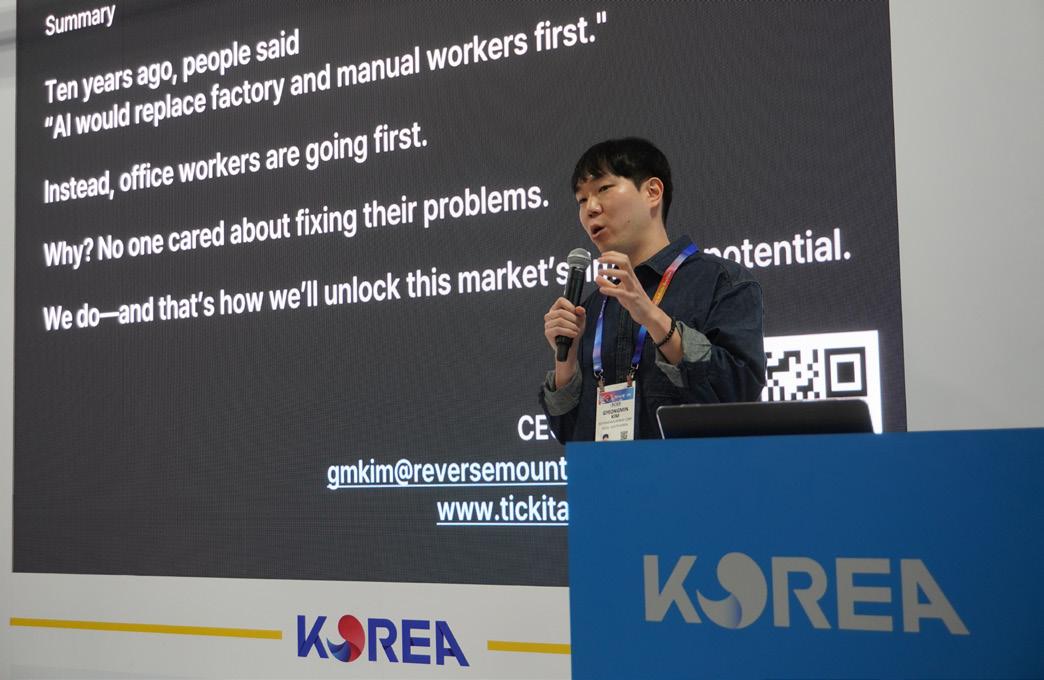
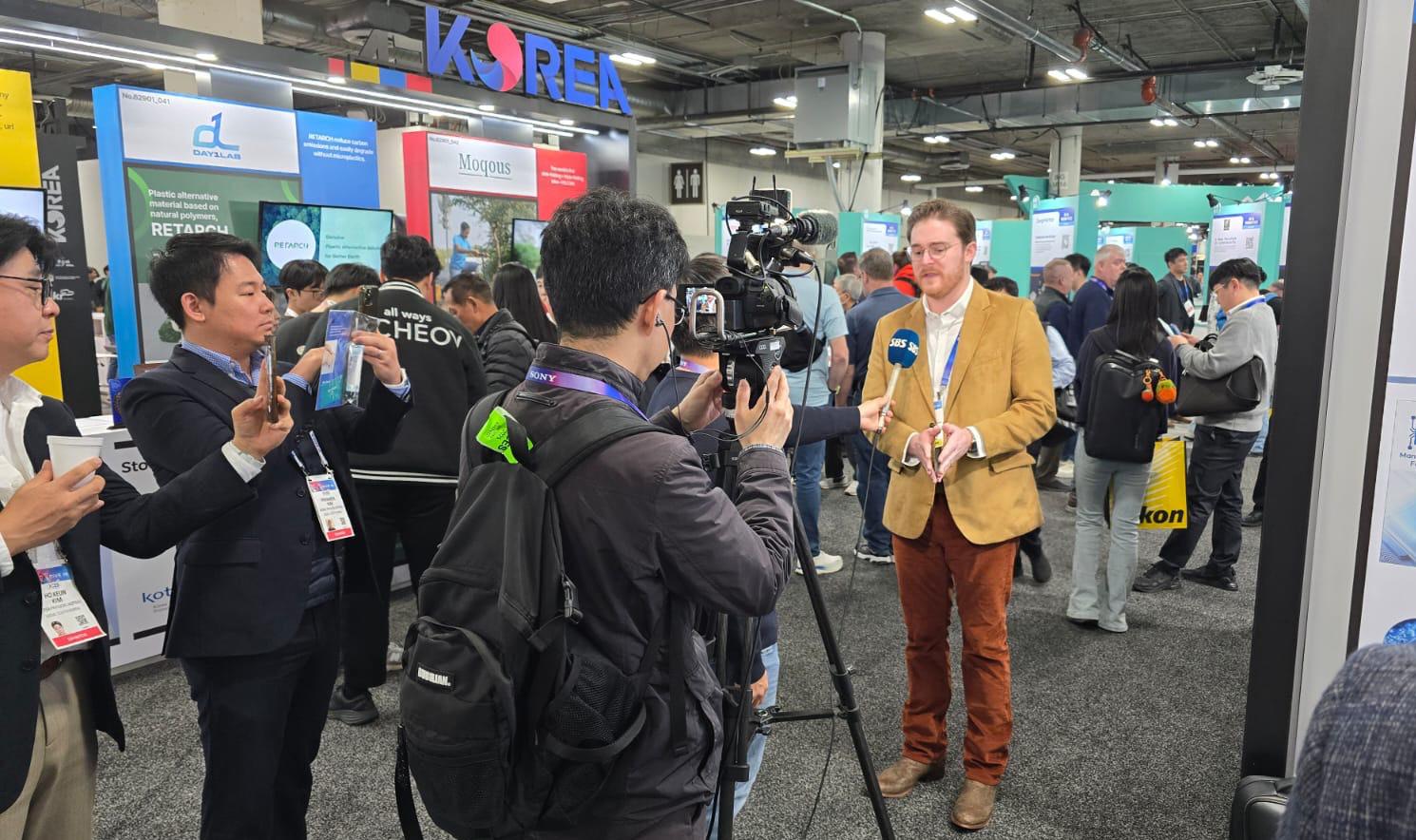
“It was an honor to be a part of the showcase,” Laan said. “As someone who typically helps western companies enter the Korean market, it was great to see some innovative Korean companies looking to enter the U.S. market and doing so through connections in Arkansas. The participating companies showed truly unique technologies, which have great applications. Arkansas stands to benefit in many ways from continued exchange and collaboration with these startups and vice versa.”
Why are the collaborations so significant? The benefits extend far beyond the impact to any one startup and create ripple effects that positively influence both ecosystems.
For Arkansas, the benefits of the partnership are compelling. Backed by a robust governmental focus on innovation and funding, Korea’s startups are often at the cutting edge of technology. With access to advanced manufacturing infrastructure, these compa-
nies have the resources to scale efficiently. By working with and opening the door for Korean ventures, Arkansas enterprises could potentially leverage that international competitive advantage to increase their own bottom line.
In turn, Korean ventures that enter the global market by way of Arkansas will be more likely to establish their U.S. presence in the Natural State, bringing world-class talent, creating new jobs and contributing to the local ecosystem.
For Korean startups, the connection opens new doors in the U.S. market.
While outside observers might wonder why a Korean innovator would choose Arkansas over the supposed obvious hubs of innovation on either coast, the Natural State offers unique advantages that those ecosystems can never replicate.
Of course, northwest Arkansas is home to decision makers for global giants such as Walmart, Tyson Foods and J.B. Hunt, as well as a myriad of satellite offices for all the major companies who work with them. The region, though, also enjoys a community-centered ecosystem in which entrepreneurs often have a level of access to mentors, resources and enterprise connections often out of reach in larger, more competitive startup hubs.
By leveraging Arkansas as a point of entry into the U.S. market, international ventures are able to establish a presence domestically, forge critical partnerships and tap into some of the country’s most influential enterprises.
Plus do not forget: The state once wooed Haeng-ung Lee, founder of the American Taekwondo Association, who moved to Arkansas because its hills reminded him of his Korean homeland.
The momentum of all the efforts are helping to redefine Arkansas’s position in the global entrepreneurial landscape and underscore its growing significance on an international stage. The state hosted a regional qualifier for the prestigious Startup World Cup, a global competition for $1 million led by Pegasus Tech Ventures in Silicon Valley, for the first time in 2024 and Arkansas has once again been tapped to play host in 2025. That opportunity was solidified by the work on the expo floor in Las Vegas.
“Having been a judge at the Korean pitch event at CES in Las Vegas, I was privileged to witness an incredibly high caliber group of ventures,” said Neda Blocho, director of the Startup World Cup. “It’s this level of quality that we look for when collaborating and aligning Startup World Cup with partners such as Startup Junkie. By helping to make the world smaller, we create more opportunities for everyone in the entrepreneurial ecosystem and elevate innovation on a global scale.”
In addition to bringing the competition back to Arkansas, Startup Junkie was selected to help bring the event to Seoul, a direct result of the collaboration at CES that only further deepens the connection between the two ecosystems.
“With this new partnership, we can further enhance these efforts by unlocking new funding and commercialization pathways, leveraging the resources and expertise of Pegasus Ventures,” Diesel said. “This collaboration is a win-win for all involved — providing startups with critical resources and opportunities, offering VCs access to highpotential innovations, and enabling enterprises to collaborate with cutting-edge solutions. It’s a significant step forward in fostering innovation and strengthening connections between Korean startups and the Arkansas-U.S. ecosystem.”
Who knows? With regional qualifiers slated for Arkansas and Seoul, there is a chance innovators from both ecosystems could end up sharing a stage in Silicon Valley, competing for a $1 million grand prize during the Startup World Cup finale as two entrepreneurial communities once separated by distance and culture reaching new heights together.
The bridge connecting Arkansas and South Korea’s venture ecosystems is still under construction, but the work done so far has already yielded significant results. The efforts are a testament to the power of entrepreneurial diplomacy and the potential it has to create lasting impacts.
With growing international collaboration, increased recognition on the global stage and strengthened ties between two unlikely partners, the future of innovation in Arkansas and South Korea is brighter than ever. As the world becomes more interconnected, such relationships will likely continue to shape the global entrepreneurial landscape.
The companies showcased were phenomenal, and they are so far ahead in terms of active, readyto-use technology.
— Robert Shawn McGrew, founder of McGrew Solutions
Perhaps the most exciting chapter of this story is just getting started. Whether in Fayetteville or Seoul, this partnership has the potential to redefine what is possible, proving that big ideas know no borders.
Caleb Talley is the executive director of the Startup Junkie Foundation in Fayetteville.

Growing up with her grandparents and two older brothers in Little Rock, Cie Kelly knew from the beginning that she wanted to be self-sufficient.
“I decided out of all of us that I wanted to make my own money and be able to provide for myself, so I birthed Souls Inc., which was a love of mine,” she said of her shoe customization company. “I love sneakers, so I decided, OK, this is something easy that I know how to do. Why not make money off it?”
By Sarah DeClerk
set students up for financial success.
Kelly became involved in JA again as a student at Parkview Arts & Science Magnet High School, where she participated in the JA Company Program through Young Entrepreneurial Scholars — or YES — Club, where she served as vice president and president. Her sophomore year, the club made Parkview fanny packs, and the following year, YES sold T-shirts through Parkview Drip, the company it created as part of the program. Kelly spoke at the JA Legacy Award Business Luncheon both years.
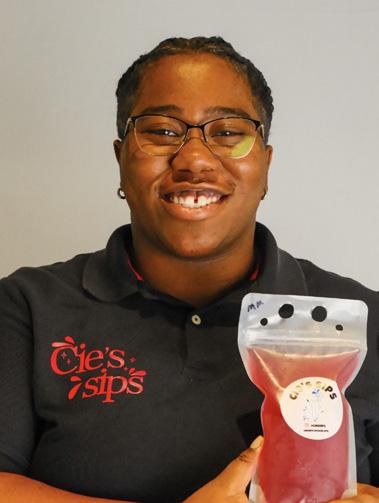
Cie Kelly
(Photo by Austin Sena)
She officially started the company at 13, but the seeds began germinating in second grade, when the entrepreneurial focus at Baker Elementary School in Little Rock allowed her to take an economics class and exposed her to Junior Achievement of Arkansas, a North Little Rock-based organization that works to
About that time, she also started another business, Sticks by Cie, for which she turned the tradition of decorating drumsticks in drumline into a lucrative trade when students from other schools saw her sticks and wanted her to make some for them.
Now pursuing a masters degree in project management at Trevecca Nazarene University in Nashville, Kelly began her most recent business, Cie’s Sips, at age 21 out of necessity.
“I exhausted all of my dining dollars at my college, and I spent most of my dining dollars, I found, on a lot of flavored beverages, so I said, ‘Why not make my own that would turn into a bigger quality?’” she said. “Then I just had a random op-
portunity. They were doing a student market, and I said, ‘Why not, you know, sell there?’”
The school then asked her to be a vendor at a music festival, she said, and the business was up and running. She added that she currently participates in a number of pop-ups and plans to invest in a drink trailer. She said she hopes she can one day open a brick and mortar or have the drinks sold at retail chains.
It is a gig she said she plans to remain involved in even after she graduates and enters the construction-management industry.
“I think it’s too good of a business to let go,” she said. “Even if I step into a different position within my business, I don’t think that I would let it go.”
She also mentors middle school and high school students remotely for JA of Arkansas, and after she graduates, she said, she plans to become active in JA of Middle Tennessee. She advised those considering starting a business to “mentally prepare but also go for it,” saying that entrepreneurship is both difficult and rewarding.

“It’s kind of like a flower in a sense,” she said. “You plant your flower, and you have to nurture it for so long until you can really see what it sprouts out to be, but when you’re able to see it, you see how beautiful it is, and you’re really able to see how much work you put into it, and you know, it’s just that ongoing task continually. Owning a business, it won’t be easy, but it’s also one of the greatest decisions a person will ever make.”
Kelly was not alone in learning how to make a business take root through a school-based program. Here are some programs at the high school and college levels that teach students about becoming entrepreneurs.
The JA Company Program provides students hands-on experience starting, managing and liquidating a student-led business. During the 13-week program, students navigate the process of bringing an idea to life and to the marketplace.
Antwanette Smith, program manager, said the JA Company Program was started by a group of businessmen in 1919 as an after-school program that allowed students to start and manage their own companies.
“We teach students the importance of identifying needs in their communities, whether it’s within their school or local area, and creating solutions that make a positive impact,” she said. “We also emphasize the value of making their products stand out from the competition by adding unique value. Above all, we empower students on the necessary steps to become entrepreneurs, helping them build the confidence and skills needed to bring their ideas to life.”
Maintaining student engagement is a top priority, she said, adding that the program connects classroom concepts with real-world experiences by allowing students to see their work beyond the classroom. Volunteer mentors provide guidance, encouragement and advice, and the program facilitates leader-
ship and collaboration through interactive activities such as budgeting and sales presentations.
“Most importantly, the students see the immediate impact of their efforts through the success of their companies, which generally inspires them to remain invested in their future outcomes,” Smith said.
Using volunteers who are local to each school helps build lasting bonds between students and the surrounding business community, Smith said, and the program has seen many participants who, like Kelly, have started successful businesses and gone on to become volunteer mentors with the program.
Smith added that she hopes to expand the program’s reach and impact by enhancing its community partnerships.
“We aim to create new career pathways for students, foster long-term engagement from our community partners and inspire entrepreneurship among student participants,” she said. “By achieving these objectives, we hope to prepare students for future success while creating lasting connections within the business community.”
Arkansas Capital Corp. supports burgeoning entrepreneurs through its Education to Develop & Grow Entrepreneurs Initiative and gives students a chance to shine at the Arkansas Governor’s Cup, a yearly collegiate business plan competition established in 2001.



Participants learn teamwork, critical thinking, problem solving, professional writing, persuasive communication and public speaking.
— Tiffany Henry vice president, Arkansas Capital
“The Governor’s Cup provides a handson, immersive learning experience that prepares students for the demands of entrepreneurship,” said Tiffany Henry, vice president, EDGE Initiative, at Arkansas Capital Corp. “Participants learn teamwork, critical thinking, problem solving, professional writing, persuasive communication and public speaking.”
Governor’s Cup participants have gone on to launch a number of successful ventures, including the hDrop hydration sensor; Bentonville software company Movista; Fayetteville taco joint Con Quesos; bike lock company Lockstop; and medical technology innovators Vascugenix, BiologicsMD, Lapovations and CelluDot, Henry added.
Teams compete for cash prizes in various divisions over three rounds of competition. The competition is open to undergraduate students from any Arkansas
institution of higher education, as well as graduate students. Last year, the competition expanded to include graduate students from contiguous states as part of Arkansas Capital Corp.’s strategic growth following its designation as a small business lending company, allowing it to expand services nationwide.
Notable winners from last year included Thinking CAPZ from Philander Smith University in Little Rock, the first team from a historically Black college or university to win first place at the Governor’s Cup; Arkansas Real Estate Media from the University of Central Arkansas in Conway, which launched a successful business now operating in central and northwest Arkansas; and ProPika from the University of Arkansas in Fayetteville, which was led by Nhiem Cao, who also won first place in 2011 for cycleWood Solutions.
Managing Director Jeff Standridge, from left, Carol Morris and Nadia Amidu participate in the 2023 Healthcare Innovation Sprint organized by the Conductor. (Photos provided by the Conductor)

“The Governor’s Cup is more than a competition; it’s a platform for innovation, collaboration and personal growth,” Henry said. “By connecting students, educators and industry leaders, it creates lasting impacts that benefit not just participants but the entire state of Arkansas.”
Arkansas Capital Corp. also hosts the annual EDGE Summit, which provides community leaders and faculty at various institutions of higher learning with resources, training and support for entrepreneurship education.
“The future of the Governor’s Cup involves increasing equity and access for students from under-resourced institutions,” she said. “Through initiatives like the EDGE Summit, ACC aims to build faculty capacity and foster collaboration across disciplines and regions. These efforts connect students and educators with Arkansas’ entrepreneurial ecosystem, ensuring broader participation and greater geographic diversity in the competition.”
The Conductor, a startup incubator in Conway, created the Healthcare Innovation Sprint in 2017. The four-day experience immerses college juniors, seniors and graduate students in the world of entrepreneurship and innovation through a medical lens in partnership with Arkansas IDeA Network of Biomedical Research Excellence in Little Rock and BioVentures at
the University of Arkansas for Medical Sciences in Little Rock.
“We start by introducing the students to the world of health care and health care innovation,” said Grace Rains, executive director of the Conductor. “They then identify problems that they hear throughout their experience talking to health care executives and providers. We refine those problem statements and identify qualitative and quantitate research to validate it.”
Students then visit Conway Regional Health System to complete “customer discovery,” further validating or invalidating the problems identified. After gathering necessary information, students work with mentors in health care and leadership from across the state to design solutions to the problems. On the final day, the students pitch their ideas to a panel of judges for a chance to win prize money.
“The Innovation Sprint provides a unique experience to be immersed in entrepreneurship and innovation and works through the process of developing a viable business idea,” Rains said. “That type of experience is valuable no matter where you go. Students also get the opportunity to meet and work with business leaders from across the state in health care and beyond, which is a fantastic networking opportunity.”
The Conductor also partners with the college of business at the University of Arkansas in Conway to provide speakers, workshops and panels for young entrepre-

neurs. Programs have included a panel of founders sharing their perspectives about entrepreneurship; a workshop about short-form content; and a pitch competition in which students share their ideas and compete for prize money, Rains said.
“My favorite part about the workshops we host is that we open it up to our small-business clients, as well, so we get to see the intersection between the business community and the students,” she said. “They both share and ask questions and network. It’s really a beautiful thing.”
Various students have attended the workshops while growing their side hustles, she said, most notably the aforementioned Arkansas REM, which was founded by UCA student Bo Cunningham.
She added that the Conductor works to impress upon students that entrepreneurship is a viable career path both now and into the future and that an innovative, entrepreneurial mindset centered on problem solving is important to any role.
“Employers are looking for innovative talent, so this type of education can benefit any student, no matter their future plans,” she said.
By Dwain Hebda
Like many organizations, professional associations have been under duress for members in recent years, even before COVID-19 and pandemic restrictions on gatherings and conventions cut membership in many groups substantially. According to Innovius Research, more than a third of professional associations surveyed reported flat or declining membership in 2019, and another 32 percent grew only marginally.
The pandemic did associations no favors, cutting membership and revenue, but recent statistics show things are looking up. A 2024 survey by Wipfli of 228 trade and professional associations showed 99 percent of those surveyed were optimistic about their financial viability, and 83 percent reported an improved financial position compared to five years ago.
“Our main challenge in the coming year is staying ahead of the rapidly changing economic environment and creating programming that stays relevant for each of our diverse members across the state.”
“There is a big generational difference in membership today,” she said. “We have adjusted the way in which we communicate with our members. For instance, younger generations, a lot of them don’t even email like older members did. We’ve had to look at different ways to connect with them, whether it’s text messaging or an online Facebook group to contact people and stay in touch with those younger members.”
— Candice Lawrence, executive director of Arkansas Economic Developers & Chamber Executives
Nearly three-quarters of associations reported increases in membership over 2023, and 62 percent reported improved retention rates.
The resurgence in association membership and engagement in programming are the result of efforts by these groups to reexamine their offerings for members, particularly as those offerings apply to attracting younger generations.
Stephanie Malone, CEO at the Arkansas Trial Lawyers Association, said acknowledging changes in the interests of different demographics within the 750-person membership has been key to the association’s success.
Malone said the same thought and consideration has been paid to member benefits. ATLA, made up of personal injury attorneys, has traditionally enjoyed the membership hook of providing mandatory continuing education and lobbying on behalf of the industry but, in recent times, has had to reevaluate the benefits it provides in order to remain competitive in attracting and retaining people.
“I think the biggest switch we’ve seen is how do we provide that continuing education, and what benefit do we give to our members?” she said. “We don’t offer free learning, for instance, because that’s part of how the association is funded, so to compete with the free learning that’s out there, we have had to be responsive. We offer a lot more online education to our members than we did pre-COVID-19 as a result.”
Technology has figured into those changes in a big way. While the ATLA still sponsors an annual convention, it has engaged in more webinars and other remote learning to meet members’ expectations.
“Sometimes you can’t get away from the office and spend 24 or 48 hours away from your office,” she said. “For that reason, we are doing a lot more online education and have cut back on in-person events.”
Katie Beck, CEO at the Arkansas Hospitality Association, said her group has adopted a more regional approach when it comes to gatherings, as opposed to a big annual convention, an approach touched off by COVID-19.
“That’s actually a trend that we saw within the association world. That kind of trade show model has started to phase out. That was even a little bit before COVID-19,” Beck said. “We’re always looking for new opportunities for new events and new ways to bring our membership together, and the trend right now is to move toward networking-based smaller events. We have different chapters set up throughout the state, and those chapters are really getting up and running with these. It’s such a great opportunity to go to each part of the state for those meetings.”
Beck said while face-to-face interaction among the 850-person membership is as important as ever, gatherings are taking a different approach than in the past. In May, the AHA will host its first statewide event since the pandemic, built around a format that is much different than the traditional conference-room-and-presentation format.
“Nothing replaces that in-person contact, and we’re really excited and looking forward to bringing that back,” she said. “We have an event coming up this May, and it’s actually the first time that we’ve been able to have an event like this since before COVID-19. It’s called Stars of the Industry, and it will recognize folks within the industry that are the true frontline workers. We have about 15 award categories, and we’re using them to highlight those who are in the industry every day, making the guest experience better.”
Such moves by the AHA and ATLA are in step with national trends. According to a 2023 white paper by Tronic, organizations that show a willingness to innovate programmatically reap the rewards of more members and member retention. The survey found 64 percent of Gen Z and millennials stated networking opportunities were among their top three reasons for joining an association, but networking did not have to always be in person. According to the survey, more than seven out of 10 associations experienced increased levels of engagement through sponsored online communities, which matters because those who enjoyed three or more high-value engagements through their membership were 100 percent likely to renew, the survey found.
Mastering the elements of engagement and participation is particularly important for groups made up of professionals who themselves work for organizations seeking to grow headcount and provide valued benefits, such as Arkansas Economic Developers & Chamber Executives.
“AEDCE members value relevant professional development, strong peer-to-peer networking and a powerful collective voice in matters affecting economic development and local business communities,” said Candice Lawrence,
executive director. “I regularly connect with our members to discover the challenges they’re facing and what resources they need. This allows AEDCE to tailor conferences, training programs and resource materials to the real-world issues economic developers and chamber executives are encountering.
“AEDCE is continuously engaging with its members and adapting our offerings to meet their changing needs, whether that’s through new training modules on emerging economic trends, expanded opportunities for professional networking or intensified advocacy efforts. Our commitment is to remain their go-to resource for driving economic vitality and community success throughout Arkansas.”
Lawrence said keeping up with the pace of change within the economic development arena is one challenge faced by the membership, and AEDCE works to help equip them accordingly to meet those goals.
“Our main challenge in the coming year is staying ahead of the rapidly changing economic environment and creating programming that stays relevant for each of our diverse members across the state,” she said. “We also keep a pulse on industry trends, such as shifts in workforce development, emerging technologies and best practices in community engagement, and translate those insights into timely seminars, workshops and online resources.
“An economic developer in Hope, Arkansas, may have different training needs than a chamber of commerce in northwest Arkansas, and we also have members who focus on supporting entrepreneurs. That said, at the core, all AEDCE members share a common goal — growing and cultivating thriving communities in Arkansas. By providing targeted training, advocacy and a supportive network, we hope to make their work just a bit easier.”


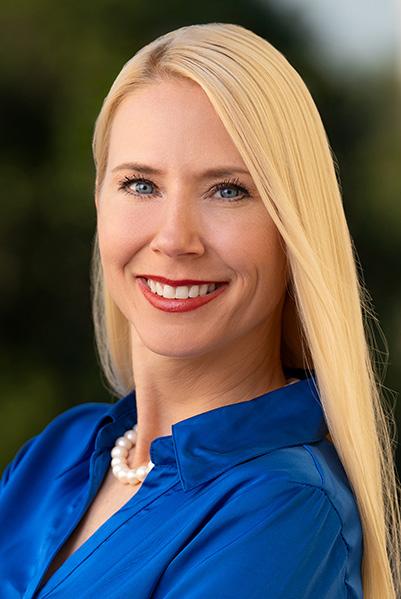

Professional associations bolster industries, invite community
By Alex Hardgrave
Whether he actually existed or not, the ancient Greek fabulist Aesop is credited with saying, “In union, there is strength.”
Professional associations in Arkansas bring just that to their members — strength in their fields and a sense of community along with it.
Most professional associations offer their members core benefits, including education on up-to-date policy information, advocacy at the state and local levels, and networking events to build community among members of the same fields.
In a post-COVID-19 world, many long-standing associations have experienced some changes in what it looks like to be a member, as well as large changes in their fields. Still, in the case of the Arkansas Bankers Association, for example, very few banks in the state are not members.
“It’s the right thing to do to support the industry,” ABA President and CEO Lorrie Trogden said.
Being one of the 177 members of the ABA comes with many membership benefits, and education is at the forefront. The association works to keep its members updated on quickly changing state and federal legislation.
“
While there are a lot of things that divide [members] competitively, there are many things that bring them together.
— Lorrie Trogden, ABA president & CEO
“They are right there on the front lines, living it every day,” she said.
Membership also provides bankers with chances to connect throughout the year at events such as an annual conference, an emerging leaders conference and a women in banking conference. During those networking meetings, members find they are all facing many of the same challenges and can discuss ways to overcome issues.
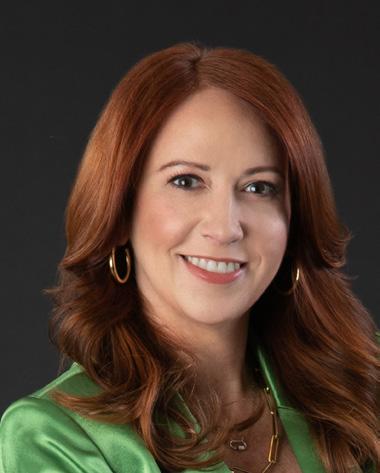
Lorrie Trogden (Photo by Ocken Phography)
“We’re one of the most heavily regulated industries, so it takes a lot of work to keep abreast with what’s going on,” Trogden said.
She added that it is the association’s job to advocate for policies that will serve its members’ clients the best. ABA listens to its association members about what policy changes are needed because the bankers are the ones who have to uphold new rules and regulations, Trogden said.
“While there are a lot of things that divide them competitively, there are many things that bring them together,” Trogden said.
She said being a member of ABA during the pandemic was very valuable because the association set up daily check-in calls with health department officials, state officials and anyone who could help her members better understand what was going on with the federal Paycheck Protection Program and other COVID-related programs.
Since the pandemic, there has been a return to in-person banking, Trogden said. Many people were ready to return to their local branches and use the services face to face.
The use of artificial intelligence in banking is something the ABA is monitoring closely for its members currently. Trodgen said AI can make many money scams easier, and the ABA is working to educate its members about that side of the new technology.
Trogden said the association’s primary mission is to eliminate pain points for all banks, not just those that are members of the association. The association is there to help bankers, who then, in turn, can provide good customer service to their customers.
Another prevalent association in the state is the Arkan-
The use of artificial intelligence in banking is something the ABA is monitoring closely for its members now. AI can make many money scams easier, and the ABA is working to educate its members about that side of the new technology.
sas Advanced Energy Association. The association has more than 100 companies and organizations as members, hailing not just from Arkansas but from around the world.
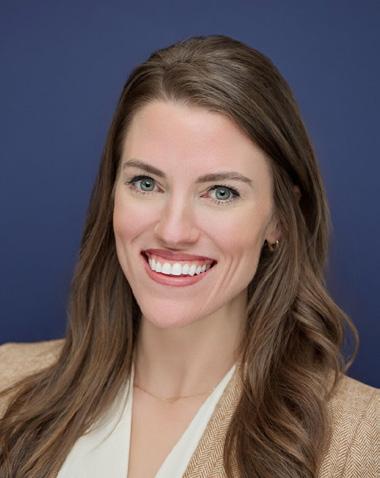

“We represent different sectors, from energy efficiency to energy developers to just consumers of energy,” said Lauren Waldrip, AAEA executive director.
The association offers different membership levels, including champion, leader, innovator, business, institutional and emerging leaders.
Emerging leaders members gain access to tools including a job board, a personalized mentor and opportunities to engage and shadow industry leaders and programs, as well as discounted fees for events.
The association has a foundation working in conjunction with it that operates as a 501(c)(3). The foundation focuses on workforce development, economic development, public education programs and research.
Waldrip said one change has been an uptick in municipalities joining the group to gain access to help with workforce development, grant opportunities and other resources the association can provide.
“The nature of our industry is very innovative, and so we do see some evolution as far as what our membership looks like based on a number of different things,” she said.
Those variables include emerging technologies such as electric vehicles, which offer new marketplace opportunities and new jobs. The association uses AI as a tool to increase efficiency in serving members.
The group has issued calls to action for policies to increase energy generation, promote innovation, enable markets to work and encourage responsible consumption.
“Sufficient resource planning is very important when you look at how we’re going to anticipate the growth of the energy demand that we have, as well as the economic opportunities that will come with that,” Waldrip said.
For its workforce programs, the organization wants to educate its members on how to use AI.
“We know that our workforce has to learn how to use it, maybe when it’s picking up false or old information, but ultimately, how can we increase efficiency by augmenting our human skills and capability?” she said.
Another quickly shifting sector is education. The Arkansas Association of Educational Administrators works to support its members through legislative representation, advocacy and professional learning opportunities.
The organization was incorporated in 1976 “with the goal of seeking continual improvement in the quality of education and educational leadership in Arkansas,” its website states.
“We’re helping ensure high standards of leadership,” executive director Mike Hernandez said. “People should become members to make sure they’re getting good professional development and keeping up with things that are relevant.”
Thirteen organizations operate under the association’s umbrella and represent different types of administrators within schools, such as elementary school principals, middle-level administrators and more.
Through networking at different events, schools can help each other create various initiatives to meet their education goals. Hernandez cited one school that was conducting a literacy program during spring events such as basketball games. Other schools learned about this through a member meeting and created similar activities.
Recently, the organization has been working to help its members implement policies such as those covered in the LEARNS Act. Hernandez said the organization works closely with its members to make sure they are following the new rules and also gives a place for practitioners to provide feedback on these changes.
“We’re usually on the forefront of getting that information to them,” he said. “You wouldn’t be left in the dark because of the vast amount of information that gets given on a regular basis.”
Hernandez said the organization has been able to keep its members more connected by offering more online and hybrid-model events, which means more people may be able to attend.
“Members are more engaged in the association,” Hernandez said.
While associations have to stay nimble to keep up with today’s fast-changing world, they remain as connected with their members as ever and continue their missions to educate members and advocate for the good of their prospective fields.
“My goal is to always be the ‘yes’ person,” Trogden said. “If [members] bring a problem to me, I will work day and night to solve it for them.”








Agricultural Council of Arkansas
American Academy of Family Physicians
American Academy of Pediatrics
American Association of Veterinary State Boards
American Institute of Architects
Arkansas Advanced Energy Association
Arkansas Asphalt Pavement Association
Arkansas Association of Educational Administrators
Arkansas Association of Nurse Anesthetists
Arkansas Automobile Dealers Association
Arkansas Bankers Association
Arkansas Broadcasters Association
Arkansas Cable Telecommunications Association
Arkansas Cattlemen's Association
Arkansas Community Colleges
Arkansas Credit Union Association
Arkansas District Export Council
Arkansas Economic Developers and Chamber Executives
Arkansas Education Association
Arkansas Environmental Federation
Arkansas Farm Bureau Federation
Arkansas Forestry Association/AFA Education Foundation
Arkansas Good Roads Foundation
Arkansas Health Care Association
Arkansas Homefurnishings Association
Arkansas Hospital Association
Arkansas Hospitality Association
Arkansas Land Title Association
Arkansas Manufactured Housing Association
Arkansas Medical Society
Arkansas Oil Marketers Association
Arkansas Optometric Association
Arkansas Pawnbrokers Association
To submit an association, email press@aymag.com.
Arkansas Pharmacists Association
Arkansas Pork Producers Association
Arkansas Press Association
Arkansas Public School Resource Center
Arkansas Ready Mixed Concrete Association
Arkansas REALTORS Association
Arkansas Residential Assisted Living Association
Arkansas Rice Federation
Arkansas School Boards Association
Arkansas Sheriffs Association
Arkansas Society of Certified Public Accountants
Arkansas Society of Professional Lobbyists
Arkansas State Chamber of Commerce/Associated Industries of Arkansas
Arkansas State Dental Association
Arkansas State Employees Association
Arkansas State Police Foundation
Arkansas Timber Producers Association
Arkansas Transit Association
Arkansas Trial Lawyers Association
Arkansas Trucking Association
Associated Builders and Contractors
Associated General Contractors of Arkansas
Association of Arkansas Counties
Beef Alliance
Global Ties Arkansas
Heart of Arkansas Travel Association
HomeCare Association of Arkansas
Independent Insurance Agents of Arkansas
Mortgage Bankers Association of Arkansas
National Electrical Contractors Association
National Guard Association of Arkansas
The Poultry Federation
Pulaski County Medical Society
April 3, 2025
Conway Expo Center



High schools in Central Arkansas are encouraged to register groups of students to attend. Homeschool students may register as individuals or in groups. Teachers, administrators, career coaches and parents are also welcome to attend!
Inspire the next generation of builders by showcasing your trade with hands-on activities. Electrical, plumbing, welding, HVAC, equipment, technology and all trades in between are welcome!
There are multiple levels of sponsorship to fit your needs. Show your company’s support of our initiative to highlight the endless opportunities in construction!
Experience the Future of Construction! Associated Builders & Contractors’ Build My Future Central Arkansas returns on April 3rd at the Conway Expo Center, offering high school students a unique, hands-on look into the construction industry. This immersive event features interactive exhibits, skilled trade demonstrations, and opportunities to connect with industry professionals. Whether exploring career paths or gaining real-world experience, students will discover the exciting possibilities in construction and skilled trades. Don’t miss out on this exciting opportunity! Register now at www.buildmyfuture-centralarkansas.com or email kmoore@abcark.org.

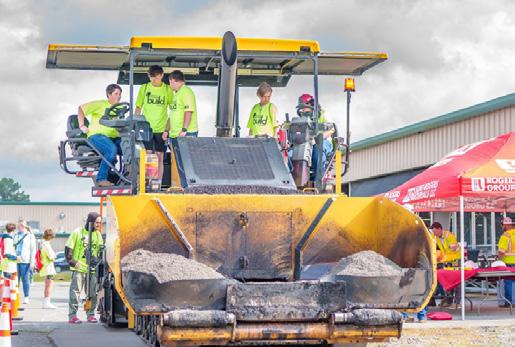
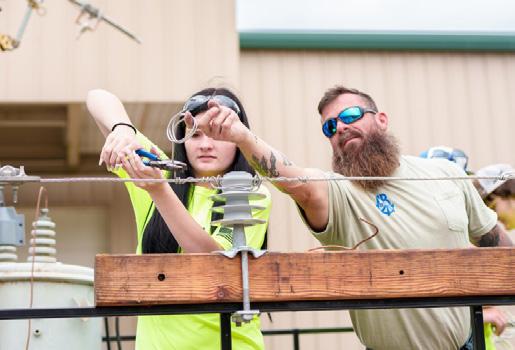

Associations shore up their sectors through recruitment, continuing education
By Sarah DeClerk
Professional organizations play an important role in ensuring the future of their industries. Not only do such groups impact workforce development by educating the public about their work and recruiting new blood to the field; professional associations also ensure members have access to continuing education and information about the latest best practices and industry trends. That is equally true whether that industry is building widgets or building, well, buildings.
“Workforce development is extremely important in our industry,”
said Bill Roachell, president of Associated Builders and Contractors of Arkansas. “We have a generation of folks who are going to be retiring soon, so we need to help fill that pipeline with new workers. Workforce development is something that we here at ABC focus on daily.”
The organization works with local high schools, homeschool students and colleges to recruit and train students for construction careers. Last year, the organization held the first Build My Future industry showcase, an event in central Arkansas that gave about 1,000 students an opportunity to complete hands-on activities with vendors, Roachell said.
“We help to facilitate recruitment by being the connection to the industry,” he added. “A lot of students graduate and need to make connections to help get their foot in the door, so through events like Build My Future,
“The AIA’s role in shaping the future of the architecture industry begins with fostering innovation, collaboration and professional growth among its members.
— Todd Welch
AIA Harding chapter president
we can help these young men and women meet the folks who do the hiring and recruitment for our ABC member companies. We play a very important role in connecting these students to the industry.”
Associations also help provide needed scholarship money to students. The Arkansas chapter of the American Institute of Architects last year endowed two scholarships — one at the University of Arkansas Fay Jones School of Architecture and Design in Fayetteville and one at Harding University in Searcy, said Todd Welch, chapter president.
“Our organization is very excited about these new endowments because we have offered smaller scholarships in the past, but we are very proud to have these scholarships so they will be there to help students for years to come,” he added.
The association also does its part to generate excitement about architecture among youngsters. Welch said the organization created a video for elementary school students that explained architecture in fun, understandable terms a couple years ago.
“We are always looking for new ways to get the word out to young people about what architects do and why they might find the field of architecture an excit-
ing profession,” he said. “We work with architecture schools in the state to increase awareness of the AIA and the architectural profession as a whole.”
In his field, he added, workforce development and continuing education are critical.
“Because of the nature of our profession and its impact on health, safety and [the] welfare of the public, workforce development is very important,” he said. “We, as architects, are held to certain standards of professionalism called the ‘standard of care,’ and with that responsibility, it is important that we develop our skills to better serve society as a whole.”



“ A lot of students graduate and need to make connections to help get their foot in the door, so through events like Build My Future, we can help these young men and women meet the folks who do the hiring and recruitment for our ABC member companies.
— Bill Roachell president of Associated Builders and Contractors of Arkansas
AIA members stay current on new technology, building codes and systems through programs such as Eat and Educate lunchtime lectures sponsored by vendors and product distributors, as well as classes and lectures during the annual state convention in October. The sessions provide learning units and health, safety and welfare credits that can be used to meet licensure requirements, and AIA requires members to receive 18 LUs and 12 HSWs each year.
“Our allied partnerships have such a wide variety of vendors and suppliers, mastering new technology is one of the many opportunities offered to our members,” Welch said. “Some of our allied members are software suppliers, for instance, and they offer members training in software that architects use, which are at the cutting edge of technological innovation in architecture.”
Establishing relationships with allied professionals is a valuable tool for architects, Welch said, and members, in turn, can contribute to industry advancement at the local, state and national levels.
“The AIA’s role in shaping the future of the architecture industry begins with fostering innovation, collaboration and professional growth among its members,” he said. “The association engages its members to actively develop resources, offer educational programs and advocate for policies that advance the profession. The various initiatives at the association’s core all come together to empower AIA members with the knowledge, resources and support they need to make a lasting impact on the built environment.”
ABC offers professional development
training, workforce-safety training, CPR and first aid training, VitalCog training, and apprenticeship training for various specialties, which Roachell said helps members learn new skills and stay up to date on safety certifications. In addition, the national association has partnerships with construction technology firms that help ABC members stay abreast of the latest in construction technology.
Roachell said the organization plans to eventually have a Mental Health Champion trained by ABC at no cost at every member company in Arkansas, in addition to adding more trades to its apprenticeship program and enhancing its professional development academies.



While association membership offers obvious professional benefits, such as training opportunities and useful connections, Roachell said a quote by Theodore Roosevelt makes the strongest case for joining a professional association: “Every man owes a part of his time and money to the business or industry in which he is engaged. No man has a moral right to withhold his support from an organization that is striving to improve conditions within his sphere.”
“We build the future by helping our members win work and then deliver that safely, ethically and profitability for the betterment of the communities in which they live and work,” Roachell said.


“I love — in this order — God, family, country, music, art, and what I really love is traveling.”


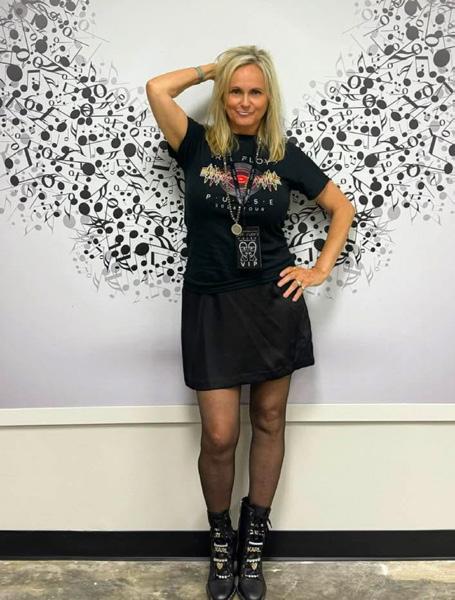

rkansas-based Slim Chickens is one of the fastest-growing chicken restaurant chains in the nation.
To that, co-founder Tom Gordon said “What took so long?”
Opened by Gordon and Greg Smart in Fayetteville in 2003, the chain, known for its fresh ingredients, multitude of sides, house-made sauces and southern ambiance, has more than 300 locations and many more in the works. The company posted a 30 percent growth rate in the past


Todd Traub
year. For perspective, the restaurant only had 23 locations in 2015, but between 2020 and 2023, it posted the kind of growth that can give wind burn, expanding by 70 percent during that stretch and opening 53 locations in 2023 alone.
“It doesn’t feel rapid to me,” Gordon said. “Twenty years — I feel like we’re way behind. It’s a common issue with entrepreneurs. You’re never quite satisfied.”
While strongest in Texas and Arkansas, Slim Chickens has locations in 34 states, as well as the United Kingdom, Germany, Turkey and even a spot at the Kuwait International Airport.
It may have seemed slow at first, but Slim Chickens has not only seen its growth accelerate; it does not see any signs of slowing.
Slim Chickens signed more than 150 deals in 2024 and opened 42 locations. It has a 2025 goal of another 150 signings and 50-plus openings, plus an eye toward expanding its Midwest and Northeast U.S. presence, as well as exploring the Canada and Mexico markets.
How did a chicken joint, when there were already several such restaurants with name recognition in the industry, explode over the past decade?
The answer can be found in a garage. By
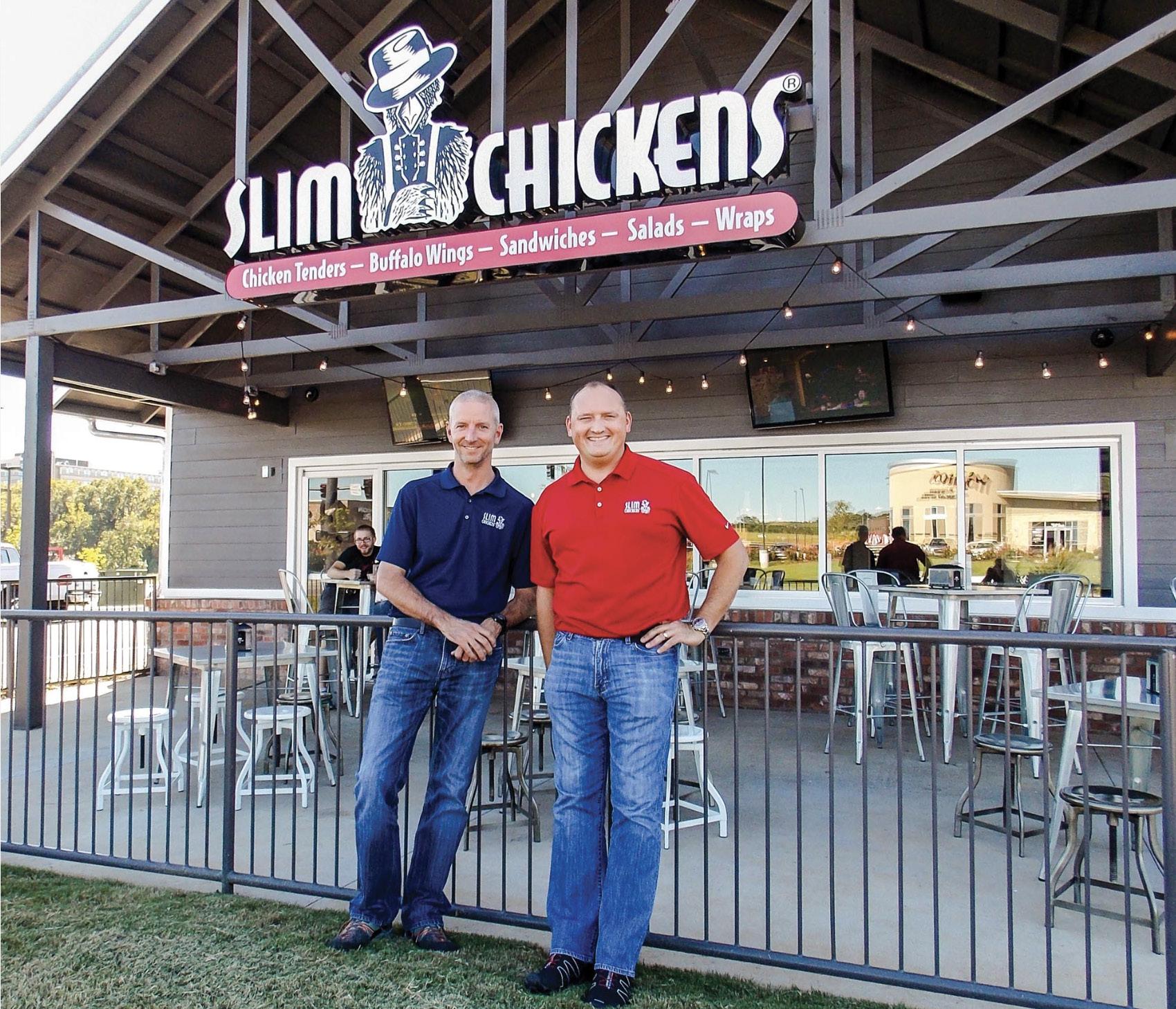
Gordon, 49, and Smart, 51, are friends who grew up near each other in west Little Rock, though they attended different schools.
“There was a big group of us that were friends in all those schools, and we stayed very tight and have been longtime best friends,” Gordon said.
Smart attended Catholic High School for Boys and went on to the University of Mississippi, while Gordon went to Little Rock Central High School and got his degree in finance at Texas Christian University in Fort Worth. Gordon gave the financial world a try but found it unsatisfying, so he returned to Little Rock and his first love, restaurants.
“I always worked in restaurants. I worked in Little Rock restaurants,” Gordon said. “Then I moved to California, and I worked in Los Angeles. When I was out there, [Smart] and I had lots of discussions. He had seen some brands that were like what he wanted to do here in northwest Arkansas. I had seen some things I wanted to do too.”
Gordon credited Smart for coming up with the basic concept that became Slim Chickens.
“It was kind of an idea in my head,” Smart said in a YouTube interview video filmed alongside Gordon.
After spending 1999 and 2000 in California, Gordon rejoined Smart, who had ended up in Fayetteville, and by then, both felt


they had the restaurant and retail experience to truly start a place of their own. They began to flesh out their restaurant ideas that would challenge the Zaxbys and Popeyes of the world.
“We’d seen some other brands that were playing in the chicken space, and we just felt like no one was doing it as good as it could be done,” Gordon said.
After all, it was not about what the others were doing so much as what Gordon and Smart wanted to do.
“We just believed that we could have a much more diverse menu without it being complicated,” Gordon said. “We believed we could appeal to a broader customer segment with the right menu.”
With the concept in place, the duo turned a residential garage into a testing ground and spent several months developing recipes and whipping together menu items they tried out on friends.
“There was a lot of months’ worth of work in between — recipes, test focus groups,” Smart said. “We call them focus groups now, but it was just in a garage with a turkey fryer.”
Gordon recalled the food testings going on for nights on end and people using score sheets to rate the items for flavor, quality and consistency.
“We got quality feedback and honest feedback from those that we trusted,” Gordon said. “It really drove the first iteration of the menu. The majority of what we derived out of those sessions is still the mainstay of the menu today.”
Finding an affordable and satisfactory location, which eventually turned out to be a former Sake Express in Fayetteville, was a major challenge.
“We didn’t have any money to really go buy anything or build anything, so we needed to find an existing building that had a drive-thru on it,” Smart said. “We kind of looked around and scouted as many locations as we could and just watched, and we finally found the one where we started on North College Avenue. This is it. Now we’re really doing it.”
”Everything from the Mardi Gras-inspired color scheme to the decor to the mascot to the name had to be figured out. With the clock ticking, it was Gordon’s mother, Jane, who came up with Slim Chickens, which Gordon relayed to Smart.
“As soon as I heard of it, I was like, ‘Yeah, that’s it. No discussion needed,’” Smart said.
The Slim Chickens’ ambiance is decidedly Southern, including music and decorations reflecting the Mississippi Delta region Smart experienced while attending Ole Miss. Gordon said they were looking for a comfortable feel that was slightly upscale yet appealed to a broad cross section.
“We wanted to try to look different,” Gordon said. “There’s a kind of a common color palette and scheme for a lot of restaurants.”
The first Slim Chickens opened Feb. 17, 2003, making a reality of the founders’ quest to produce a dining experience based on variety, presentation, fresh ingredients — especially fresh ingredients — and customer comfort and convenience.
Slim Chickens does not use frozen chicken and also uses fresh vegetables and fruits. That was established from the get-go, but despite its location in the booming northwest Arkansas corridor, it took the restaurant a little longer to become established as a franchise of note.
Gordon and Smart knew they had the menu, the broad appeal, a growing local population and a major college ecosystem to make their concept work. It just took a while for the expansion to accelerate.
“We did a store every year or two,” Gordon said. “In the first 10 years, I think we had 11 restaurants. In the second 10 years, we’ve built nearly 300 more. Once we were able to prove out the concept, that allowed us to hire the team, the
corporate team, and that allowed us to attract the quality franchises that we needed to build the brand across the United States and the world.”
Certainly, it is a concept that has caught on, and while customers may like the blues music, the souvenir jar that comes with some desserts and the up-to-date tech that adds convenience to the experience, it is still about the menu, ingredients and preparation.
“We cook everything to order,” Gordon said. “We cook it fresh. We make those dipping sauces fresh in the restaurants. There are processes we’ve deployed to better our systems because we’re across the United States, but our variety of menu, our variety of taste profiles in our dipping sauces and the way that we do things in the restaurants, while much higher quality in our opinion, it’s still fast and affordable for our guests.”
Slim Chickens’ mainstays are the tenders, wings, sandwiches and core dipping sauces, but the restaurant has added and played with other items, such as wraps, seasonal additions, and desserts that include the Oreo cheesecake or chocolate brownie pudding in a jar.
“The guests these days always love a good dessert option,” Gordon said.
Another pillar of Slim Chickens’ approach is its community service. While the company now has a worldwide presence, the founders still stress taking an interest in the local community.
With that in mind, Slim Chickens’ rarely says no to a fundraiser or charity, no matter how big or small Gordon said.
Last February, Slim Chickens partnered with No Kid Hungry, donating $1 for each heart-shaped waffle meal sold. It was a system-wide partnership, and total donations were projected to be more than $100,000.
“We tell our team, ‘When you get a request for charity involvement or donations,’ we say, ‘try to not ever say no.’ It may not be a cash donation. It might be a gift card. It might be a participation event. Who knows what it can be? We don’t want to say no. We want to say maybe. Let me understand what you’re trying to do, and maybe we can help.”
There is value in the local community and the customers who want to come to you, Gordon said, so there is nothing wrong and everything right with sharing success with the community and giving back.
“It’s only natural, and I think it’s something we should always do,” Gordon said.


By Andrew
Entering his 23rd season leading the Arkansas baseball program, Dave Van Horn had done his fair share of adapting to the times.
With the transfer portal and NIL now part of the equation, though, that is harder than ever for coaches of his generation. However, the 64-yearold has seen what’s unfolded across the country and has tried to get out ahead of a common criticism of his era.
Rather than keeping his pitchers and position players separate through the offseason, Van Horn told reporters that he had his strength and conditioning staff bring them together near the end of the fall semester and add a competition aspect to the workouts.
That all sounds like coach-speak, but the result is one emotionally scarred Arkansas fans will be glad to hear.
“I think it advanced us a little bit,” Van Horn said. “You see all that’s going on all over the country, you have teams that are super talented in other sports, it’s semiprofessional now — call it what it is — so I feel like our job as coaches is to find a way to develop these guys physically, but mentally we’ve got to find a way to get them to bond and care about each other and care about the University of Arkansas and the fans, and not just in and out of here. I don’t feel that way with this team. I feel this team, they’re on a mission.”
Money and the transfer portal can certainly help — just look at Ohio State’s $20 million football roster — but Dave Van Horn is more aware than ever of the team-building side of things.
He has navigated that aspect rather well so far,
even admitting in the past to being outbid for certain players and instead getting players who fit the culture.
Still, the Arkansas baseball program has not completely avoided criticism on that front. One local radio show host infamously went on a “rental player” rant in 2022, but that actually fueled a run to the College World Series semifinals in 2022.
Of course, that was the last time Arkansas made it to Omaha. The Razorbacks being knocked out of a home regional each of the last two seasons is a fact not lost on Van Horn, his staff or his players.
“There’s been some things go down the last couple of years at the end of the season that have been hard to swallow,” Van Horn said. “Honestly, behind closed doors, the coaches, we knew we weren’t maybe quite as good as we were ranked or whatever, but we were just finding ways to win. Credit to the players for that.
“This team wants to make sure we get to the end.”
— Dave Van Horn
This team wants to make sure we get to the end.”
They understand that expectations in Fayetteville are higher than just contending for conference titles and top-8 national seeds. Seeing six different SEC foes reach the mountain top over the last seven postseasons — with Arkansas coming agonizingly close to making it seven in seven — has only added to the desire for the Razorbacks to win their first national championship.
That journey officially gets underway with a four-game series against Washington State beginning Feb. 14, but three weeks of preseason practices, which started on Jan. 24, leading up to that date come first.
Feb. 14-17 — Washington State
* Feb. 21 — Kansas State – Arlington, Texas
*Feb. 22 — TCU – Arlington, Texas
*Feb. 23 — Michigan – Arlington, Texas
Feb. 25 — Grambling
Feb. 28-Mar. 2 — Charlotte
March 4-5 — ULM
March 7-9 — Portland
March 14-16 — at Ole Miss
March 18-19 — Oral Roberts
March 21-23 — South Carolina
March 25 — Missouri State
Mach 28-30 — at Vanderbilt
**April 1 — UAPB
April 4-6 — Missouri
April 8 — Arkansas State
April 11-13 — at Georgia
April 15 — UAPB
April 17-19 — Texas A&M
April 22-23 — Little Rock
April 25-27 — at Florida
April 29 — at Missouri St.
May 2-4 — Texas
May 9-11 — at LSU
May 15-17 — Tennessee
Home games in bold
* College Baseball Series at Globe Life Field
** at Dickey-Stephens Park in North Little Rock
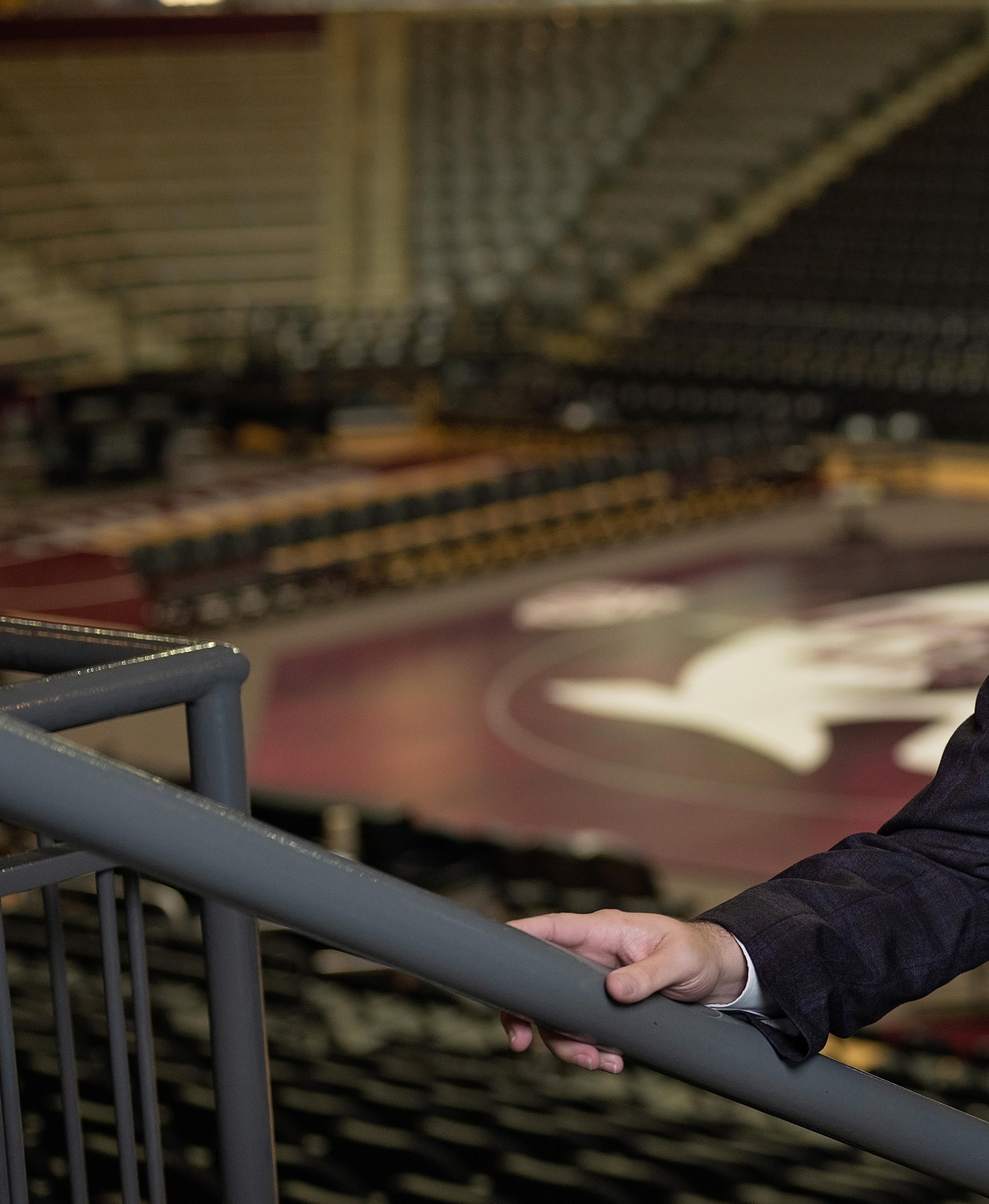
Little Rock ‘feels like home’ for new AD Frank Cuervo

Frank Cuervo was hired as the athletics director for the Little Rock Trojans last March, just as the program was in the throes of earning the Ohio Valley Conference Commissioner’s Cup for all sports.
In its second season in the OVC, Little Rock tied with Eastern Illinois for the athletics program in the 2023-2024 academic year, sparked by a regular season championship in men’s basketball and strong runs in baseball, golf, and indoor and outdoor track.
Cuervo previously served as deputy director of athletics and chief revenue officer at the University of Illinois at Chicago, a school with a similar profile to Little Rock: an urban school with no football program. Prior to UIC, the Florida native and former Gators baseball player served in senior administrative roles at the athletic departments at UAB, Missouri State, Indiana and Missouri.
As the Trojans look to defend their men’s hoops title and possibly repeat as OVC all-sports champions, Cuervo visited with Arkansas Money & Politics about why he chose Little Rock. In part one of the visit, the head Trojan discussed growing the fan base in a Razorback state, the “new normal” in college athletics, strengthening the school’s relationship to the community and more.
AMP: What attracted you to the Little Rock job?
Cuervo: There were a lot of things that really stood out. You’ve got a great place in Little Rock. The market is great. You’ve got a population center that really cares not only about sports but about this university. Anytime you have that, you’ve got a chance to be successful. When I came here, the more I started researching the opportunity, I could see that you had people who wanted to invest in our success. All those factors and more just made it a really appealing opportunity for me and my family. Over the course of the last 10 months, we’ve just really fallen in love with it. The family’s comfortable here. They love it. Everybody’s been so warm and welcoming. It’s been better than we could have imagined, and this is really getting back to home region for us. My wife’s family is all from Missouri. We were at Missouri State for about five years, so this is kind of home for us, and then we lived in Birmingham for about five years. I think Birmingham and Little Rock have a lot in common — just similar size, similar feel — so this is really more like home for us.
AMP: Is college athletics administration like the military in the number of stops one might make over the course of a career?
Cuervo: It’s not quite as transient a business as coaching or the military, for that matter, but it can be in some ways. My son, Nathan, will be 12 this summer, and we’ve tried to make it a family affair. You’ll see him running around here and there on campus, being active and getting to know our student athletes and coaches. My wife, Michelle, is up here. She helped run our annual fundraiser, SpectacUALR, in November, so it’s a family effort for us.
AMP: In a state where the Razorbacks dominate media coverage, where does Little Rock athletics fit in?
Cuervo: You have to fight a little bit to carve out your own niche and develop a following, but having an SEC team in the state certainly gives college sports on the whole a high profile. You have individuals who are predisposed to have a team and want to go
to games and want to be an active participant in it. For us, living in the capital city with the state’s main population center, I think that creates some advantages for us. On a garden variety Wednesday night, if you want to watch college basketball, driving 2 1/2 hours each way to get to Fayetteville, that’s a high level of fan to do that.
We’ve got high-end Division 1 basketball right here. We’re playing for the same trophy at the end of the year. We know that there are folks who have an affiliation with the Razorbacks, and that’s fine. We think that there’s room for multiple allegiances. The ability to support the hometown team right here in Little Rock is really what we try to drive home with fans.
AMP: These days, the elephant in the locker room, so to speak, is the dawn of NIL and the transfer portal, both of which have brought profound changes to college sports. How have they changed the role of AD?
Cuervo: The job definitely has changed. The whole enterprise of college athletics is different now. There probably hasn’t been this much change in the industry since the advent of Title IX. That certainly led to some really good things and the strengthening of college athletics as an enterprise overall, so I think there’s certainly that opportunity here. The main difference is that it has become the professionalization of college sports, and some folks don’t necessarily like that direction that it’s headed. I understand that.
For us to be able to compete and to represent the university and bring pride and distinction back to the area, we have to really embrace what college sports has become, find how we can compete, what our unique selling points are to student athletes and their families to come here as opposed to somewhere else, and try to use some of those new rules and regulations to our advantage. It’s definitely the new normal. The past isn’t coming back, so it’s our charge to figure out how to compete and excel given the new parameters.
AMP: Regarding paying athletes and transfer rules, will the pendulum finally start to swing back a little?
Cuervo: For decades, there was such a reticence to change, and the establishment held the line for so long, and then all of a sudden, that dam broke. There was just this wild overcorrection to the other side, where there are very few guardrails or parameters put in place. What I’m hopeful for and what I would expect over the coming months — and it may even be over the coming years — is that the tide starts to come back to the middle a little bit, we put in some sensible rules that help standardize and make it a more unified and fair game, but college sports still has a number of the characteristics that made people come to love it.
AMP: In your experience, are NIL payments causing friction among student-athletes?
Cuervo: I think the interesting thing to remember is that it’s the 1/10 of 1 percent of situations where you hear about Carson Beck at Georgia driving a $300,000 Lamborghini or the quarterback at Tennessee getting $8 million to go to school there. In most cases, the overwhelming lion’s share of the cases, that’s not the case. For many athletes, NIL simply bridges the gap where a partial athletic scholarship ends. The way I look at it is that those NIL payments are really extensions of the scholarship. I understand why those high-profile cases make the news, but in 99 out of 100 cases, that’s not really how it is.

AMP: Will the Power 4 conferences ever break away from the NCAA, at least for football?
Cuervo: You may very well see the autonomy of four conferences develop something that looks different from what the landscape is right now. I don’t necessarily think that’s a bad thing. Even if you look within those conferences, there’s a big difference between what Alabama and Tennessee look like as opposed to Mississippi and Mississippi State, so there’s a stratification even within power conferences where schools look very different.
I think what you’ll see is that there likely will be something that looks different in college football, but the NCAA [basketball] tournament has become such a unique part of the sports landscape in America that you’ll still have a tournament that looks similar to what it does now. There’s still a place for the NCAA and the championships that they put on that are uniquely American. In other countries, they don’t marry education and sports nearly this closely. I’m optimistic that there’ll be a new normal, but it will still resemble and hold some of the same values of the traditional system.
There was just this wild overcorrection to the other side, where there are very few guardrails or parameters put in place.
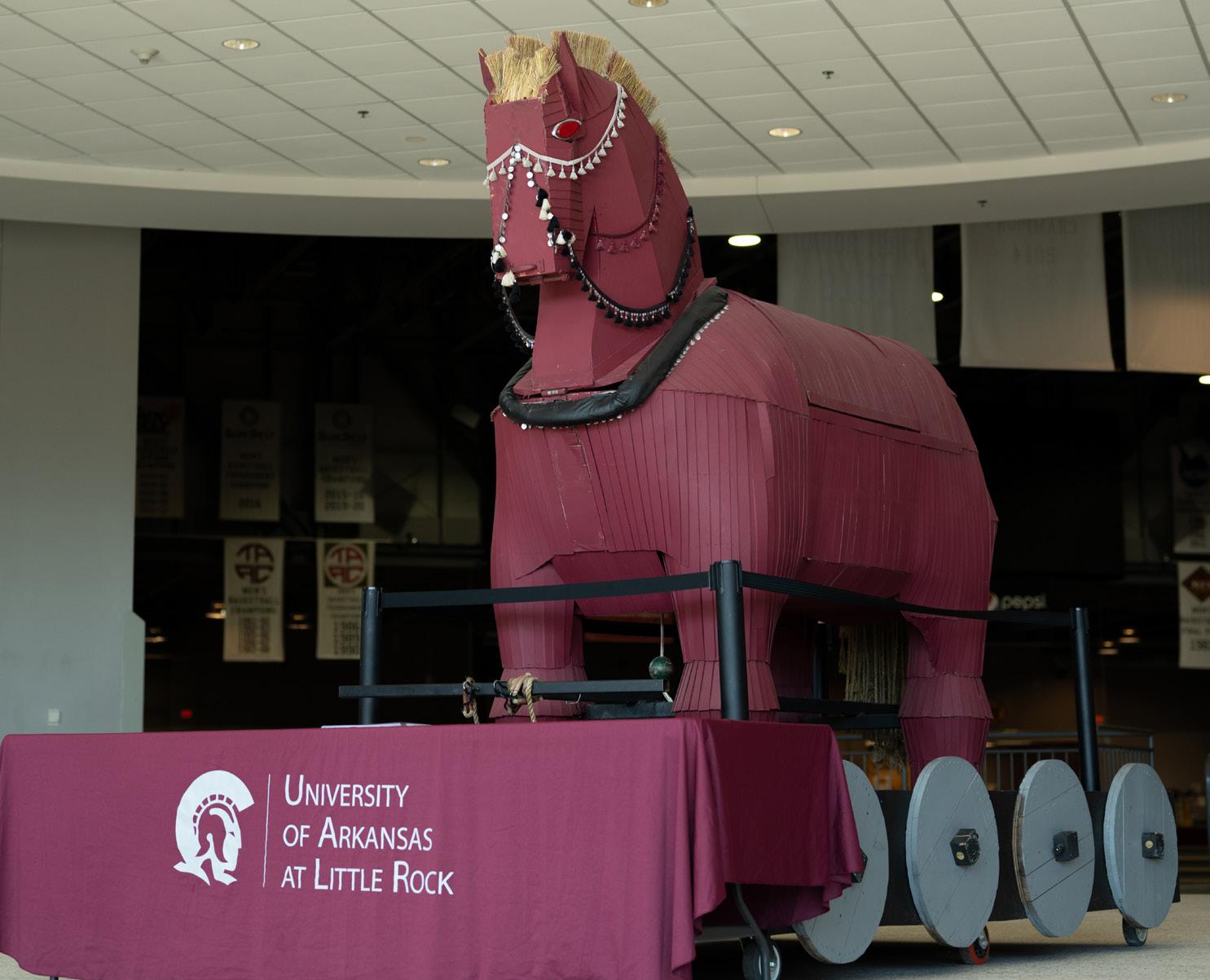

AMP: Little Rock was a member of the Sun Belt Conference for decades. Is the OVC a long-term fit?
Cuervo: We love being in the Ohio Valley Conference. It’s a good league. We have good peers, the conference staff is great, but we would be foolish if we weren’t always monitoring the landscape to see how things are changing. I think as dominoes fall and situations unfold, you always have to have your head up and look for where there may be an opportunity, but certainly at this time, we’re happy to be in the OVC. It makes sense for us in a lot of ways. Our performance over the first two-plus years has validated it. We can compete at a really high level. If you look across the league at the finances and budgets, we’re investing in college athletics right at the top of the OVC, even when you compare our budget to schools in the league that have football.
AMP: Trojan athletes have not only been excelling in the classroom but have been active in the community. Take a second to brag on your athletes.
Cuervo: They’re getting things done at a very high level. Not only do they compete at the highest level on the field, on the court, or on the course or track, but we have great student athletes who are doing incredible things from an academic standpoint. We’ve had 23 semesters in a row of a 3.0 or better GPA among all athletes. We just finished a term, in fall of 2024, where we had over a 3.4 grade point average, so they’re doing great things from an academic standpoint.
AMP: Were you surprised by the level of support locally for Trojan athletics?
Cuervo: Being able to see the depth to which people really care about UA Little Rock and Trojan athletics has been heartening. Anytime you’ve got a situation where there’s a critical mass of people and they’ve got the means and motivation to impact your success and they want to find opportunities to be a part of your program, you’ve got a shot to accomplish some really special things. There’s a great partnership between the university and the community to help advance our overall position.
We want to be in a position to pour back into the community in which we live, the central Arkansas region, by being active and being visible and by having our student athletes volunteer in schools and in other places where we can make an impact. I think that’s important. You’ve got to have a strong reciprocal relationship with the community in which you live and work, and we want to be able to find ways in which we can add value and make Trojan athletics a significant part of the community.
The main thing for us is that we want to find opportunities to be able to partner with the community and create a strong athletics program that supports a strong university. Having a strong university, we believe, is the best way to have a thriving Little Rock. We have a number of ways in which we want to do that. It will require our supporters being willing to partner with us, but I’m confident that from everything I’ve seen in my time here that we’ve got an opportunity to do some really special things with some great people in our corner.







For more than five decades, Cathy Owen has broken new ground for women in banking
By Dwain Hebda
Of all the career accomplishments and community service accolades Cathy Owen has piled up over five remarkable decades in banking, one of the most enduring of her contributions is also one of the most personal.
The USS Hoga tugboat, a piece of Navy history that is part of the Arkansas Inland Maritime Museum in North Little Rock, has nothing to do with banking and very little backstory with the Natural State — that is, until Owen was recruited to help rescue the decaying craft from its tether in a California bay where it was slated for dismemberment.
“I’ve been involved with many community projects, and that one that still grabs my heartstrings,” she said. “There were 10 of us who worked for years on raising funds to get the USS Hoga to the Arkansas Inland Maritime Museum. I happened to be chairman of the North Little Rock Chamber of Commerce at that point in time, and Mayor [Patrick Henry] Hays began to tell me about the USS Hoga and wanted to know if I would fly out to San Francisco to see her and to see if there was anything we could do to try to get her back to Arkansas.”
Owen agreed to the request and still remembers the sight of the rusty little tugboat sitting among larger, hulking ships.
“As big as she is sitting over there [in North Little Rock], she was this tiny thing in that shipyard,” she said. “Knowing her history and seeing her, basically, a rust bucket, it was just pitiful. They even told us at one point that if she wasn’t rescued, she was going to be cut up in the shipyard. I felt like she still had a life yet to go.”
If Owen’s fervor over the vessel and its story of being snatched from under the cutting torch feels like something more than patriotism, that is because it is. Tugboats are the unsung, often overlooked heroes of the maritime world. Small in stature and lacking the brawn of battleships and tankers, they are nonetheless endowed with power enough to maneuver the behemoths, be it into harbor or out of harm’s way. Time and again, tugs have sailed into the thick of things, and Hoga was no exception, have rescued
“My first job in banking was a shred clerk, shredding old files. The bank president at that point in time really didn’t want this 16-year-old at the bank. In fact, he told me so the first day I was there. He told me, ‘I don’t want you here. I have no desire to babysit you. I don’t want any kids here born with a silver spoon in their mouth.’ Then he put me in that closet to shred the work, probably thinking I’d quit. I looked at him, and I thought, ‘He doesn’t know me at all.’ He thought because my dad chartered the bank that I was some rich kid who was just going to hang around and do nothing all summer. I just listened to him, and I thought, OK, I can prove him right by walking out and going home and telling Daddy, or I can say, ‘Yes, sir,’ and I can prove him wrong and show him something else. The next day, I beat him to the office and was there waiting on him, and by the end of the summer, he’d approach me and ask if I could come back over Christmas break. Little did I know that one decision of mine would turn out to be one of the biggest decisions of my life.”
sailors, fighting fires and moved other ships to safety during the Pearl Harbor attack. Small though it was, it had resolve and courage several times its size.
As a trailblazing woman in the almost exclusively male salon of banking for the past 50 years — and a physically diminutive one, at that — Owen can wholeheartedly relate. She knows what it feels like to have the big boys question her usefulness and mettle, sometimes to her face, sometimes chortled behind her back. She also knew the engine she was born with and the drive to keep chugging, keep pushing, that was fine-tuned by the people around her growing up.
“I think a lot of it came from two aspects,” she said. “One, I have two brothers, an older one and a younger one. If I was going to participate growing up — if I was going to ride that dirt bike or motorcycle or if I was going to drive an 18-wheeler or a backhoe — I had to learn to speak up and adopt the mindset, ‘I want to learn to do that. Why can’t I get out there and do that?’
“Also, my father never discriminated among the three of us. That is, if I was interested, and even sometimes if I wasn’t interested, he would encourage me to learn and be a part of whatever they were doing. That always exposed me to the same opportunities that they had. He always encouraged me and told me I can do those things. I can be there.”
That said, Owen had no intentions growing up of going into banking as a career, envisioning herself in a more artforward pursuit such as architecture. Her first job in a bank, a summer gig taken
begrudgingly as a teenager at the urging of her father, did not fully change her mind but did reveal something about her pragmatism — banking jobs being indoor, air-conditioned work — and her hunger to learn.
“At that point in time, I want to say the bank closed at 3 o’clock in the afternoon, and the bank had to be balanced to the penny every day,” she said. “It was all done on calculators and these huge journal pages that were handwritten, and they were running tapes and this and that. When I finished my job every day, I asked if I could just stay and listen. After a couple of weeks, they handed me a stack of stuff to add up.
“I was very lucky that I came into banking at a time that things were done manually. There wasn’t a computer to put stuff into. You had to really learn and be able to think through what you were doing and be able to apply yourself. Also, working in the summers, I was trained for different people’s positions all over this small community bank.”
Owen attended college at the University of Arkansas in Fayetteville, where she abandoned the idea of architecture in favor of a degree in finance and banking. She followed that up with a degree from Southwest Graduate School of Banking at Southern Methodist University in Dallas. Then she came home to central Arkansas and the bank her father chartered, which eventually became Eagle Bank & Trust.
In addition to the usual nuts and bolts of banking and finance management, her educational years also prepared her for
the work environment she was entering, since both the classroom and the boardroom were almost entirely male territory.
“I believe that situation made me more focused on, ‘Let me show you that I can do this, that I can be successful and I deserve a seat at the table,’” she said. “For many years, attending banking conferences, especially if it was leadership, CEO meetings, my husband would be with me, and inevitably, people would walk up to him and say, ‘How big is your bank? Where’s your bank? Yada, yada, yada.’
“I have a wonderful husband, and he started something that worked really, really well. He just looked at them and said, ‘Oh, I’m the eye candy. You have to talk to her about the banking.’ It kind of broke the ice in a friendly way.”
Owen was thrust into a leadership role early when the bank president died unexpectedly and she, fresh out of college, was asked to take on the role of running the bank.
“You have to be careful because you want to be accepted,” she said. “Sometimes the men I worked with couldn’t care less, and sometimes they’d look at you like, ‘Oh, yeah, we’ll see.’ I always looked for friendly ways to break the ice while still letting them know a serious point at the same time. I always approached things like, just give me the opportunity or let me take the opportunity, and I’m going to run with it.”
As if her mere presence alone was not sufficiently challenging enough to the status quo, Owen became known for pushing the envelope in bank operations, particularly when it came to adopting technology.
“I was the first one to have a PC in the
bank,” she said. “You probably remember those huge monitors, right? You had to have a four-wheeler to carry it and a forklift to get it on your desk. I remember them carrying it into the bank, and people were like, ‘What in the world? What are you going to do with that?’”
Of course, Owen proved to be on the right side of history when it came to technology as lumbering PCs gave way to sleek smartphones and web-based banking, each development of which brought its own challenges concerning privacy and security.
“It’s very difficult today, especially for smaller community banks,” she said. “There’s a whole other security element today we didn’t used to have to deal with. We’re liable for our third-party vendors, so now banks have to have a whole vendor-management program. It has absolutely taken on a life of its own.”
In the late 1980s and through the 1990s, Owen enjoyed success growing the small, Main Street institution, something that proved to be as satisfying for shareholders as it was appetizing for bigger fish seeking to gobble it up via acquisition.
“Fifteen or 20 years ago, I’d receive regular calls: ‘Are you interested in selling? Are you interested in merging?’ Occasionally, I still get one here and there, but I think I’ve established my role enough now that people know I’m staying and we’re not interested in going anywhere,” she said Owen not only showed the backbone to rebuff such advances; she was also pretty good at the game herself, demonstrating a keen eye for opportunities to grow by acquisition. Eagle Bank & Trust’s parent
“If you’re going to be a leader in any organization, if you’re going to rise to the top, you’ve got to understand it’s not 8 to 5. It’s not Monday through Friday. There’s lots of other demands. There’s lots of chamber banquets to go to. There are just other elements of the job that encroach on personal time. I think young people coming out of college today, and we’re talking in broad terms, think they know everything. A title is very important to them. It’s often harder to get them to realize there are things they don’t know and how important it is to earn your respect from within the organization. What I’ve often tried to teach other women is don’t speak for the sake of speaking. Your words need to matter. It’s important to speak up, but it’s important what you say, also. It’s a rare few, and they’re usually pretty easy to pick out, who get that, who are really interested in learning and growing and willing to work hard and take on more and be exposed to more things.”
“I don’t know that women are the best at promoting themselves or asking for a position. Typically, women expect someone to come up and tap them on the shoulder and say, ‘Oh, would you like to chair? Would you like to be on the executive committee?’ rather than saying to the executive committee, ‘I’m really interested in stepping into your shoes. How do I get there?’ I think what handicaps a lot of women is they feel like if they’re doing a really good job, their time will come, and someone’s going to nominate them or ask them to serve when often, if they’re doing a really good job, leadership wants to keep them doing that really good job and may not even realize their interest or their desires. I’ve always encouraged young women — and men — if there’s a position you want, let me know. As a leader, I can’t read your mind, as much as I’d like to think I can, so speak up.”
State Holding Company, which Owen has helmed since 1984, purchased Heber Springs State Bank that same year. It was a deal that had all the drama of a John Grisham novel, as Owen tells it. With regulators beating a path to Arkansas, bent on shuttering the Heber Springs institution, time was of the essence.
“I became aware that the Heber Springs State Bank was about to be closed by regulators, and at that point, when they were going to close you, they spent the night before in another town,” she said. “They had their chain of cars, and they would drive into town the next morning and close the bank. Well, I had learned about this, and I had my private pilot’s license at that point. I flew there, made some calls, got a meeting with [bank ownership] and made a deal to purchase the bank.
“Flew back to Little Rock, picked up my dad and our attorney, then flew back to Heber Springs, where we met the thenowner of the bank, who the regulators were forcing out. We inked the deal on the tail wing of the plane and called the bank to have someone come pick us up. Drove there, gathered all the employees upstairs in the office and spoke to them,

“Everybody needs at least one person that’ll be 100 percent honest with them, and when you have that, you’ve got to be willing to listen and consider what they’re saying to you. Being raised with brothers, I always had that, and I still have that today. We sit on each other’s boards, and they’re also my sounding boards. They’re the people who will be 100 percent honest with me, and they’ll tell me if they don’t agree with me or have some suggestions. That bond is so important. Our dad always taught us that a family only destroys itself from within. My brothers and I don’t always agree on everything, but we do agree family is more important than business, so sometimes you just have to agree to disagree and then go have dinner.”
telling them we’d bought the bank. Here I was, long, blonde hair, young, and I know they were looking at me like, ‘What have we gotten into now?’”
The deal made for a great story then as now, but what it does not tell of are the hours and hours of work it took Owen, as acting bank president, to get things cleaned up, shuttling between Little Rock and Heber Springs for 30 months. Try as she might to balance the demands of her job and the needs of her growing family, missing
CATHY OWEN ON LEADERSHIP
“I always felt like I had a lot to give the business to help improve it or leave it better than I found it. I don’t want to sound like I’m putting down people who came before me, but I always wanted to build on things and continue to grow because if we’re not learning and improving every day, we’re falling behind. Now it’s not always easy. I would even say — and this is probably the first time I’ve confessed this — in those early years, there were times when I closed the office door and had to shed a tear or two because I would become frustrated with myself. There are right and wrong ways to express that. I never wanted to take things out on staff, and tears, with a female, are always considered a sign of weakness, so I didn’t want others to see that side. One of the things that I did learn that has become very healthy for me even today is if you can’t find me, go look out on the stairwell. I may be walking up and down, thinking about something. There’s something about pounding that concrete that lets me clear my head and think through the moment.”
moments in her children’s lives remains one of the few regrets she has.
“It’s a constant balancing act between career and family, and it’s never perfectly in sync. You have to constantly be working at that,” she said. “I volunteered as the school homeroom mother. I ended up rising up to be [parent-teacher organization] president at the school. I helped coach soccer and volleyball and whatever they were involved with, provided drinks and snacks and did all of those kinds of things.
“Yet, although I did everything I could to be at every soccer game and every baseball game and every taekwondo match, there were certainly moments that I missed, moments when I knew I was needed here at work, so there’s give and take there, and I couldn’t have done it without my husband, Steve, which is why when young people ask me how to keep balance in their lives, I tell them, ‘Marry wisely.’”
Owen’s balancing act became all the more complicated due to her coredeep commitment to giving back to the community. Her list of charitable works and nonprofit leadership is long, including on behalf of the Baptist Health Foundation Board, the Arkansas Bankers Association’s government-relations committee, the Fifty for the Future Board, the Arkansas International Women’s Forum, the Arkansas Museum of Fine Arts in Little Rock, the Fine Arts Club of Arkansas, Junior League of Little Rock, the Arkansas State Fair in Little Rock,
the Little Rock Marathon, Girl Scouts, Pi Beta Phi and the Little Rock Air Force Base in Jacksonville, to name a few.
Along the way, she has had professional achievement, growing Eagle State Bank & Trust to 13 full-service bank locations and mortgage loan production offices in Arkansas, Idaho, Louisiana, Tennessee and Mississippi. National banking magazines have named her one of the country’s most powerful women in banking, and in 2018, she was named the first — and still only — woman ever to lead the Arkansas Bankers Association. Her long service to her community also has not gone unnoticed, as highlighted by her 2023 induction into the Arkansas Women’s Hall of Fame.
All of that, she was humbled to receive yet pales in comparison to the plucky tugboat she helped save, which has become a metaphor for her life.
“I am just so proud of what was thought to be an impossible endeavor that we accomplished,” she said of the long road of wrong turns and near misses that brought the USS Hoga to Arkansas. “It’s amazing the bonds that you forge with people that you work with on a project like that. You put your blood, sweat and tears in with one another, and we’ve all become very, very close because of it.
“I remember when she was finally towed in here, several of us went over and just patted her side and hugged her and shed a few tears over all that it took to get here. She is very, very special.”
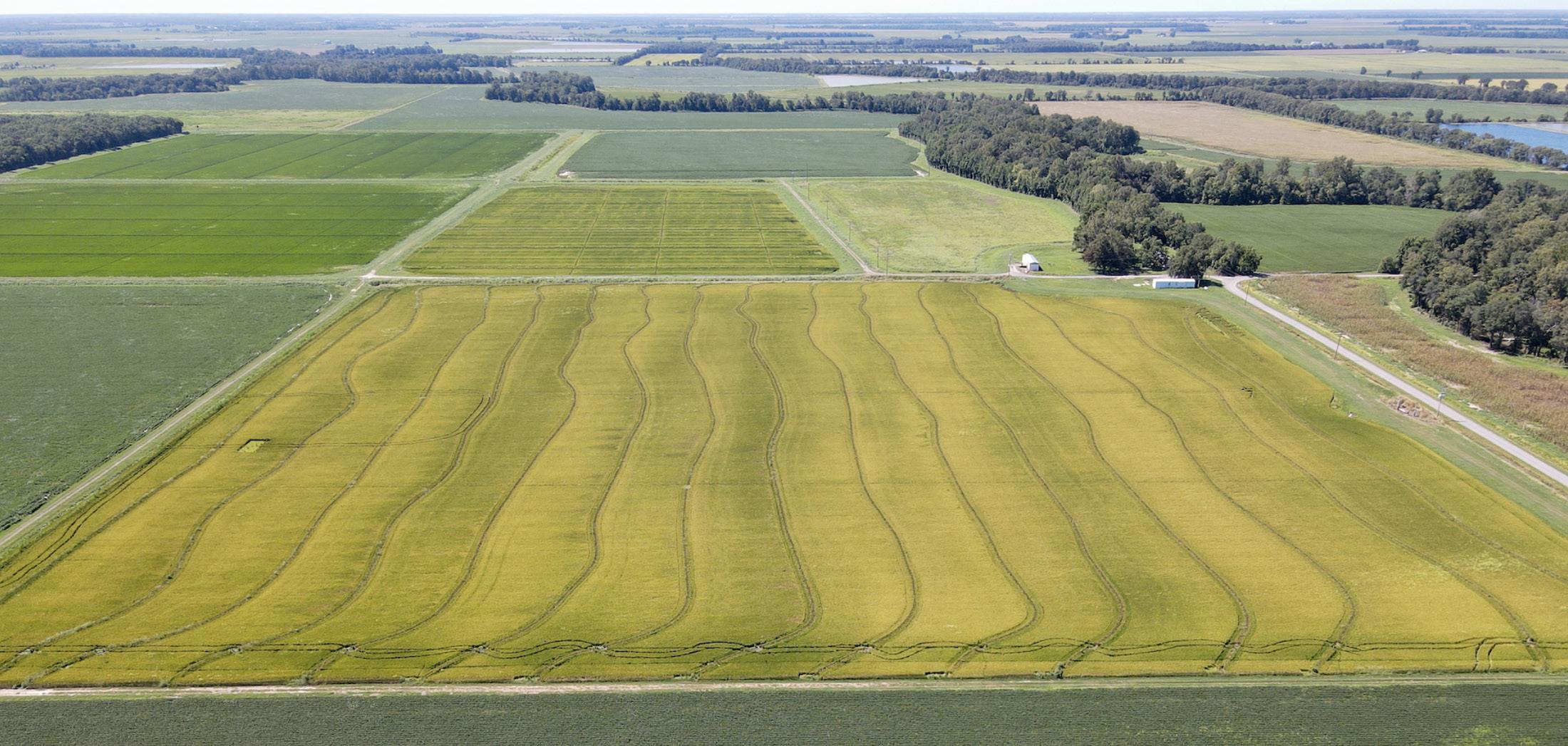
By Mark Carter
hough the term is fashionable these days around the water cooler when co-workers share their streaming preferences, “land man” is not a moniker with which Gar Lile identifies.
Lile thinks of himself and his team at Little Rock’s Lile Real Estate more as investment advisors who deal in tracts of land as opposed to shares of stock.
“My love and enjoyment of land began with working on farms growing up and through college, but my intrigue with land as a dual investment and recreational vehicle began with investment courses in college and post college, quantifying timber stands while working for a consulting forester, to real property valuations as a state certified general appraiser. I feel like the other members of our firm and I are more of investment advisors and stewards of the land for our clients.”
Since founding Lile Real Estate in 1993, the Pine Bluff native said he has experienced all the highs and lows of business cycles. Mostly, there have been highs. Over the past five years, the firm surpassed $500 million in sales. The firm employs 10, including Lile’s oldest son, Gardner, and has opened additional offices in Monticello, Camden and Oxford, Mississippi.
“I have been very blessed to have an incredible group of people that have assembled to focus on our growth and client performance,” Gar said. “I’m highly biased, but I believe our firm members are the most highly educated, trained and experienced in Arkansas.
Gar is president and principal broker at the firm. In addition to Gardner and Brandon Stafford, each a principal and executive broker, the team includes sales associates
Jeryl Jones, Jim Benham, Trey Morris and Robert Moery; associate brokers Matt Stone and David Stone; and office administrator/property manager Sindy Cruthis.
“All our advisors are college graduates, several with postgraduate studies in specific fields of our industry and postcollege real estate training, and we have more Realtor Land Institute-accredited land consultants than any other firm in the state,” Gar said. “Of our eight advisor/brokers, our total industry years of experience is over 170 years, and Sindy has been with the firm for 28 years.”
Gar said his clients invest for returns — both tangible and otherwise.
“Agricultural grain, row-crop farms and timberland have proven for decades to be excellent investments and a safeharbor stable vehicle for long-term conservative asset placement,” he said. “Many of these properties also serve as a dual-investment vehicle in that you have the income that is derived from the annual crop production, but in many cases, the owners utilize the property for recreational activities, receiving a personal return with family, friends or business relationships — or an additional income stream can be created through leasing these rights out to third parties.”
Gar, who grew up farming, hunting and fishing in Pine Bluff, said Arkansas is a good place to invest in land, and not just in the agricultural Delta, where farmland stretches to the horizon and potential buyers eye land that attracts wintering waterfowl.
“Our state also holds vast areas within the Ouachita and Ozark mountain regions that provide timberland investment opportunities,” he said. “These generally also support
recreational use with magnificent clear mountain creeks and rivers. These areas also appeal to a wide range of people seeking a getaway or ‘off-grid’ environment. At certain times, our political or economic environments can really escalate demand for these areas.”
Gar said doing the necessary prep work leads to connecting investors and families with the right property that meets their goals and objectives. Meeting clients’ expectations can be challenging, he added.
“We really try to look for the pitfalls and prepare for those,” he said. “There are many issues that can arise without research, such as survey lines problems, access, easements, etc. It’s very important for buyers and sellers to be well informed and represented by knowledgeable and experienced advisors.”
Gardner joined the firm in 2014 after graduating from the University of Arkansas in Fayetteville. While a student, he interned for the northwest Arkansas office of Colliers International and earned his real estate license. Gar said his older son chose the family business “despite me encouraging different directions.”
“That was a big asset,” Gar said. “Gardner not only grew up following along in this business; he developed a strong desire during college to pursue it as a career and came in with a real head start. Gardner’s influence on our firm has been unexcelled, and his leadership for me and the rest of our firm has brought us tremendous growth and management efficiencies. It has made me very proud to see him develop in his role. He has become the leader that we all look to.”
Gardner said his interest in joining the firm was hatched in high school, but he always loved the outdoors. After all, he and younger brother, Garrett, grew up hunting with their father and joining him on land-development projects. Gardner knew, though, that he would need to pay his dues before joining the family business.
“Gar told me going into college that I could not have the chance to come in with the firm until I worked somewhere else for a few years,” he said. “Whether it was by design or not, I do not know, but that pushed me to work hard in college. I interned with Colliers International in their Bentonville office, and just before starting my senior year, Gar said that I would be able to join the firm after graduation, which was a pleasant surprise. It has been a great 10 years. It has been a blessing that has only strengthened a strong relationship, but it does require patience on both sides, as we spend a lot of time together between work and family time.”
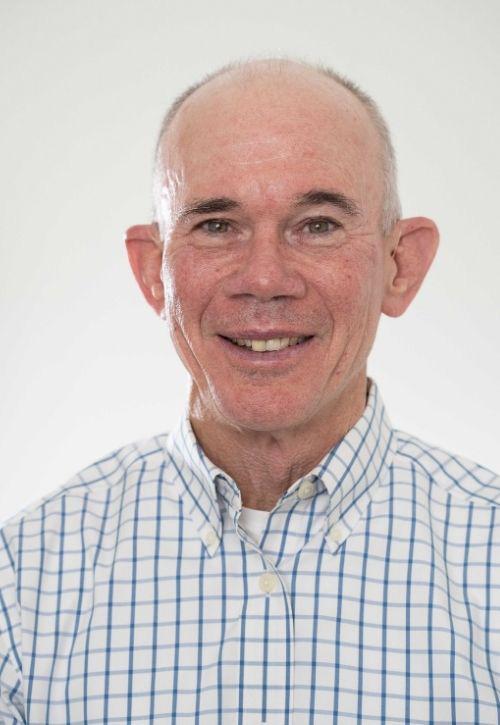
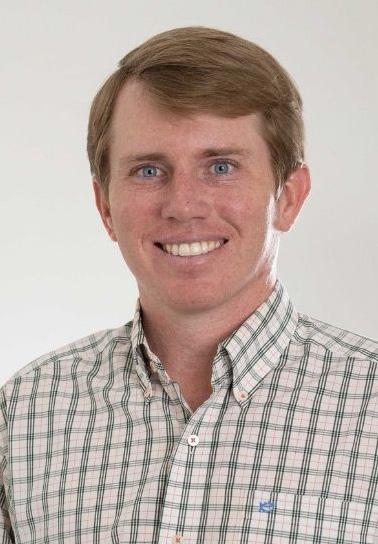
I have been very blessed to have an incredible group of people that have assembled to focus on our growth and client performance. I’m highly biased, but I believe our firm members are the most highly educated, trained and experienced in Arkansas.
— Gar Lile Lile Real Estate
Gar’s work time is split evenly between the office and the field, and much of that office time is spent on the family farm near Swan Lake in Jefferson County. He said land will always represent a valuable asset.
“A lot of people love it as an investment vehicle,” he said. “It’s a stable boat in the storm.”

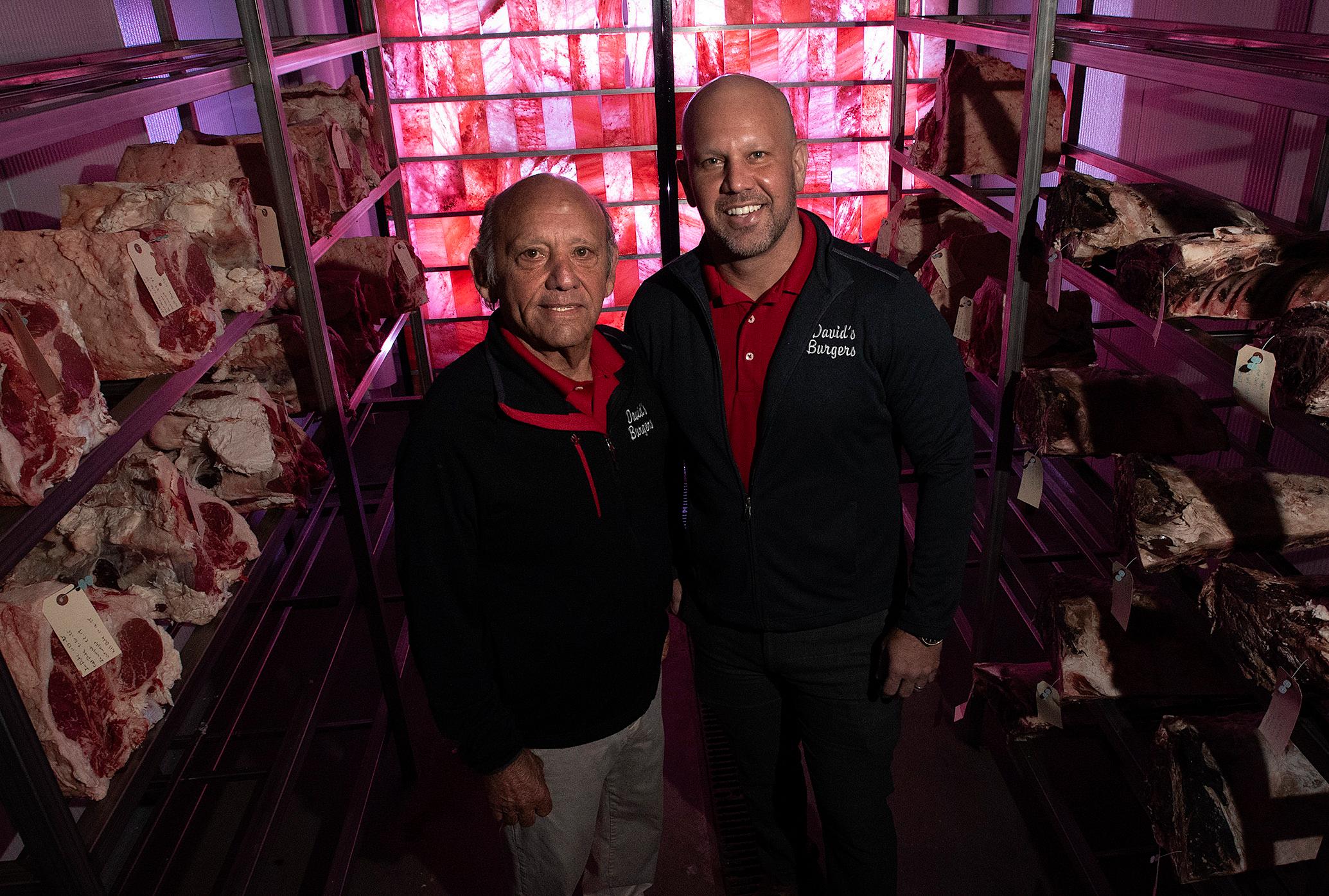
David’s Burgers looks to close processing loop with NLR project from to
By Dwain Hebda
t 10 a.m., a few thousand burgers await in North Little Rock, trays and trays of bright red portions soon to be seasoned, seared and served to order. It is an impressive sight, the kind that would make any American carnivore drool, even with lunch a couple hours away.
Welcome to the central processing center for David’s Burgers, the Arkansas-born burger chain that stretches through the central and north central communities of the Natural State. Every morsel of the restaurant’s award-winning meat is fresh ground at the facility, carved on-site from beef quarters and trucked directly to the restaurants.
In fact, nearly everything that goes between the buns is processed there, too, untold quantities of fresh vegetables and sauces prepped, packaged and put on trucks bound for one of David’s Burgers’ 10 outlets in central Arkansas and Searcy. Only the potatoes for the chain’s famous fresh-cut fries skip the processing facility and are delivered directly to stores.
A tour through the roughly 8,000-square-foot processing facility perched at the end of a quiet manufacturing park sandwiched between Interstate 40 and the railroad tracks reveals a series of spaces. Meat is received from a contract slaughterhouse in Searcy, hung on hooks and moved around for expert apportionment, while vegetables are received by truckload for processing.
The quantities are astounding — about 15,000 pounds of fresh ground beef produced in an average week. In addition, the company’s meat cutters reduce the U.S. Department of Agriculture Choice-graded chuck beef quarters into steaks and roasts supplying the company’s latest venture, David’s Premium Beef, which leadership sees as the next chapter in the company’s success story.
David Bubbus loves what he sees throughout the facility and said it has been a dream of his ever since he took his family’s Russellville butchering roots into the restaurant business almost 60 years ago. That was long before David’s Burgers came along, which he launched with his son, David “Alan” Bubbus Jr., in Conway in 2010.
More than one man’s dream, however, the facility also represents a unique strategy for closing the company’s supply chain, a bold step for an enterprise the size of David’s Burgers but one that came into sharp focus during the COVID-19 pandemic. Almost all of the nation’s beef supply, 80 percent, is processed by what the Bubbuses call the Big Four — Cargill, National Beef, JBS Foods and Arkansas-based Tyson Foods.
“The big push for this started with COVID-19, when beef prices were out of sight,” Alan said. “The food

Patties for all David’s Burgers locations are ground fresh in North Little Rock, and the chain has more plans in the works.
supply chain, it’s not good. It’s so concentrated, it’s so centralized that if something happens and they have to close these beef plants down, it messes up your whole business. You could go from making a 6 or 8 or 10 percent profit to losing money real quick with the way the supply chain is based.
“For that reason, I didn’t want to build our business to where it relied upon the beef industry but wanted to have a more sustainable, decentralized food source. With that, it became an opportunity to introduce a great level of quality and care, as well as gave us the opportunity to sell steaks, which Dad got real excited about.”
David said relying on the Big Four not only opened the company to supply issues but quality issues, as well. Grinding its own hamburger helps management control freshness and also allows it to calibrate the grind to the desired coarseness that gives David’s Burgers a signature flavor and texture.

“It’s really a commitment to quality. It’s a commitment to really taking pride in our business, taking pride in our brand,” he said. “We’re not out for the quickest buck; we really want to have a product that we can be proud of and have a company that we can be proud to have our name on. It’s been a unique opportunity to be able to pursue all of those goals.”
Everywhere one looks in the processing facility, one finds something interesting to watch and take in. In the vegetable room, five women turn produce into toppings with amazing speed, tomatoes and lettuce and onions sliced to exact proportions. They barely look up except to chuckle as the onions’ lachrymatory factor hammers an unsuspecting visitor’s unconditioned eyes.
At another station, a worker reduces a beef quarter to its components with smooth, precise cuts. Waste, of meat or movement, is almost nonexistent as the hulking quarter disappears into neat stacks ready for the next station.
For some of the steaks, that next stop is the aging room, arguably the most fascinating part of the entire facility. Temperature and humidity are precisely controlled, and the air is conditioned by a wall of pink Himalayan sea salt plates as it circulates around all sides of the steaks aging on racks for 21 days. During the aging process, beneficial mold starts to work on the beef molecules to boost tenderness and intensify flavors, not unlike the good mold that gives blue cheese


its signature taste profile.
Prized by steak enthusiasts and sold at a premium in better steakhouses coast to coast, the Bubbuses envision David’s Premium Beef as a way for the average joe to get the same dry-aged experience for the backyard grill. In addition to fresh meat packages aimed at budgetconscious families, the luxury meat runs the gamut from about $50 for a 15- to 17-ounce New York bone-in strip
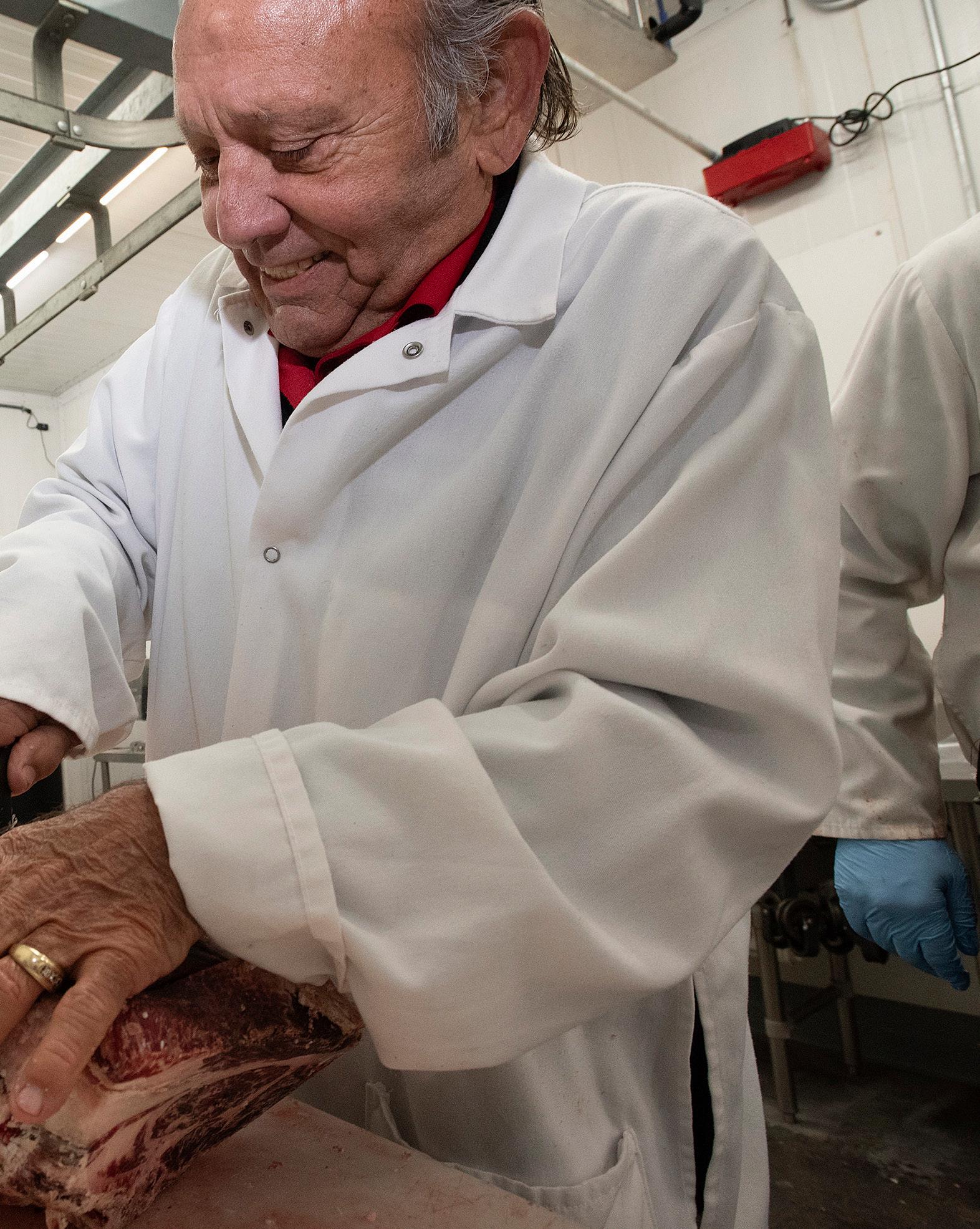
steak up to a $90 bone-in cowboy steak weighing 24 to 26 ounces.
The company buys its beef from a rancher in Texas and currently goes through enough protein to run 20 animals per week through the Searcy slaughterhouse, the last portion of processing the company looks to bring in-house. A permit request for building a slaughter facility immediately adjacent to the existing processing plant is currently under review by the North Little Rock Planning Commission.
The proposal, filed in 2024, has generated concern from neighbors over potential smell and environmental considerations such a facility might bring, gashing local property values, a worry David dismisses.
“The people who have objected to what we’re doing or what we’re trying to do with the slaughterhouse here, I think there’s confusion over what it is,” he said. “It’s not a feedlot; the cows aren’t standing around here in their own poo for 120 days to finish out. They’ll only be here a day or two, and we’re only talking about slaughtering about five animals per day.”
However that permit pans out, the company has already bucked many of the accepted rules that smaller restaurant chains are supposed to follow insofar as sourcing ingredients from the big boys.
It is not the first time David’s Burgers has shown its independent streak, even though father and son have not always been in lockstep at the germination of every idea. Take, for instance, the restaurant’s employees roaming the dining room with huge bowls of fresh French fries for the asking and then coming around with free ice cream samples for dessert.
“I remember when we started this thing and Dad wanted to do the lobby fries, I argued with him,” Alan said. “I said, ‘People are going to come in, and they’re going to get an a la carte burger. They’re going to steal a Coke, they’re going to get a water, and then they’re going to get fries for free. We’re going to go out of business because nobody’s doing this. He said, ‘Don’t worry about it. You may have 1 percent of the people that do that, but people really want a relationship with their restaurateur. They don’t want to just take advantage of them.’
“That’s also fed into our history of our pricing. When we started this business in 2010, you could get a No. 1 combo — burger, fry and a drink — for $7.99. In most of our stores today, you can get that same combo, after all this inflation 14 years later, you can get it for $8.99. That is really due to the fact that we’ve grown and we’ve been able to use this facility to buy in bulk, process it and pass all the savings onto the customer.”
Such moves, along with the quality of the food and a level of customer service almost unheard of in quick-service restaurants, have paid off with intense customer loyalty, illustrated vividly during the pandemic. Where many restaurants struggled to attract enough customers to stay open during lockdown, David’s Burgers’ lines stretched into the parking lot day after day.
That raving loyalty is what has kept new stores coming online, two more of which are in the works at present, and allowed David’s Premium Meats to gain steam, both ventures supported by the nondescript yet vital facility in North Little Rock. In return, the Bubbus family looks to continue its legacy of creating happy customers while providing career opportunities for the company’s 500 employees.
“Dad has really been the architect for the entire thing,” Alan said. “I was just smart enough to know that he had a good idea and see it and say, ‘Hey, we need to run with this,’ and then figure out ways to run it more efficiently. You know, my background really was in banking and real estate; all of the restaurant expertise came from Dad.”
“Well, really, the restaurant business is more about service than it is food,” David said. “We get hundreds and hundreds of comment cards — a lot of them online, a lot of them leave the comment card on the table — and 75 percent of the comment cards are talking about how they appreciate the service.
“It’s always been my goal to make people feel good when they come in. I’ve always tried to keep a restaurant simple enough where it could be done consistently, a few items that you can do well and speedy and put out a quality product at a good price. We have really worked hard to have a good name in the community.”
By Mark Carter

Finishing touches on the Arlington 4.0 are still to come, but the 11-story model of Spanish colonial revival architecture in downtown Hot Springs is once again looking the part of hospitality crown jewel.
The Arlington Resort Hotel & Spa, Arkansas’ most iconic hotel — and with almost 500 rooms, the state’s largest — is rounding into its previous form as renovation and restoration work nears completion. A $30 million renovation was started in 2023 by owner Sky Capital Group of San Antonio, which bought the iconic property for a bargain $7 million from the Monty Scott family but had to delay plans to refurbish because of the COVID-19 outbreak.
The hotel, which has remained open for business throughout the process, had begun to show its age. Some much needed TLC is bringing the Arlington back to its former glory, to days in the roaring ʼ20s when it served as home away from home to Al Capone. When in Spa City, which he visited often, the infamous gangster would rent out the entire fourth floor for his entourage, and he always stayed in the same room — 443.
The current iteration of the hotel celebrated 100 years in 2024, when the version Arkansans have come to know was completed. The hotel opened in 1875 as a three-story wooden structure at the north end of Bathhouse Row, across Fountain Street from where it sits today. It was the area’s first true “luxury” hotel. Rebuilt in red brick in 1893, the second iteration introduced the iconic corner towers, but a fire burned it to the ground in 1923.
The hotel was rebuilt with more rooms, amenities and pizzazz and officially reopened in 1924 at its current spot overlooking Central Avenue and the national park for which Hot Springs is named.
The hotel had already served as the epicenter of the Hot Springs social scene, but the third iteration of the Arlington
set the bar even higher. In addition to Capone, some of the hotel’s notable guests have included presidents Theodore Roosevelt, Franklin D. Roosevelt, Harry Truman, George H.W. Bush and, of course, hometown boy Bill Clinton, as well as the likes of Babe Ruth, Tony Bennett, Yoko Ono and Barbra Streisand.
Several attractions are tied directly into the identity of Hot Springs — the national park, the lakes, Oaklawn — and the Arlington is one of them.
“Sitting at the north end of historic Bathhouse Row, the Arlington Hotel has dominated the northern skyline of downtown Hot Springs for 100 years,” said Steve Arrison, CEO of Visit Hot Springs and the Spa City’s No. 1 cheerleader. “In addition to being a remarkable landmark, it has been an important part of Hot Springs’ community and business life for that entire time, hosting the city’s social and cultural events and serving millions of guests, from the most powerful to the infamous to countless visitors from all over the world. We hope the Arlington will enjoy another century of iconic prominence in Hot Springs as it completes its restoration.”
As far back as 1892, the hotel was recognized nationally for its splendor. The second iteration of the Arlington was described in famed librarian/historian Charles Cutter’s 1892 Guide Book as “the most elegant and complete hotel in America.” This red-brick version featured a large veranda, rotunda, arcades running the length of the hotel, a ballroom and an ornamental oak staircase encircling a glass dome.
The 1924 version introduced the iconic Crystal Ballroom, the Venetian Dining Room and adjoining Music Room for orchestra performances, and the Arlington’s grand lobby and lobby bar, the latter of which has been recognized by national publications. The building included an in-house bathhouse with thermal waters from the park piped in. All those amenities are still in use, as is the original bath house elevator, which is lined with beveled glass and shining brass and still manually operated.
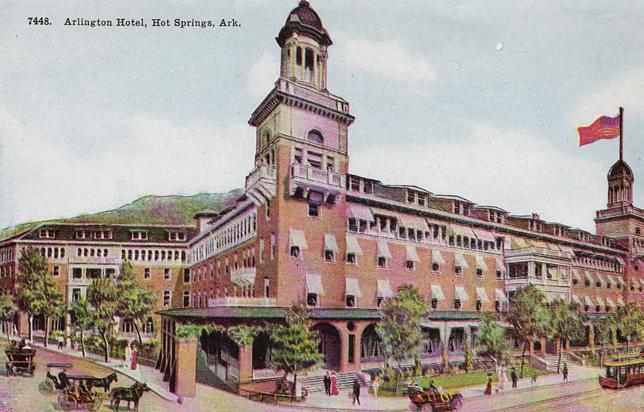





The team at Sky Capital has been emphatic about its plans to honor the history of the hotel while maintaining its standing among the state’s most iconic attractions.
“For us, this is a time to reflect on the history of this incredible place and honor all that it has been and done over the last 100 years but also a time to look to the future on all we want to accomplish in the next 100 years,” Scott Larsen, president of operations at Sky Capital, told Arkansas.com last year. “This is a celebration of both everything that has happened here and all that is yet to come, like the completion of the restoration, new product offerings and even better experiences for all our guests.”
Sky Capital partnered with Arkansas Federal Credit Union to fund the restoration. Al Rajabi, CEO of Sky Capital, told Arkansas Money & Politics last year that the fully restored Arlington would “be the most luxurious property that Arkansas has ever seen.”
“It’s amazing the amount of craftsmanship,” he said. “The hotel was done over the top for its day, and they had some great artists and craftsmen, so I’m honored to be carrying on the tradition.”
The Arlington continues to stand watch over Bathhouse Row in downtown Hot Springs, and the current restoration should ensure it can do so for another 100 years or more.
By Eric Bolin
Dallas’ P.J. Washington has to be feeling good these days. Not only did his Mavericks just pick up a 6-foot-10 superstar in Anthony Davis, who will make Washington’s life easier in the paint, his college coach John Calipari picked up his biggest win of the season so far on Feb. 1 in Lexington.
Washington’s newness to the world of Arkansas Razorbacks fandom very much struck a nerve among Kentucky basketball fans, who caterwauled about his supposed turn-coating when a photo of him wearing a Hogs shirt surfaced a few months ago in Fayetteville. He was simply wearing the shirt in honor of his old coach, who has pitched his tent in northwest Arkansas.
Over the weekend, Reed Sheppard did it again. Oops. The former Kentucky basketball star rocked the same exact shirt before his Houston Rockets played the Brooklyn Nets.
If that was not bad enough for Kentucky fans, the Arkansas sports department used that same photo in their own chest-beating after Arkansas’ 10-point road win over the No. 12 Wildcats.
The Hogs-Cats rivalry is indeed alive and well.
Had Kentucky beaten Arkansas on Saturday, mouthing aplenty would have come from UK’s faithful. They were already more than happy to badmouth their former coach after his surprising exit out of Lexington last spring. Many felt dissatisfied with the way the Wildcats had played in recent years under Cal’s watch, but with the Hall of Famer besting his former team with an underachieving Arkansas one, Big Blue Nation appears livid.
The Razorbacks’ season exists as a disappointment even after the UK victory. Arkansas is hardly sniffing an NCAA Tournament bid at the midway point of Southeastern Conference play, but the hiring of Calipari was never all about what the Hogs could accomplish in year 1. It was foolish to think Arkansas automatically posed itself as a national championship contender with a roster built entirely with newcomers (save lone holdover Trevon Brazile). What Calipari brings to the Razorbacks is an air of legitimacy.
So do the guys like Washington and Sheppard, who are, in part swapping their blue and white for red and white. Expect Big Blue Nation to lose it when Davis joins them soon enough.
Davis’ new Dallas digs mean he is but a one-hour flight away from visiting his beloved college coach. Combine that with the fact his new teammates include Washington and Arkansas native Daniel Gafford, a Razorback star under Mike Anderson, and the safe bet here is that he will visit Fayetteville with one or both of them at some point.
That may even happen this summer after the Mavericks win the NBA title this year (shush — let me dream) now that they
have sent the defensive liability that is Luka Dončić packing for Los Angeles. If Washington, who is a good player but not a superstar, drew such ire from Kentucky after his visit to campus last year, imagine what wrath Davis will incur from those who formerly loved him.

All of it is silly, of course — feeling so intense about a team that one would demean and degrade another for so-called abandonment. Sane humans root more for people than teams. Sheppard put it best when he was asked about his shirt choice.
“A lot of people are not happy, but that’s my coach,” he said.
More importantly, he said he thought it would be funny. It is funny — funny in a sad way that anyone cares. Sheppard may now have more friends in Fayetteville now than Lexington, considering Calipari brought nearly his entire coaching staff with him, not to mention Sheppard’s former teammates in Adou Thiero, Zvonimir Ivisic and D.J. Wagner. Why should the Rockets guard not root for Arkansas aside for when it plays Kentucky? Because of the one year he spent playing in Rupp Arena? Because his dad played there? Nonsense.
Kentucky basketball folks are seething, but don’t worry. Before long, Razorback fans will again be back at it for some reason too. High emotions create drama and drama sparks intensity in rivalries. Those are good for the game. Big Blue Nation sure had its moment in the sun for a good decade-plus under Calipari. For a couple months, it hoped that the drop off to Mark Pope would not be too steep. Maybe Kentucky bounces back to keep its elite status, but the one game Arkansas needed to win, it won.
It is only right that the swapping out of blue for red and a “W” for “L” on its home court took Kentucky down a couple notches again.
This column originally appeared at bestofarkansassports.com.


AADA represents almost 270 new car and truck dealers in Arkansas operating in large and small communities across the state.
Arkansas dealers generate good-paying, local jobs with benefits and opportunities for advancement and professional development.
New car and truck dealerships in Arkansas are a $12.5 billion per year business directly employing more than 12,500 people across the State and supporting another 10,500 jobs.
Dealers are one of the most charitable businesses in the state donating vehicles and contributing millions to local charities. AADA is leading this effort with a recently announced partnership with the Arkansas Hunger Relief Alliance.
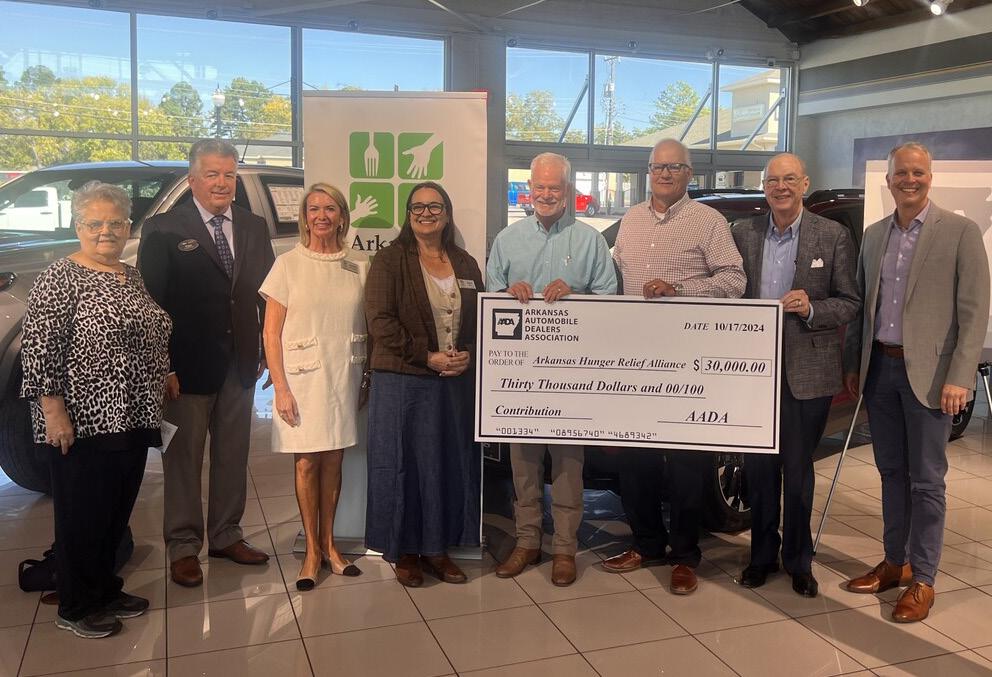
According to the American Heart Association, 80% of heart disease and stroke events are preventable through lifestyle changes and proper medical care, including regular check-ups and managing conditions like hypertension and diabetes


At Conway Regional, our highly-skilled group of interventional cardiologists and emergency department physicians have been recognized as some of the best providers in interventional cardiology care and heart attack treatment in the state.



To schedule an appointment with Conway Regional Cardiovascular Clinic, call 501-358-6905 or visit ConwayRegional.org to learn more. All Your Heart Needs, All in One Place
Left to Right: Ronak Soni, MD, Don Steely, MD, Rimsha Hasan, MD, and Yalcin Hacioglu, MD of Conway Regional Cardiovascular Clinic